The Effect of Over Reliance on Natural Resources on the Nigerian Economic Well-being
VerifiedAdded on 2023/06/04
|63
|15612
|328
AI Summary
This research analyses the impact of over reliance on natural resources, especially oil and gas, on the economic well-being of Nigeria. It examines the positive and negative influence of natural resources on the economic well-being of people in Nigeria. The study explores the reasons behind over exploitation of natural resources, the economic importance of natural resources, and the role of natural resources in economies across the globe. It also examines the economic condition of Nigeria and the impact of natural resources on inflation, unemployment, and overall development of the country.
Contribute Materials
Your contribution can guide someone’s learning journey. Share your
documents today.
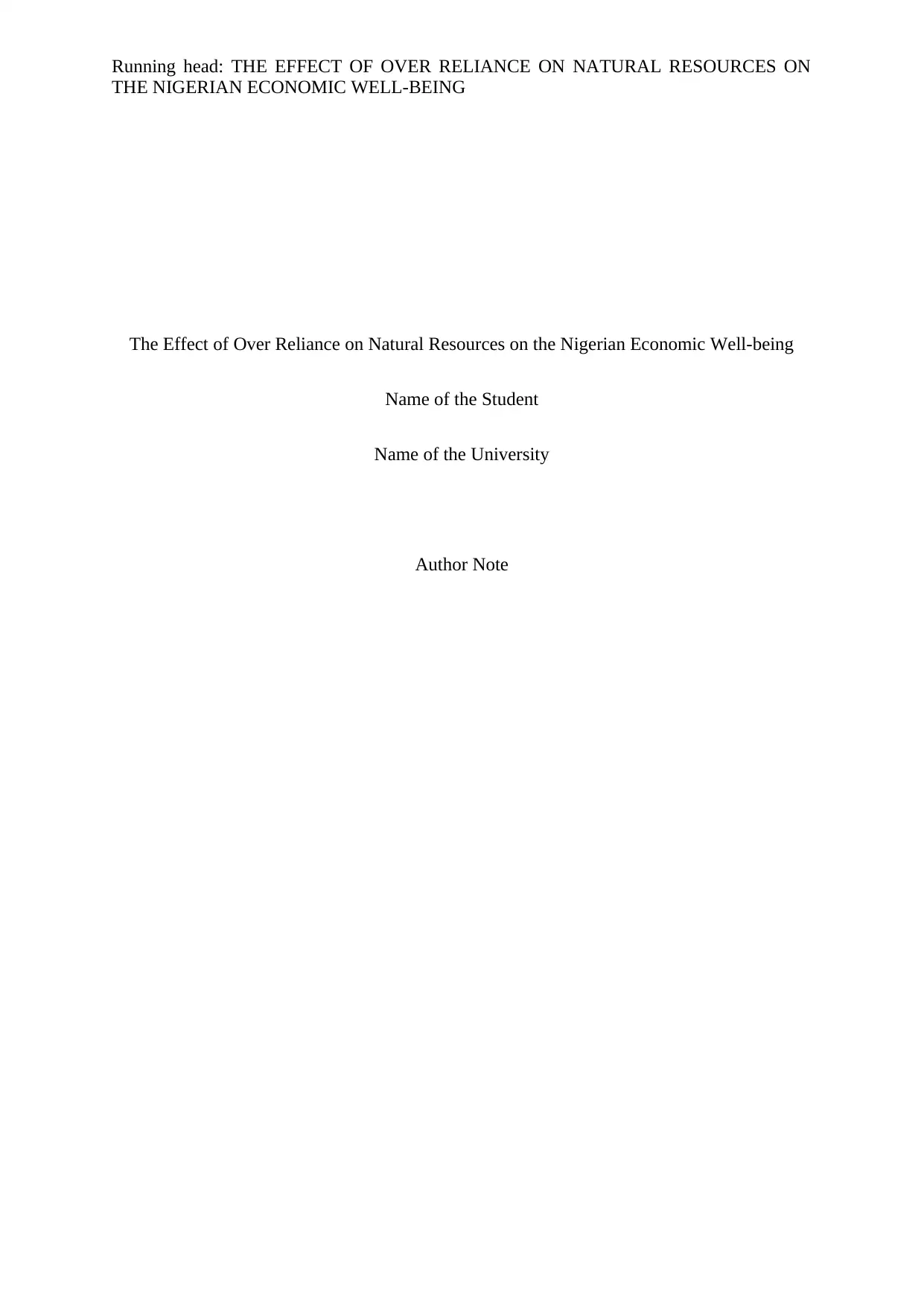
Running head: THE EFFECT OF OVER RELIANCE ON NATURAL RESOURCES ON
THE NIGERIAN ECONOMIC WELL-BEING
The Effect of Over Reliance on Natural Resources on the Nigerian Economic Well-being
Name of the Student
Name of the University
Author Note
THE NIGERIAN ECONOMIC WELL-BEING
The Effect of Over Reliance on Natural Resources on the Nigerian Economic Well-being
Name of the Student
Name of the University
Author Note
Secure Best Marks with AI Grader
Need help grading? Try our AI Grader for instant feedback on your assignments.
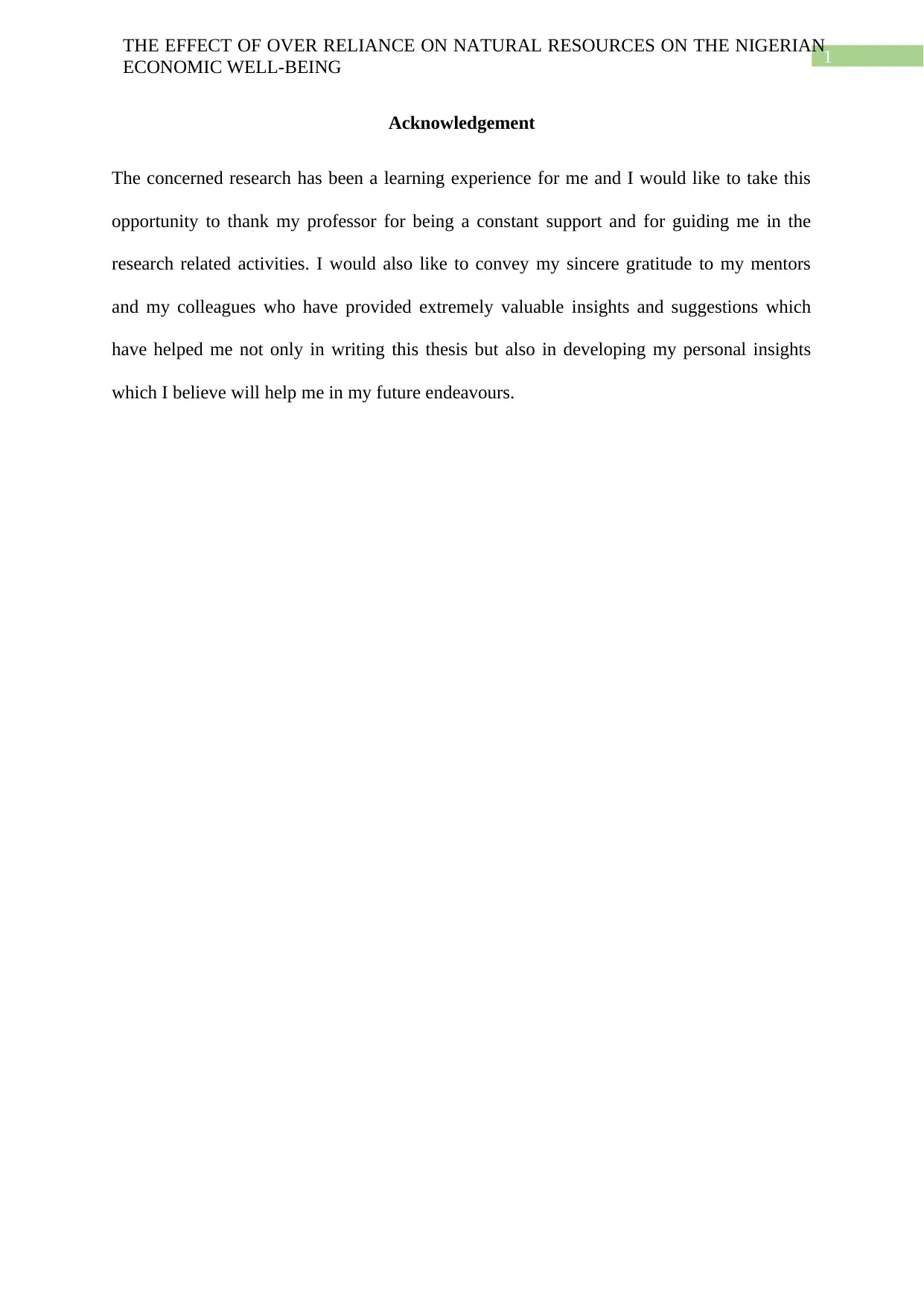
1
THE EFFECT OF OVER RELIANCE ON NATURAL RESOURCES ON THE NIGERIAN
ECONOMIC WELL-BEING
Acknowledgement
The concerned research has been a learning experience for me and I would like to take this
opportunity to thank my professor for being a constant support and for guiding me in the
research related activities. I would also like to convey my sincere gratitude to my mentors
and my colleagues who have provided extremely valuable insights and suggestions which
have helped me not only in writing this thesis but also in developing my personal insights
which I believe will help me in my future endeavours.
THE EFFECT OF OVER RELIANCE ON NATURAL RESOURCES ON THE NIGERIAN
ECONOMIC WELL-BEING
Acknowledgement
The concerned research has been a learning experience for me and I would like to take this
opportunity to thank my professor for being a constant support and for guiding me in the
research related activities. I would also like to convey my sincere gratitude to my mentors
and my colleagues who have provided extremely valuable insights and suggestions which
have helped me not only in writing this thesis but also in developing my personal insights
which I believe will help me in my future endeavours.
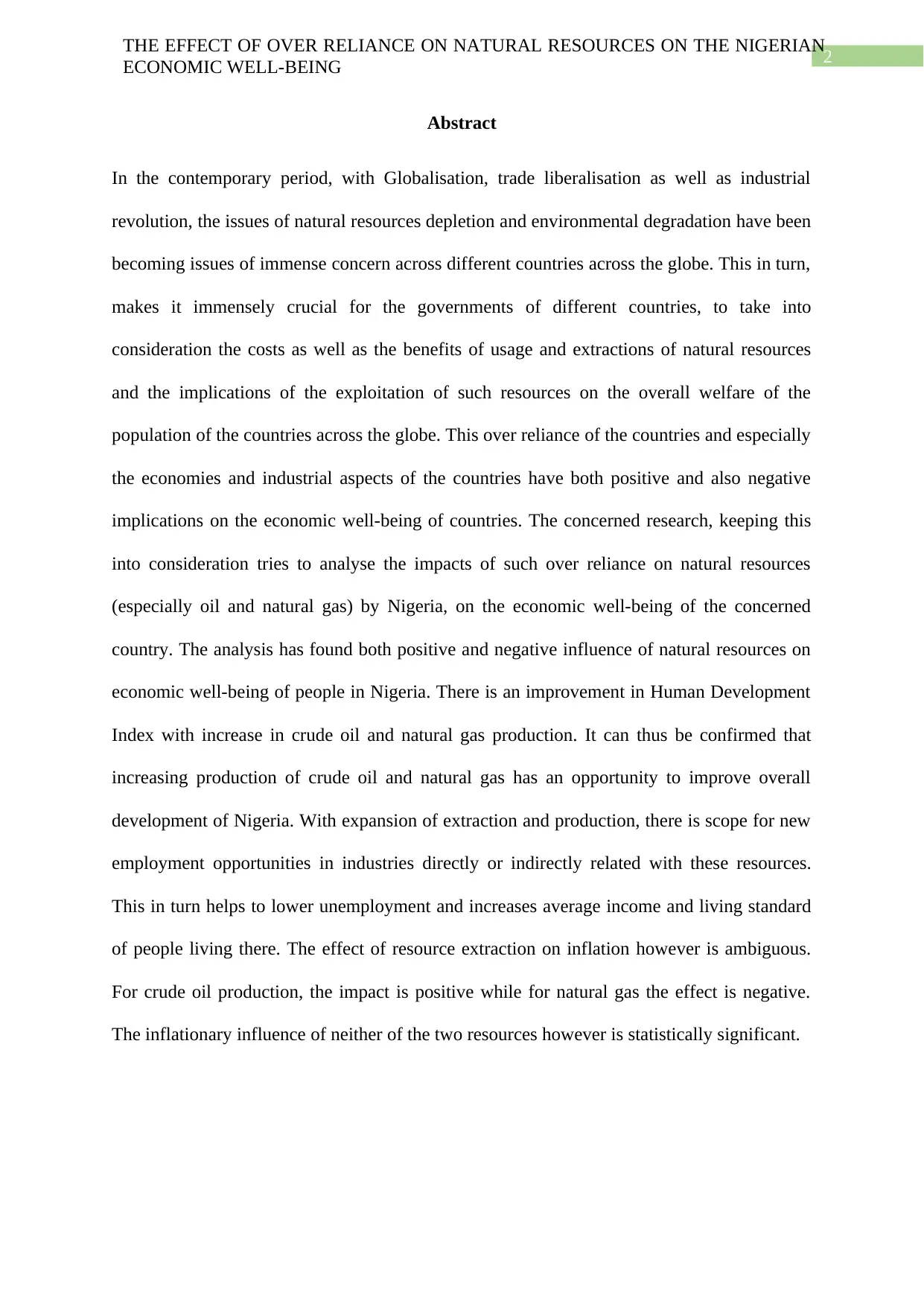
2
THE EFFECT OF OVER RELIANCE ON NATURAL RESOURCES ON THE NIGERIAN
ECONOMIC WELL-BEING
Abstract
In the contemporary period, with Globalisation, trade liberalisation as well as industrial
revolution, the issues of natural resources depletion and environmental degradation have been
becoming issues of immense concern across different countries across the globe. This in turn,
makes it immensely crucial for the governments of different countries, to take into
consideration the costs as well as the benefits of usage and extractions of natural resources
and the implications of the exploitation of such resources on the overall welfare of the
population of the countries across the globe. This over reliance of the countries and especially
the economies and industrial aspects of the countries have both positive and also negative
implications on the economic well-being of countries. The concerned research, keeping this
into consideration tries to analyse the impacts of such over reliance on natural resources
(especially oil and natural gas) by Nigeria, on the economic well-being of the concerned
country. The analysis has found both positive and negative influence of natural resources on
economic well-being of people in Nigeria. There is an improvement in Human Development
Index with increase in crude oil and natural gas production. It can thus be confirmed that
increasing production of crude oil and natural gas has an opportunity to improve overall
development of Nigeria. With expansion of extraction and production, there is scope for new
employment opportunities in industries directly or indirectly related with these resources.
This in turn helps to lower unemployment and increases average income and living standard
of people living there. The effect of resource extraction on inflation however is ambiguous.
For crude oil production, the impact is positive while for natural gas the effect is negative.
The inflationary influence of neither of the two resources however is statistically significant.
THE EFFECT OF OVER RELIANCE ON NATURAL RESOURCES ON THE NIGERIAN
ECONOMIC WELL-BEING
Abstract
In the contemporary period, with Globalisation, trade liberalisation as well as industrial
revolution, the issues of natural resources depletion and environmental degradation have been
becoming issues of immense concern across different countries across the globe. This in turn,
makes it immensely crucial for the governments of different countries, to take into
consideration the costs as well as the benefits of usage and extractions of natural resources
and the implications of the exploitation of such resources on the overall welfare of the
population of the countries across the globe. This over reliance of the countries and especially
the economies and industrial aspects of the countries have both positive and also negative
implications on the economic well-being of countries. The concerned research, keeping this
into consideration tries to analyse the impacts of such over reliance on natural resources
(especially oil and natural gas) by Nigeria, on the economic well-being of the concerned
country. The analysis has found both positive and negative influence of natural resources on
economic well-being of people in Nigeria. There is an improvement in Human Development
Index with increase in crude oil and natural gas production. It can thus be confirmed that
increasing production of crude oil and natural gas has an opportunity to improve overall
development of Nigeria. With expansion of extraction and production, there is scope for new
employment opportunities in industries directly or indirectly related with these resources.
This in turn helps to lower unemployment and increases average income and living standard
of people living there. The effect of resource extraction on inflation however is ambiguous.
For crude oil production, the impact is positive while for natural gas the effect is negative.
The inflationary influence of neither of the two resources however is statistically significant.
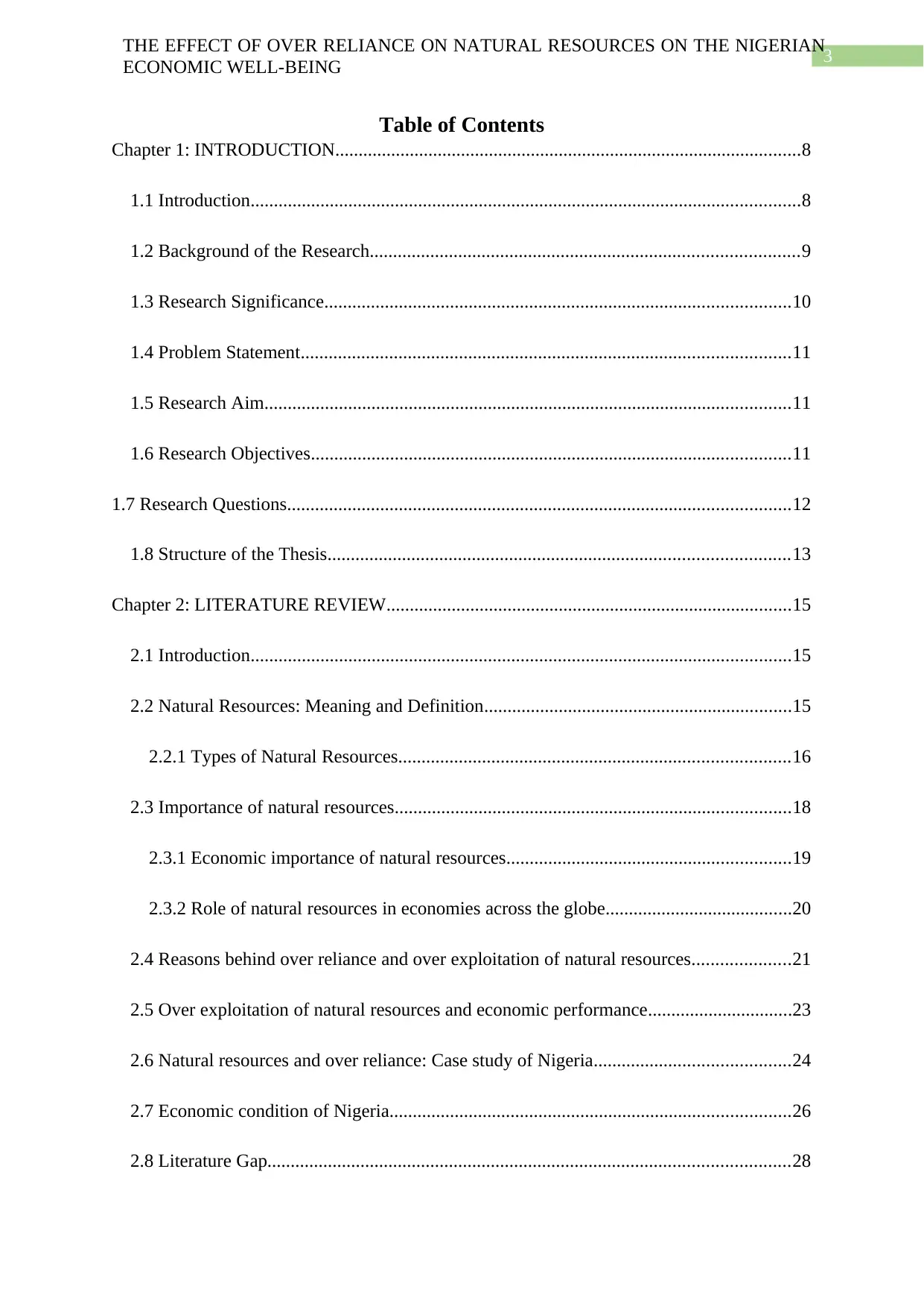
3
THE EFFECT OF OVER RELIANCE ON NATURAL RESOURCES ON THE NIGERIAN
ECONOMIC WELL-BEING
Table of Contents
Chapter 1: INTRODUCTION....................................................................................................8
1.1 Introduction......................................................................................................................8
1.2 Background of the Research............................................................................................9
1.3 Research Significance....................................................................................................10
1.4 Problem Statement.........................................................................................................11
1.5 Research Aim.................................................................................................................11
1.6 Research Objectives.......................................................................................................11
1.7 Research Questions............................................................................................................12
1.8 Structure of the Thesis...................................................................................................13
Chapter 2: LITERATURE REVIEW.......................................................................................15
2.1 Introduction....................................................................................................................15
2.2 Natural Resources: Meaning and Definition..................................................................15
2.2.1 Types of Natural Resources....................................................................................16
2.3 Importance of natural resources.....................................................................................18
2.3.1 Economic importance of natural resources.............................................................19
2.3.2 Role of natural resources in economies across the globe........................................20
2.4 Reasons behind over reliance and over exploitation of natural resources.....................21
2.5 Over exploitation of natural resources and economic performance...............................23
2.6 Natural resources and over reliance: Case study of Nigeria..........................................24
2.7 Economic condition of Nigeria......................................................................................26
2.8 Literature Gap................................................................................................................28
THE EFFECT OF OVER RELIANCE ON NATURAL RESOURCES ON THE NIGERIAN
ECONOMIC WELL-BEING
Table of Contents
Chapter 1: INTRODUCTION....................................................................................................8
1.1 Introduction......................................................................................................................8
1.2 Background of the Research............................................................................................9
1.3 Research Significance....................................................................................................10
1.4 Problem Statement.........................................................................................................11
1.5 Research Aim.................................................................................................................11
1.6 Research Objectives.......................................................................................................11
1.7 Research Questions............................................................................................................12
1.8 Structure of the Thesis...................................................................................................13
Chapter 2: LITERATURE REVIEW.......................................................................................15
2.1 Introduction....................................................................................................................15
2.2 Natural Resources: Meaning and Definition..................................................................15
2.2.1 Types of Natural Resources....................................................................................16
2.3 Importance of natural resources.....................................................................................18
2.3.1 Economic importance of natural resources.............................................................19
2.3.2 Role of natural resources in economies across the globe........................................20
2.4 Reasons behind over reliance and over exploitation of natural resources.....................21
2.5 Over exploitation of natural resources and economic performance...............................23
2.6 Natural resources and over reliance: Case study of Nigeria..........................................24
2.7 Economic condition of Nigeria......................................................................................26
2.8 Literature Gap................................................................................................................28
Secure Best Marks with AI Grader
Need help grading? Try our AI Grader for instant feedback on your assignments.
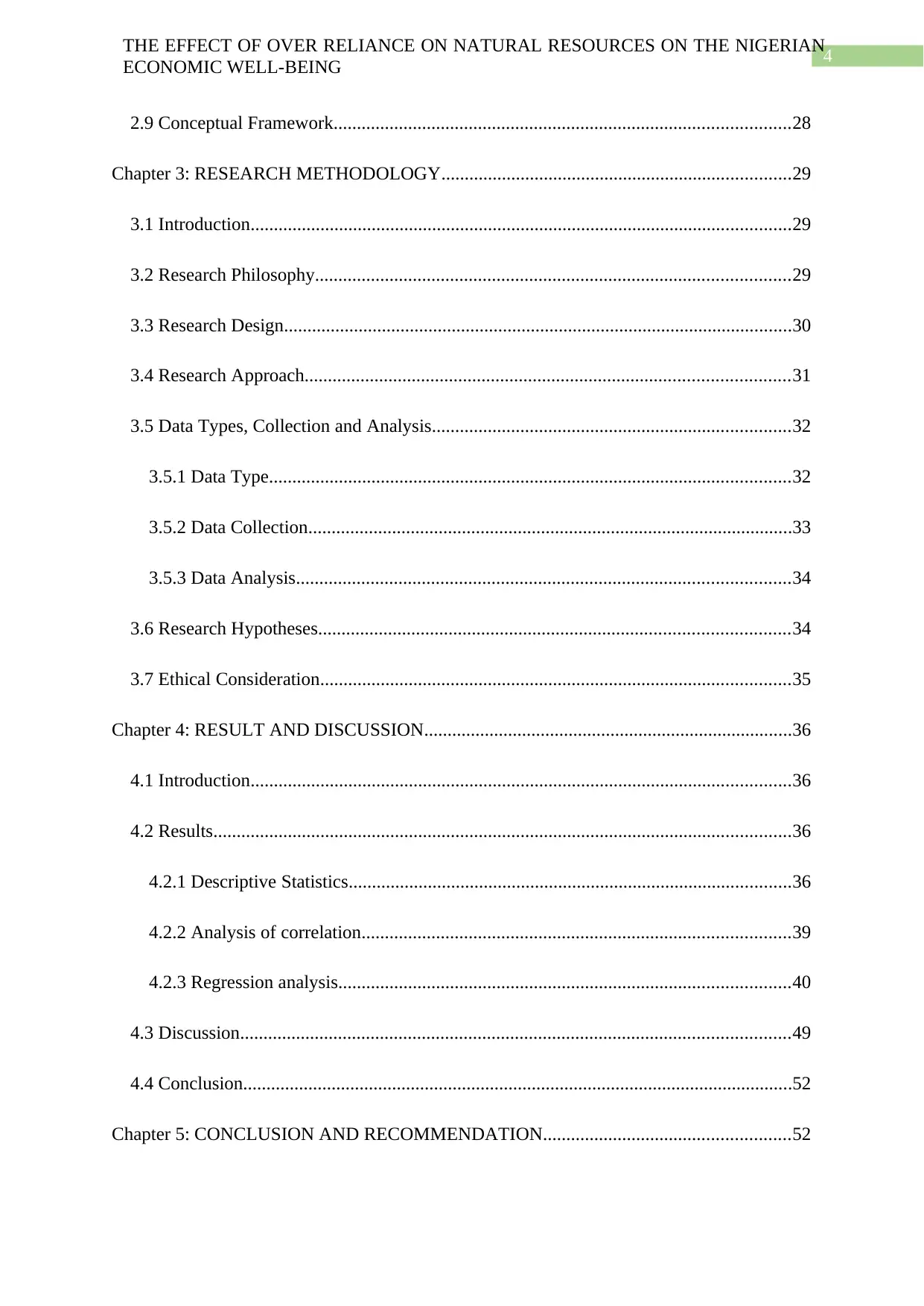
4
THE EFFECT OF OVER RELIANCE ON NATURAL RESOURCES ON THE NIGERIAN
ECONOMIC WELL-BEING
2.9 Conceptual Framework..................................................................................................28
Chapter 3: RESEARCH METHODOLOGY...........................................................................29
3.1 Introduction....................................................................................................................29
3.2 Research Philosophy......................................................................................................29
3.3 Research Design.............................................................................................................30
3.4 Research Approach........................................................................................................31
3.5 Data Types, Collection and Analysis.............................................................................32
3.5.1 Data Type................................................................................................................32
3.5.2 Data Collection........................................................................................................33
3.5.3 Data Analysis..........................................................................................................34
3.6 Research Hypotheses.....................................................................................................34
3.7 Ethical Consideration.....................................................................................................35
Chapter 4: RESULT AND DISCUSSION...............................................................................36
4.1 Introduction....................................................................................................................36
4.2 Results............................................................................................................................36
4.2.1 Descriptive Statistics...............................................................................................36
4.2.2 Analysis of correlation............................................................................................39
4.2.3 Regression analysis.................................................................................................40
4.3 Discussion......................................................................................................................49
4.4 Conclusion......................................................................................................................52
Chapter 5: CONCLUSION AND RECOMMENDATION.....................................................52
THE EFFECT OF OVER RELIANCE ON NATURAL RESOURCES ON THE NIGERIAN
ECONOMIC WELL-BEING
2.9 Conceptual Framework..................................................................................................28
Chapter 3: RESEARCH METHODOLOGY...........................................................................29
3.1 Introduction....................................................................................................................29
3.2 Research Philosophy......................................................................................................29
3.3 Research Design.............................................................................................................30
3.4 Research Approach........................................................................................................31
3.5 Data Types, Collection and Analysis.............................................................................32
3.5.1 Data Type................................................................................................................32
3.5.2 Data Collection........................................................................................................33
3.5.3 Data Analysis..........................................................................................................34
3.6 Research Hypotheses.....................................................................................................34
3.7 Ethical Consideration.....................................................................................................35
Chapter 4: RESULT AND DISCUSSION...............................................................................36
4.1 Introduction....................................................................................................................36
4.2 Results............................................................................................................................36
4.2.1 Descriptive Statistics...............................................................................................36
4.2.2 Analysis of correlation............................................................................................39
4.2.3 Regression analysis.................................................................................................40
4.3 Discussion......................................................................................................................49
4.4 Conclusion......................................................................................................................52
Chapter 5: CONCLUSION AND RECOMMENDATION.....................................................52
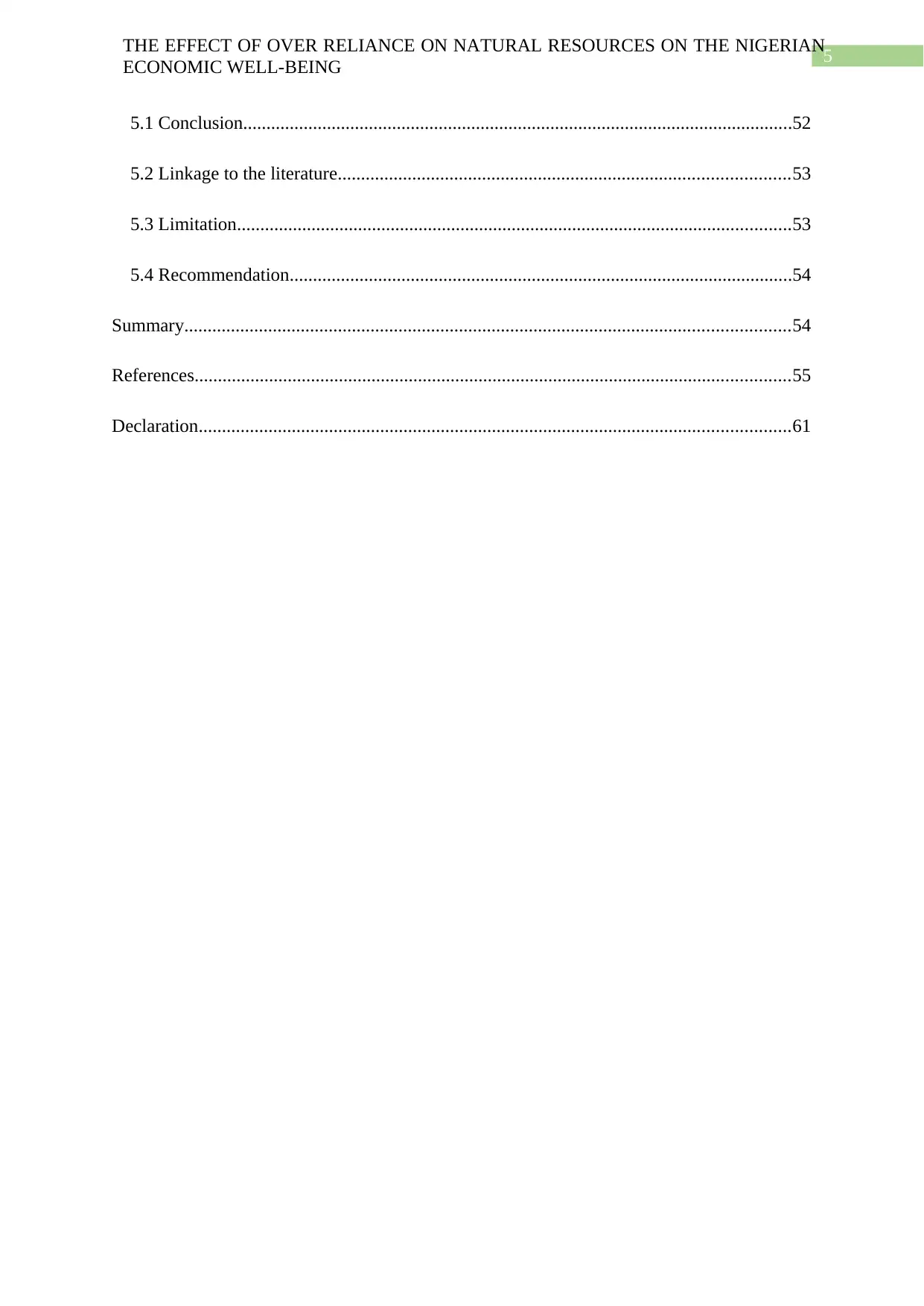
5
THE EFFECT OF OVER RELIANCE ON NATURAL RESOURCES ON THE NIGERIAN
ECONOMIC WELL-BEING
5.1 Conclusion......................................................................................................................52
5.2 Linkage to the literature.................................................................................................53
5.3 Limitation.......................................................................................................................53
5.4 Recommendation............................................................................................................54
Summary..................................................................................................................................54
References................................................................................................................................55
Declaration...............................................................................................................................61
THE EFFECT OF OVER RELIANCE ON NATURAL RESOURCES ON THE NIGERIAN
ECONOMIC WELL-BEING
5.1 Conclusion......................................................................................................................52
5.2 Linkage to the literature.................................................................................................53
5.3 Limitation.......................................................................................................................53
5.4 Recommendation............................................................................................................54
Summary..................................................................................................................................54
References................................................................................................................................55
Declaration...............................................................................................................................61
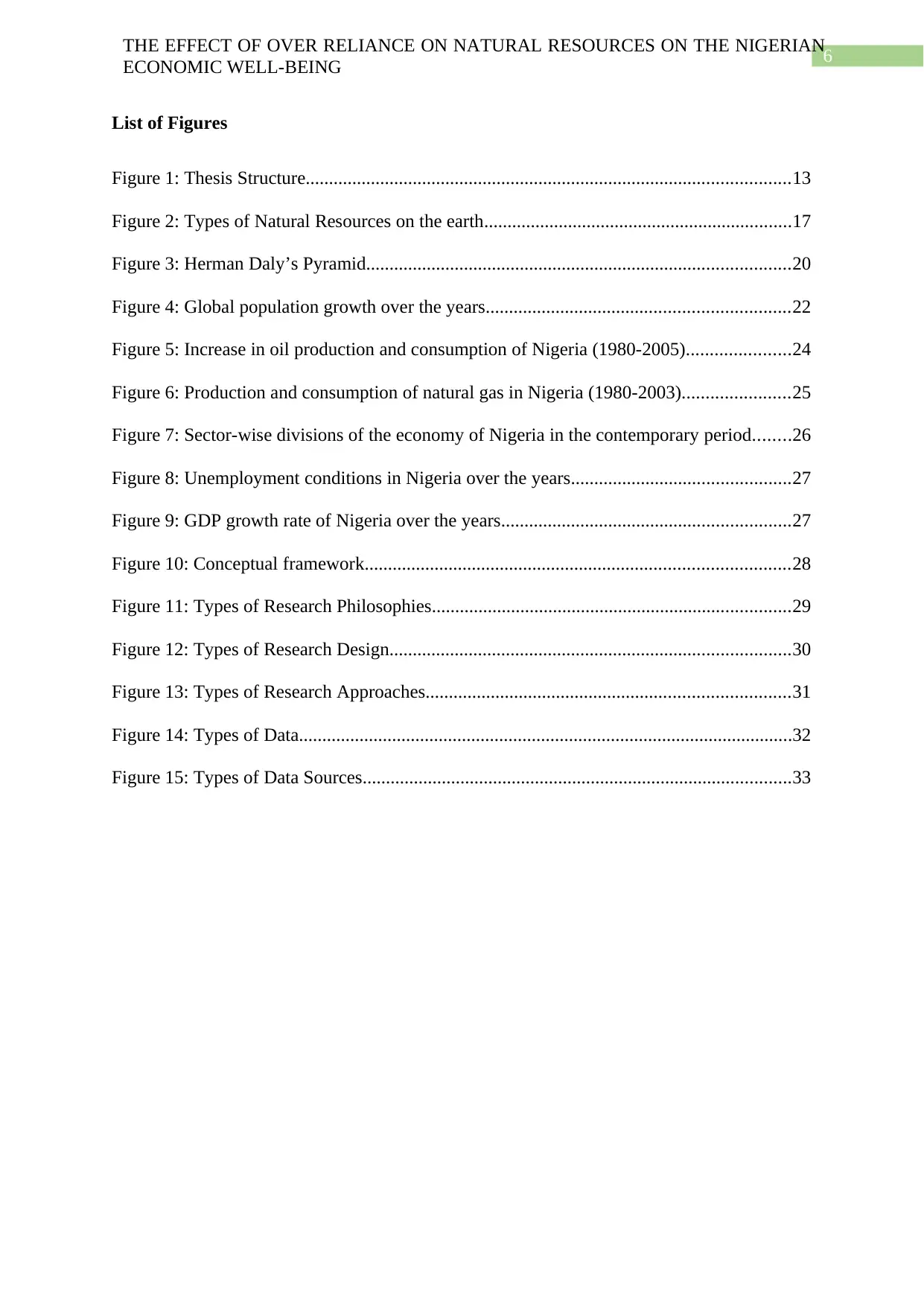
6
THE EFFECT OF OVER RELIANCE ON NATURAL RESOURCES ON THE NIGERIAN
ECONOMIC WELL-BEING
List of Figures
Figure 1: Thesis Structure........................................................................................................13
Figure 2: Types of Natural Resources on the earth..................................................................17
Figure 3: Herman Daly’s Pyramid...........................................................................................20
Figure 4: Global population growth over the years.................................................................22
Figure 5: Increase in oil production and consumption of Nigeria (1980-2005)......................24
Figure 6: Production and consumption of natural gas in Nigeria (1980-2003).......................25
Figure 7: Sector-wise divisions of the economy of Nigeria in the contemporary period........26
Figure 8: Unemployment conditions in Nigeria over the years...............................................27
Figure 9: GDP growth rate of Nigeria over the years..............................................................27
Figure 10: Conceptual framework...........................................................................................28
Figure 11: Types of Research Philosophies.............................................................................29
Figure 12: Types of Research Design......................................................................................30
Figure 13: Types of Research Approaches..............................................................................31
Figure 14: Types of Data..........................................................................................................32
Figure 15: Types of Data Sources............................................................................................33
THE EFFECT OF OVER RELIANCE ON NATURAL RESOURCES ON THE NIGERIAN
ECONOMIC WELL-BEING
List of Figures
Figure 1: Thesis Structure........................................................................................................13
Figure 2: Types of Natural Resources on the earth..................................................................17
Figure 3: Herman Daly’s Pyramid...........................................................................................20
Figure 4: Global population growth over the years.................................................................22
Figure 5: Increase in oil production and consumption of Nigeria (1980-2005)......................24
Figure 6: Production and consumption of natural gas in Nigeria (1980-2003).......................25
Figure 7: Sector-wise divisions of the economy of Nigeria in the contemporary period........26
Figure 8: Unemployment conditions in Nigeria over the years...............................................27
Figure 9: GDP growth rate of Nigeria over the years..............................................................27
Figure 10: Conceptual framework...........................................................................................28
Figure 11: Types of Research Philosophies.............................................................................29
Figure 12: Types of Research Design......................................................................................30
Figure 13: Types of Research Approaches..............................................................................31
Figure 14: Types of Data..........................................................................................................32
Figure 15: Types of Data Sources............................................................................................33
Paraphrase This Document
Need a fresh take? Get an instant paraphrase of this document with our AI Paraphraser
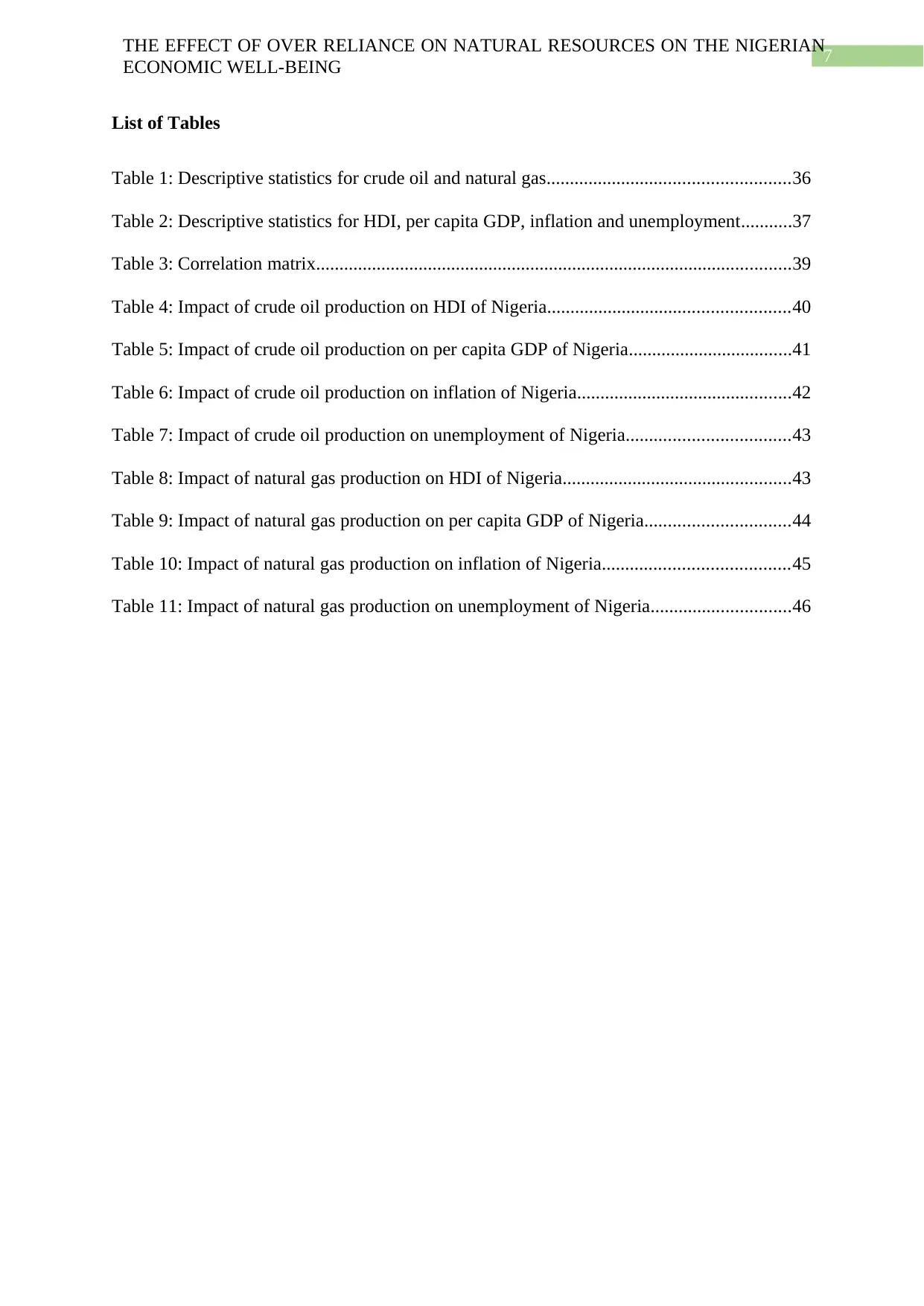
7
THE EFFECT OF OVER RELIANCE ON NATURAL RESOURCES ON THE NIGERIAN
ECONOMIC WELL-BEING
List of Tables
Table 1: Descriptive statistics for crude oil and natural gas....................................................36
Table 2: Descriptive statistics for HDI, per capita GDP, inflation and unemployment...........37
Table 3: Correlation matrix......................................................................................................39
Table 4: Impact of crude oil production on HDI of Nigeria....................................................40
Table 5: Impact of crude oil production on per capita GDP of Nigeria...................................41
Table 6: Impact of crude oil production on inflation of Nigeria..............................................42
Table 7: Impact of crude oil production on unemployment of Nigeria...................................43
Table 8: Impact of natural gas production on HDI of Nigeria.................................................43
Table 9: Impact of natural gas production on per capita GDP of Nigeria...............................44
Table 10: Impact of natural gas production on inflation of Nigeria........................................45
Table 11: Impact of natural gas production on unemployment of Nigeria..............................46
THE EFFECT OF OVER RELIANCE ON NATURAL RESOURCES ON THE NIGERIAN
ECONOMIC WELL-BEING
List of Tables
Table 1: Descriptive statistics for crude oil and natural gas....................................................36
Table 2: Descriptive statistics for HDI, per capita GDP, inflation and unemployment...........37
Table 3: Correlation matrix......................................................................................................39
Table 4: Impact of crude oil production on HDI of Nigeria....................................................40
Table 5: Impact of crude oil production on per capita GDP of Nigeria...................................41
Table 6: Impact of crude oil production on inflation of Nigeria..............................................42
Table 7: Impact of crude oil production on unemployment of Nigeria...................................43
Table 8: Impact of natural gas production on HDI of Nigeria.................................................43
Table 9: Impact of natural gas production on per capita GDP of Nigeria...............................44
Table 10: Impact of natural gas production on inflation of Nigeria........................................45
Table 11: Impact of natural gas production on unemployment of Nigeria..............................46
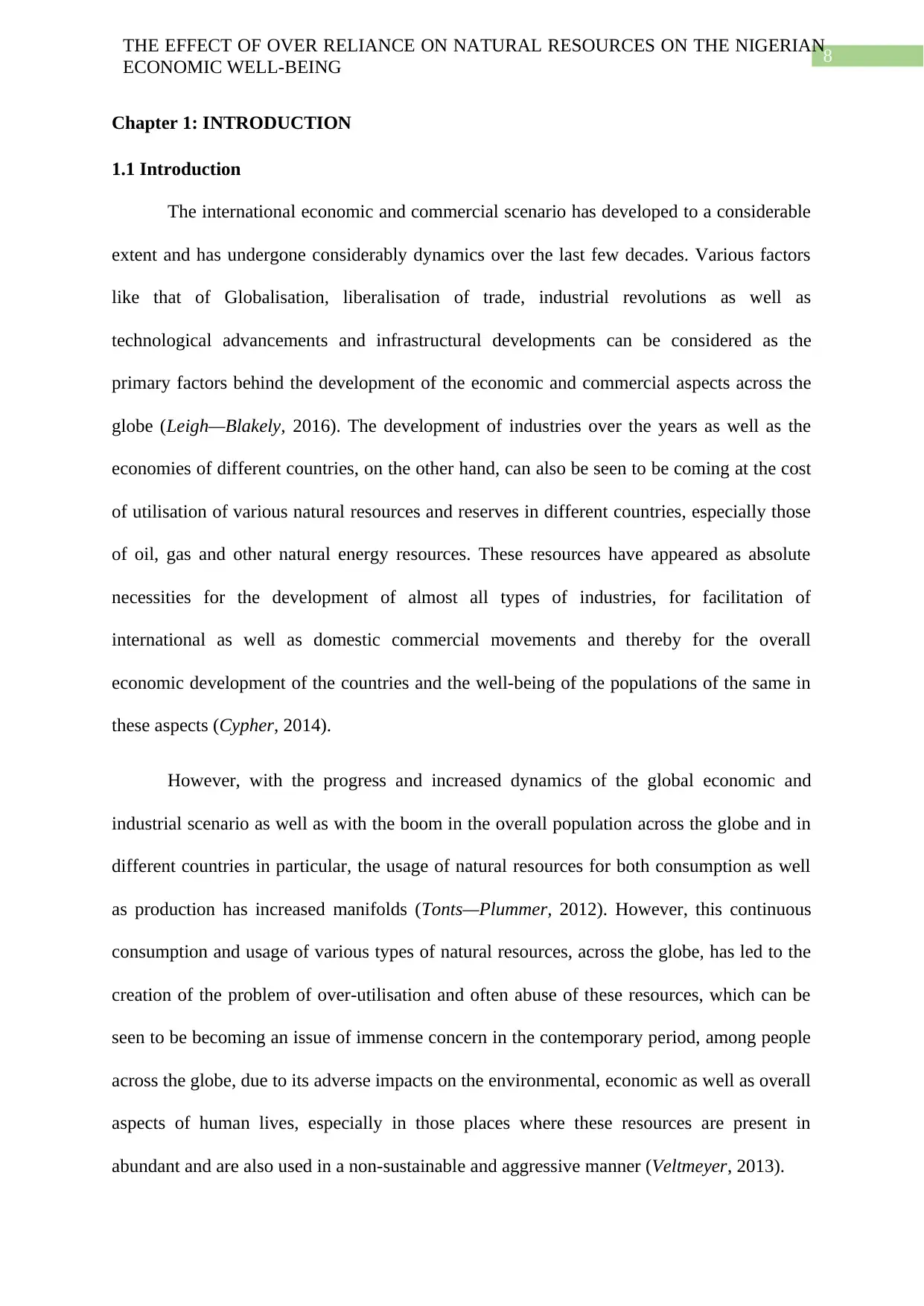
8
THE EFFECT OF OVER RELIANCE ON NATURAL RESOURCES ON THE NIGERIAN
ECONOMIC WELL-BEING
Chapter 1: INTRODUCTION
1.1 Introduction
The international economic and commercial scenario has developed to a considerable
extent and has undergone considerably dynamics over the last few decades. Various factors
like that of Globalisation, liberalisation of trade, industrial revolutions as well as
technological advancements and infrastructural developments can be considered as the
primary factors behind the development of the economic and commercial aspects across the
globe (Leigh—Blakely, 2016). The development of industries over the years as well as the
economies of different countries, on the other hand, can also be seen to be coming at the cost
of utilisation of various natural resources and reserves in different countries, especially those
of oil, gas and other natural energy resources. These resources have appeared as absolute
necessities for the development of almost all types of industries, for facilitation of
international as well as domestic commercial movements and thereby for the overall
economic development of the countries and the well-being of the populations of the same in
these aspects (Cypher, 2014).
However, with the progress and increased dynamics of the global economic and
industrial scenario as well as with the boom in the overall population across the globe and in
different countries in particular, the usage of natural resources for both consumption as well
as production has increased manifolds (Tonts—Plummer, 2012). However, this continuous
consumption and usage of various types of natural resources, across the globe, has led to the
creation of the problem of over-utilisation and often abuse of these resources, which can be
seen to be becoming an issue of immense concern in the contemporary period, among people
across the globe, due to its adverse impacts on the environmental, economic as well as overall
aspects of human lives, especially in those places where these resources are present in
abundant and are also used in a non-sustainable and aggressive manner (Veltmeyer, 2013).
THE EFFECT OF OVER RELIANCE ON NATURAL RESOURCES ON THE NIGERIAN
ECONOMIC WELL-BEING
Chapter 1: INTRODUCTION
1.1 Introduction
The international economic and commercial scenario has developed to a considerable
extent and has undergone considerably dynamics over the last few decades. Various factors
like that of Globalisation, liberalisation of trade, industrial revolutions as well as
technological advancements and infrastructural developments can be considered as the
primary factors behind the development of the economic and commercial aspects across the
globe (Leigh—Blakely, 2016). The development of industries over the years as well as the
economies of different countries, on the other hand, can also be seen to be coming at the cost
of utilisation of various natural resources and reserves in different countries, especially those
of oil, gas and other natural energy resources. These resources have appeared as absolute
necessities for the development of almost all types of industries, for facilitation of
international as well as domestic commercial movements and thereby for the overall
economic development of the countries and the well-being of the populations of the same in
these aspects (Cypher, 2014).
However, with the progress and increased dynamics of the global economic and
industrial scenario as well as with the boom in the overall population across the globe and in
different countries in particular, the usage of natural resources for both consumption as well
as production has increased manifolds (Tonts—Plummer, 2012). However, this continuous
consumption and usage of various types of natural resources, across the globe, has led to the
creation of the problem of over-utilisation and often abuse of these resources, which can be
seen to be becoming an issue of immense concern in the contemporary period, among people
across the globe, due to its adverse impacts on the environmental, economic as well as overall
aspects of human lives, especially in those places where these resources are present in
abundant and are also used in a non-sustainable and aggressive manner (Veltmeyer, 2013).
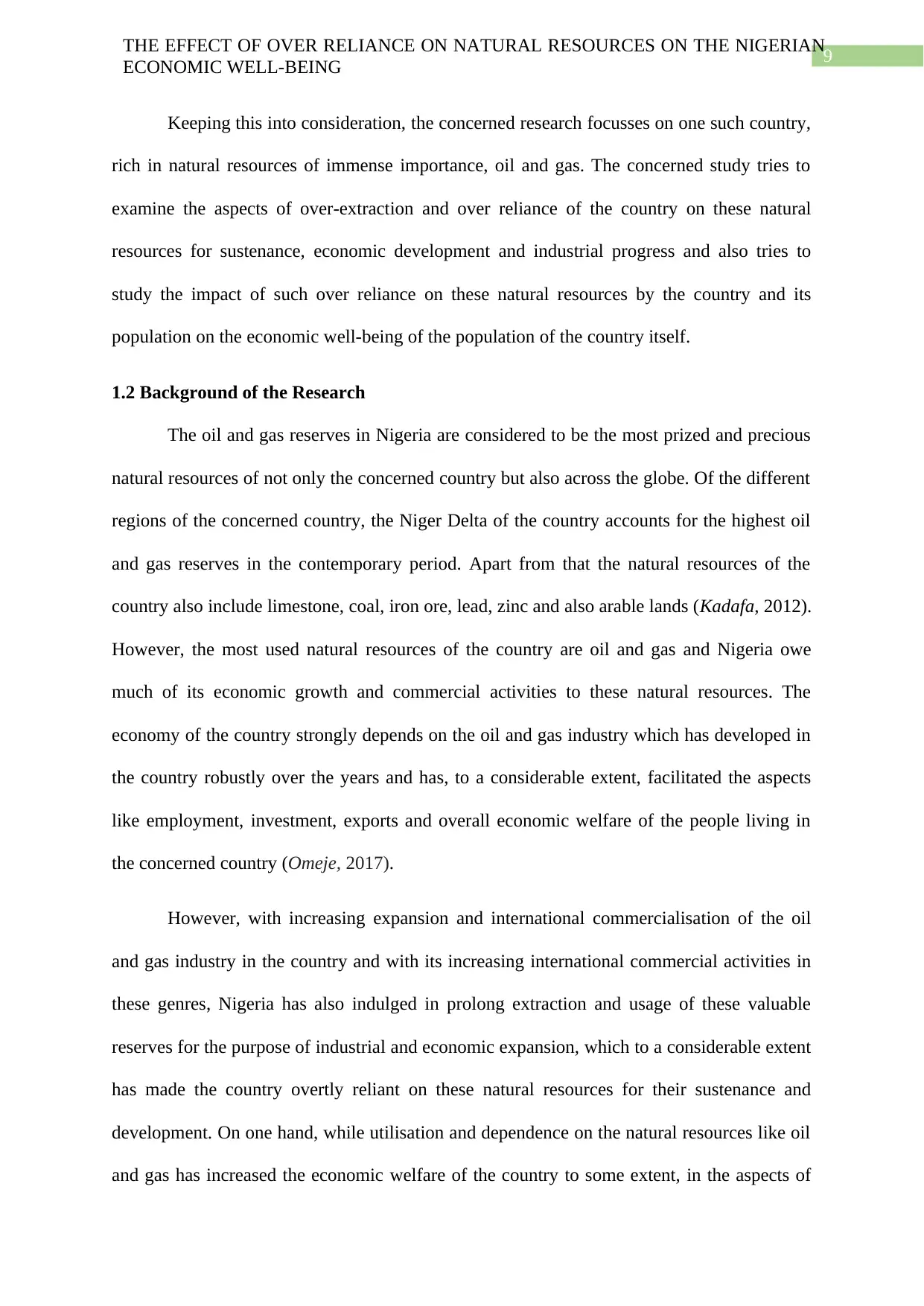
9
THE EFFECT OF OVER RELIANCE ON NATURAL RESOURCES ON THE NIGERIAN
ECONOMIC WELL-BEING
Keeping this into consideration, the concerned research focusses on one such country,
rich in natural resources of immense importance, oil and gas. The concerned study tries to
examine the aspects of over-extraction and over reliance of the country on these natural
resources for sustenance, economic development and industrial progress and also tries to
study the impact of such over reliance on these natural resources by the country and its
population on the economic well-being of the population of the country itself.
1.2 Background of the Research
The oil and gas reserves in Nigeria are considered to be the most prized and precious
natural resources of not only the concerned country but also across the globe. Of the different
regions of the concerned country, the Niger Delta of the country accounts for the highest oil
and gas reserves in the contemporary period. Apart from that the natural resources of the
country also include limestone, coal, iron ore, lead, zinc and also arable lands (Kadafa, 2012).
However, the most used natural resources of the country are oil and gas and Nigeria owe
much of its economic growth and commercial activities to these natural resources. The
economy of the country strongly depends on the oil and gas industry which has developed in
the country robustly over the years and has, to a considerable extent, facilitated the aspects
like employment, investment, exports and overall economic welfare of the people living in
the concerned country (Omeje, 2017).
However, with increasing expansion and international commercialisation of the oil
and gas industry in the country and with its increasing international commercial activities in
these genres, Nigeria has also indulged in prolong extraction and usage of these valuable
reserves for the purpose of industrial and economic expansion, which to a considerable extent
has made the country overtly reliant on these natural resources for their sustenance and
development. On one hand, while utilisation and dependence on the natural resources like oil
and gas has increased the economic welfare of the country to some extent, in the aspects of
THE EFFECT OF OVER RELIANCE ON NATURAL RESOURCES ON THE NIGERIAN
ECONOMIC WELL-BEING
Keeping this into consideration, the concerned research focusses on one such country,
rich in natural resources of immense importance, oil and gas. The concerned study tries to
examine the aspects of over-extraction and over reliance of the country on these natural
resources for sustenance, economic development and industrial progress and also tries to
study the impact of such over reliance on these natural resources by the country and its
population on the economic well-being of the population of the country itself.
1.2 Background of the Research
The oil and gas reserves in Nigeria are considered to be the most prized and precious
natural resources of not only the concerned country but also across the globe. Of the different
regions of the concerned country, the Niger Delta of the country accounts for the highest oil
and gas reserves in the contemporary period. Apart from that the natural resources of the
country also include limestone, coal, iron ore, lead, zinc and also arable lands (Kadafa, 2012).
However, the most used natural resources of the country are oil and gas and Nigeria owe
much of its economic growth and commercial activities to these natural resources. The
economy of the country strongly depends on the oil and gas industry which has developed in
the country robustly over the years and has, to a considerable extent, facilitated the aspects
like employment, investment, exports and overall economic welfare of the people living in
the concerned country (Omeje, 2017).
However, with increasing expansion and international commercialisation of the oil
and gas industry in the country and with its increasing international commercial activities in
these genres, Nigeria has also indulged in prolong extraction and usage of these valuable
reserves for the purpose of industrial and economic expansion, which to a considerable extent
has made the country overtly reliant on these natural resources for their sustenance and
development. On one hand, while utilisation and dependence on the natural resources like oil
and gas has increased the economic welfare of the country to some extent, in the aspects of
Secure Best Marks with AI Grader
Need help grading? Try our AI Grader for instant feedback on your assignments.
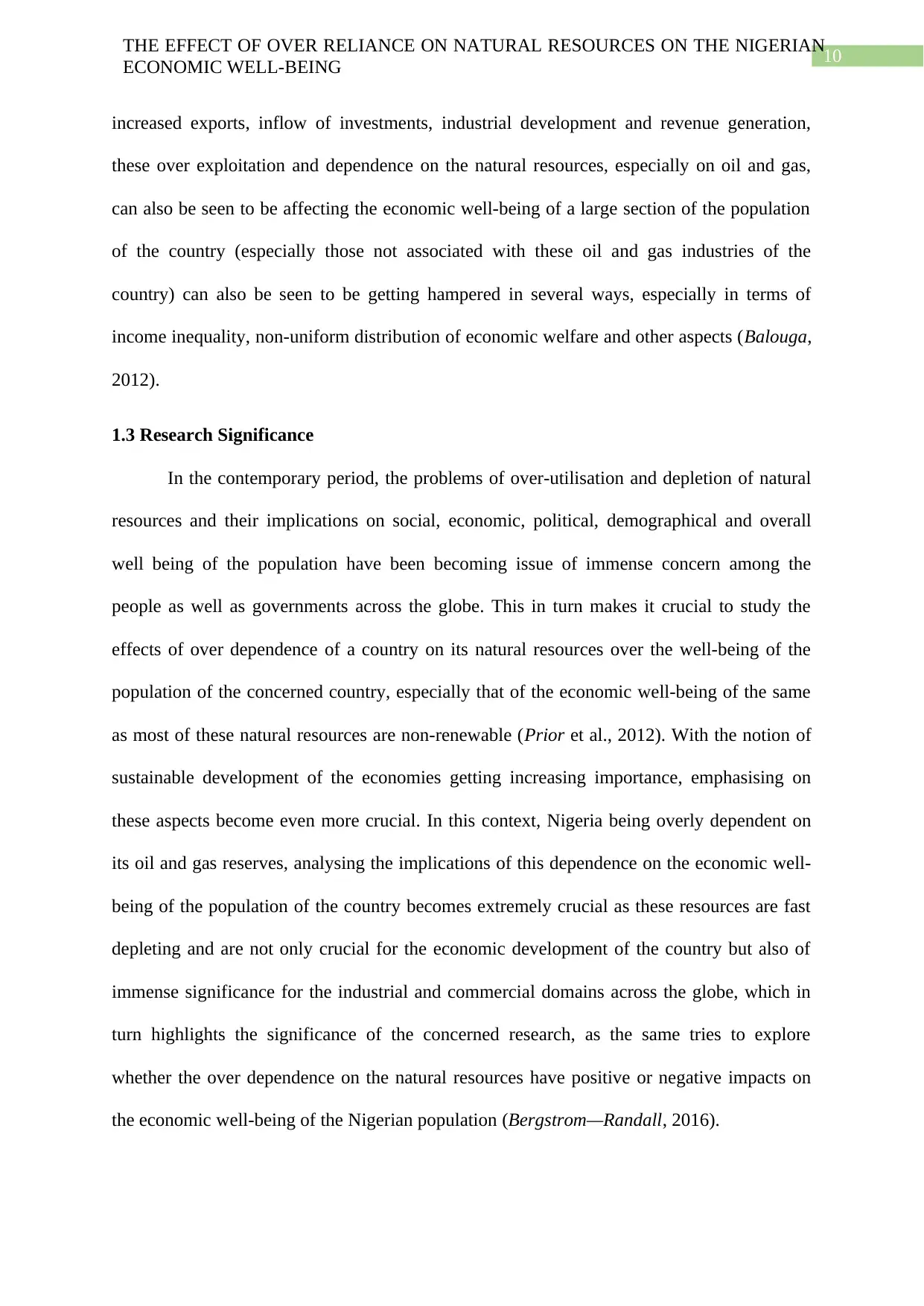
10
THE EFFECT OF OVER RELIANCE ON NATURAL RESOURCES ON THE NIGERIAN
ECONOMIC WELL-BEING
increased exports, inflow of investments, industrial development and revenue generation,
these over exploitation and dependence on the natural resources, especially on oil and gas,
can also be seen to be affecting the economic well-being of a large section of the population
of the country (especially those not associated with these oil and gas industries of the
country) can also be seen to be getting hampered in several ways, especially in terms of
income inequality, non-uniform distribution of economic welfare and other aspects (Balouga,
2012).
1.3 Research Significance
In the contemporary period, the problems of over-utilisation and depletion of natural
resources and their implications on social, economic, political, demographical and overall
well being of the population have been becoming issue of immense concern among the
people as well as governments across the globe. This in turn makes it crucial to study the
effects of over dependence of a country on its natural resources over the well-being of the
population of the concerned country, especially that of the economic well-being of the same
as most of these natural resources are non-renewable (Prior et al., 2012). With the notion of
sustainable development of the economies getting increasing importance, emphasising on
these aspects become even more crucial. In this context, Nigeria being overly dependent on
its oil and gas reserves, analysing the implications of this dependence on the economic well-
being of the population of the country becomes extremely crucial as these resources are fast
depleting and are not only crucial for the economic development of the country but also of
immense significance for the industrial and commercial domains across the globe, which in
turn highlights the significance of the concerned research, as the same tries to explore
whether the over dependence on the natural resources have positive or negative impacts on
the economic well-being of the Nigerian population (Bergstrom—Randall, 2016).
THE EFFECT OF OVER RELIANCE ON NATURAL RESOURCES ON THE NIGERIAN
ECONOMIC WELL-BEING
increased exports, inflow of investments, industrial development and revenue generation,
these over exploitation and dependence on the natural resources, especially on oil and gas,
can also be seen to be affecting the economic well-being of a large section of the population
of the country (especially those not associated with these oil and gas industries of the
country) can also be seen to be getting hampered in several ways, especially in terms of
income inequality, non-uniform distribution of economic welfare and other aspects (Balouga,
2012).
1.3 Research Significance
In the contemporary period, the problems of over-utilisation and depletion of natural
resources and their implications on social, economic, political, demographical and overall
well being of the population have been becoming issue of immense concern among the
people as well as governments across the globe. This in turn makes it crucial to study the
effects of over dependence of a country on its natural resources over the well-being of the
population of the concerned country, especially that of the economic well-being of the same
as most of these natural resources are non-renewable (Prior et al., 2012). With the notion of
sustainable development of the economies getting increasing importance, emphasising on
these aspects become even more crucial. In this context, Nigeria being overly dependent on
its oil and gas reserves, analysing the implications of this dependence on the economic well-
being of the population of the country becomes extremely crucial as these resources are fast
depleting and are not only crucial for the economic development of the country but also of
immense significance for the industrial and commercial domains across the globe, which in
turn highlights the significance of the concerned research, as the same tries to explore
whether the over dependence on the natural resources have positive or negative impacts on
the economic well-being of the Nigerian population (Bergstrom—Randall, 2016).
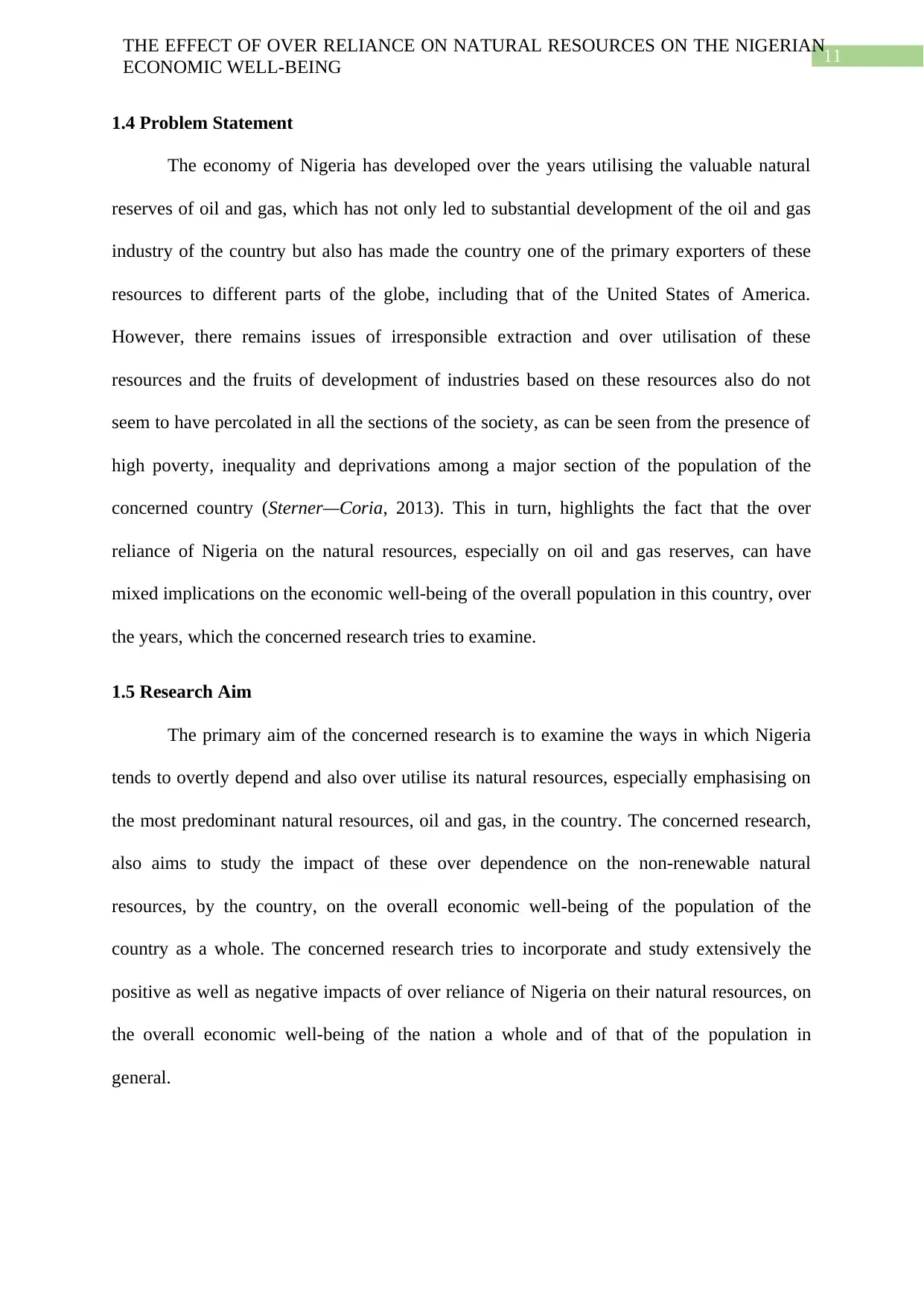
11
THE EFFECT OF OVER RELIANCE ON NATURAL RESOURCES ON THE NIGERIAN
ECONOMIC WELL-BEING
1.4 Problem Statement
The economy of Nigeria has developed over the years utilising the valuable natural
reserves of oil and gas, which has not only led to substantial development of the oil and gas
industry of the country but also has made the country one of the primary exporters of these
resources to different parts of the globe, including that of the United States of America.
However, there remains issues of irresponsible extraction and over utilisation of these
resources and the fruits of development of industries based on these resources also do not
seem to have percolated in all the sections of the society, as can be seen from the presence of
high poverty, inequality and deprivations among a major section of the population of the
concerned country (Sterner—Coria, 2013). This in turn, highlights the fact that the over
reliance of Nigeria on the natural resources, especially on oil and gas reserves, can have
mixed implications on the economic well-being of the overall population in this country, over
the years, which the concerned research tries to examine.
1.5 Research Aim
The primary aim of the concerned research is to examine the ways in which Nigeria
tends to overtly depend and also over utilise its natural resources, especially emphasising on
the most predominant natural resources, oil and gas, in the country. The concerned research,
also aims to study the impact of these over dependence on the non-renewable natural
resources, by the country, on the overall economic well-being of the population of the
country as a whole. The concerned research tries to incorporate and study extensively the
positive as well as negative impacts of over reliance of Nigeria on their natural resources, on
the overall economic well-being of the nation a whole and of that of the population in
general.
THE EFFECT OF OVER RELIANCE ON NATURAL RESOURCES ON THE NIGERIAN
ECONOMIC WELL-BEING
1.4 Problem Statement
The economy of Nigeria has developed over the years utilising the valuable natural
reserves of oil and gas, which has not only led to substantial development of the oil and gas
industry of the country but also has made the country one of the primary exporters of these
resources to different parts of the globe, including that of the United States of America.
However, there remains issues of irresponsible extraction and over utilisation of these
resources and the fruits of development of industries based on these resources also do not
seem to have percolated in all the sections of the society, as can be seen from the presence of
high poverty, inequality and deprivations among a major section of the population of the
concerned country (Sterner—Coria, 2013). This in turn, highlights the fact that the over
reliance of Nigeria on the natural resources, especially on oil and gas reserves, can have
mixed implications on the economic well-being of the overall population in this country, over
the years, which the concerned research tries to examine.
1.5 Research Aim
The primary aim of the concerned research is to examine the ways in which Nigeria
tends to overtly depend and also over utilise its natural resources, especially emphasising on
the most predominant natural resources, oil and gas, in the country. The concerned research,
also aims to study the impact of these over dependence on the non-renewable natural
resources, by the country, on the overall economic well-being of the population of the
country as a whole. The concerned research tries to incorporate and study extensively the
positive as well as negative impacts of over reliance of Nigeria on their natural resources, on
the overall economic well-being of the nation a whole and of that of the population in
general.
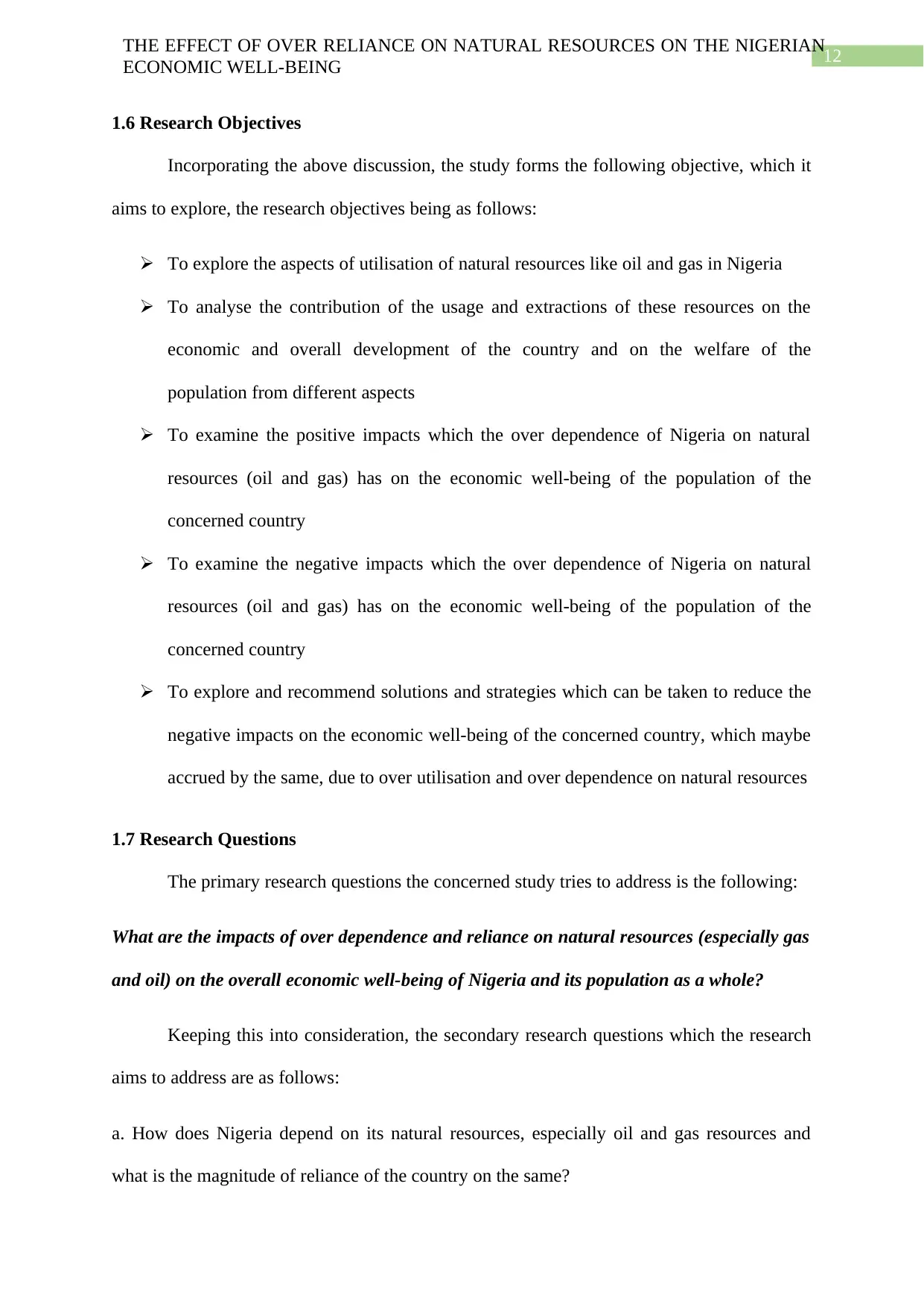
12
THE EFFECT OF OVER RELIANCE ON NATURAL RESOURCES ON THE NIGERIAN
ECONOMIC WELL-BEING
1.6 Research Objectives
Incorporating the above discussion, the study forms the following objective, which it
aims to explore, the research objectives being as follows:
To explore the aspects of utilisation of natural resources like oil and gas in Nigeria
To analyse the contribution of the usage and extractions of these resources on the
economic and overall development of the country and on the welfare of the
population from different aspects
To examine the positive impacts which the over dependence of Nigeria on natural
resources (oil and gas) has on the economic well-being of the population of the
concerned country
To examine the negative impacts which the over dependence of Nigeria on natural
resources (oil and gas) has on the economic well-being of the population of the
concerned country
To explore and recommend solutions and strategies which can be taken to reduce the
negative impacts on the economic well-being of the concerned country, which maybe
accrued by the same, due to over utilisation and over dependence on natural resources
1.7 Research Questions
The primary research questions the concerned study tries to address is the following:
What are the impacts of over dependence and reliance on natural resources (especially gas
and oil) on the overall economic well-being of Nigeria and its population as a whole?
Keeping this into consideration, the secondary research questions which the research
aims to address are as follows:
a. How does Nigeria depend on its natural resources, especially oil and gas resources and
what is the magnitude of reliance of the country on the same?
THE EFFECT OF OVER RELIANCE ON NATURAL RESOURCES ON THE NIGERIAN
ECONOMIC WELL-BEING
1.6 Research Objectives
Incorporating the above discussion, the study forms the following objective, which it
aims to explore, the research objectives being as follows:
To explore the aspects of utilisation of natural resources like oil and gas in Nigeria
To analyse the contribution of the usage and extractions of these resources on the
economic and overall development of the country and on the welfare of the
population from different aspects
To examine the positive impacts which the over dependence of Nigeria on natural
resources (oil and gas) has on the economic well-being of the population of the
concerned country
To examine the negative impacts which the over dependence of Nigeria on natural
resources (oil and gas) has on the economic well-being of the population of the
concerned country
To explore and recommend solutions and strategies which can be taken to reduce the
negative impacts on the economic well-being of the concerned country, which maybe
accrued by the same, due to over utilisation and over dependence on natural resources
1.7 Research Questions
The primary research questions the concerned study tries to address is the following:
What are the impacts of over dependence and reliance on natural resources (especially gas
and oil) on the overall economic well-being of Nigeria and its population as a whole?
Keeping this into consideration, the secondary research questions which the research
aims to address are as follows:
a. How does Nigeria depend on its natural resources, especially oil and gas resources and
what is the magnitude of reliance of the country on the same?
Paraphrase This Document
Need a fresh take? Get an instant paraphrase of this document with our AI Paraphraser
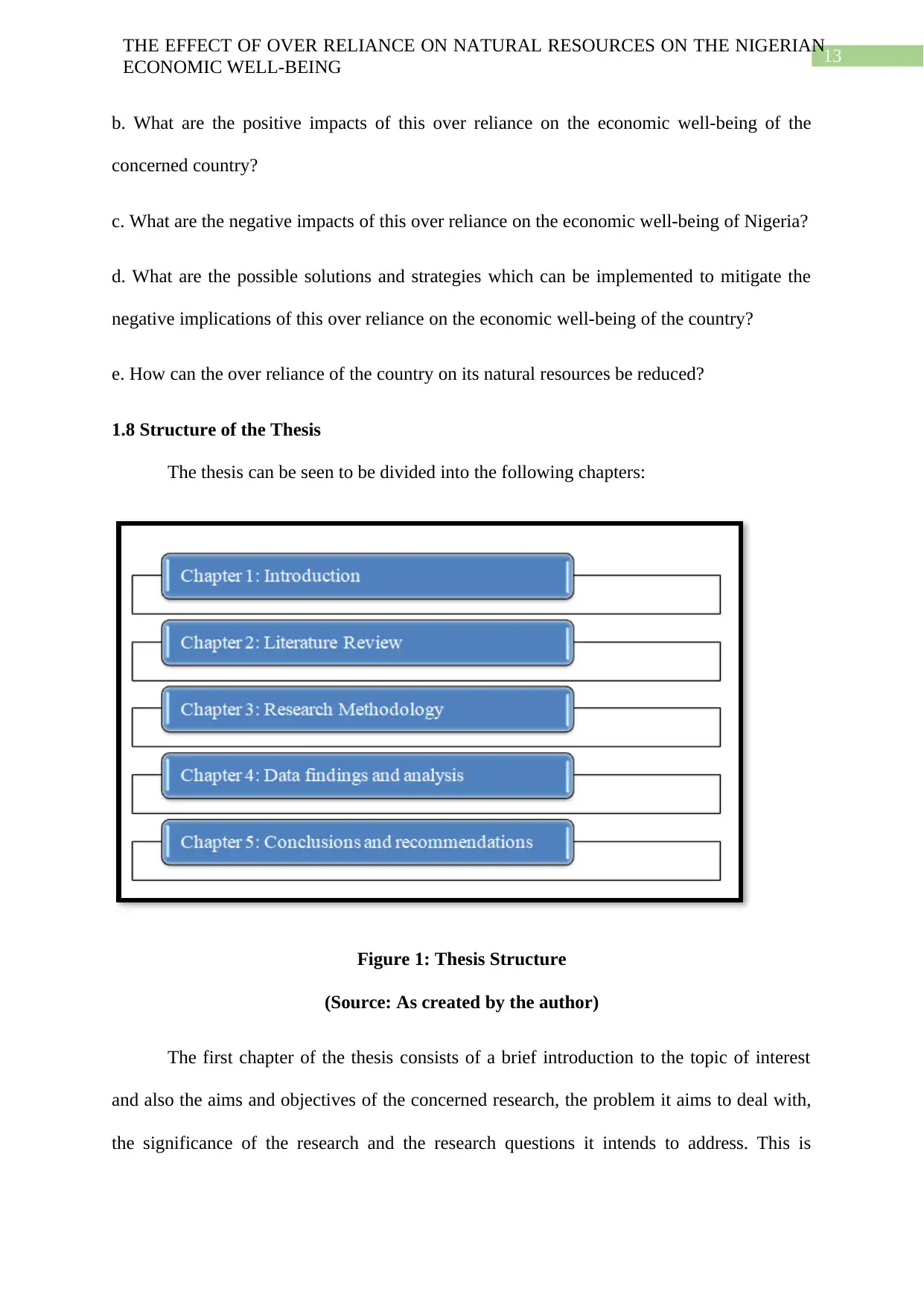
13
THE EFFECT OF OVER RELIANCE ON NATURAL RESOURCES ON THE NIGERIAN
ECONOMIC WELL-BEING
b. What are the positive impacts of this over reliance on the economic well-being of the
concerned country?
c. What are the negative impacts of this over reliance on the economic well-being of Nigeria?
d. What are the possible solutions and strategies which can be implemented to mitigate the
negative implications of this over reliance on the economic well-being of the country?
e. How can the over reliance of the country on its natural resources be reduced?
1.8 Structure of the Thesis
The thesis can be seen to be divided into the following chapters:
Figure 1: Thesis Structure
(Source: As created by the author)
The first chapter of the thesis consists of a brief introduction to the topic of interest
and also the aims and objectives of the concerned research, the problem it aims to deal with,
the significance of the research and the research questions it intends to address. This is
THE EFFECT OF OVER RELIANCE ON NATURAL RESOURCES ON THE NIGERIAN
ECONOMIC WELL-BEING
b. What are the positive impacts of this over reliance on the economic well-being of the
concerned country?
c. What are the negative impacts of this over reliance on the economic well-being of Nigeria?
d. What are the possible solutions and strategies which can be implemented to mitigate the
negative implications of this over reliance on the economic well-being of the country?
e. How can the over reliance of the country on its natural resources be reduced?
1.8 Structure of the Thesis
The thesis can be seen to be divided into the following chapters:
Figure 1: Thesis Structure
(Source: As created by the author)
The first chapter of the thesis consists of a brief introduction to the topic of interest
and also the aims and objectives of the concerned research, the problem it aims to deal with,
the significance of the research and the research questions it intends to address. This is
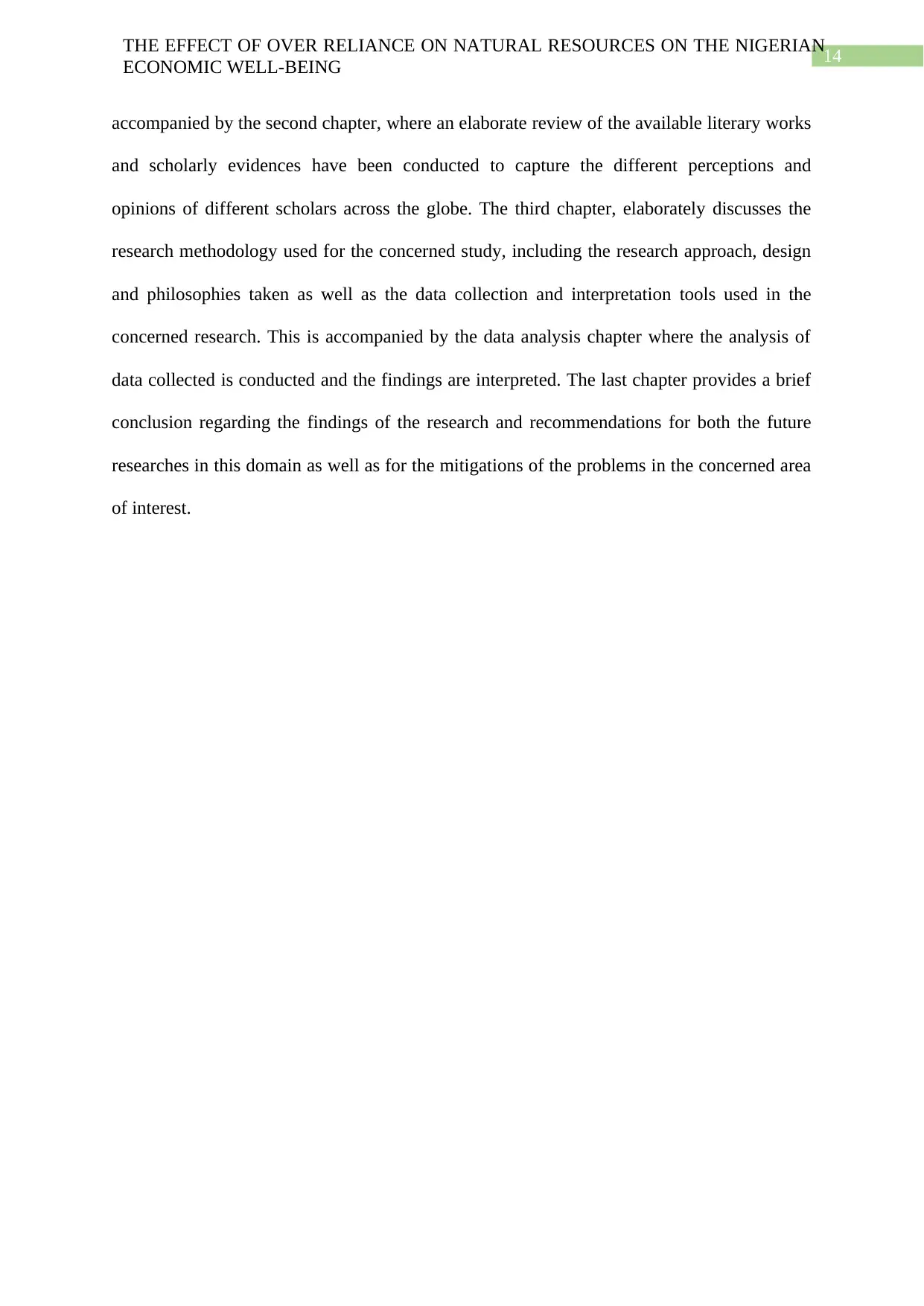
14
THE EFFECT OF OVER RELIANCE ON NATURAL RESOURCES ON THE NIGERIAN
ECONOMIC WELL-BEING
accompanied by the second chapter, where an elaborate review of the available literary works
and scholarly evidences have been conducted to capture the different perceptions and
opinions of different scholars across the globe. The third chapter, elaborately discusses the
research methodology used for the concerned study, including the research approach, design
and philosophies taken as well as the data collection and interpretation tools used in the
concerned research. This is accompanied by the data analysis chapter where the analysis of
data collected is conducted and the findings are interpreted. The last chapter provides a brief
conclusion regarding the findings of the research and recommendations for both the future
researches in this domain as well as for the mitigations of the problems in the concerned area
of interest.
THE EFFECT OF OVER RELIANCE ON NATURAL RESOURCES ON THE NIGERIAN
ECONOMIC WELL-BEING
accompanied by the second chapter, where an elaborate review of the available literary works
and scholarly evidences have been conducted to capture the different perceptions and
opinions of different scholars across the globe. The third chapter, elaborately discusses the
research methodology used for the concerned study, including the research approach, design
and philosophies taken as well as the data collection and interpretation tools used in the
concerned research. This is accompanied by the data analysis chapter where the analysis of
data collected is conducted and the findings are interpreted. The last chapter provides a brief
conclusion regarding the findings of the research and recommendations for both the future
researches in this domain as well as for the mitigations of the problems in the concerned area
of interest.
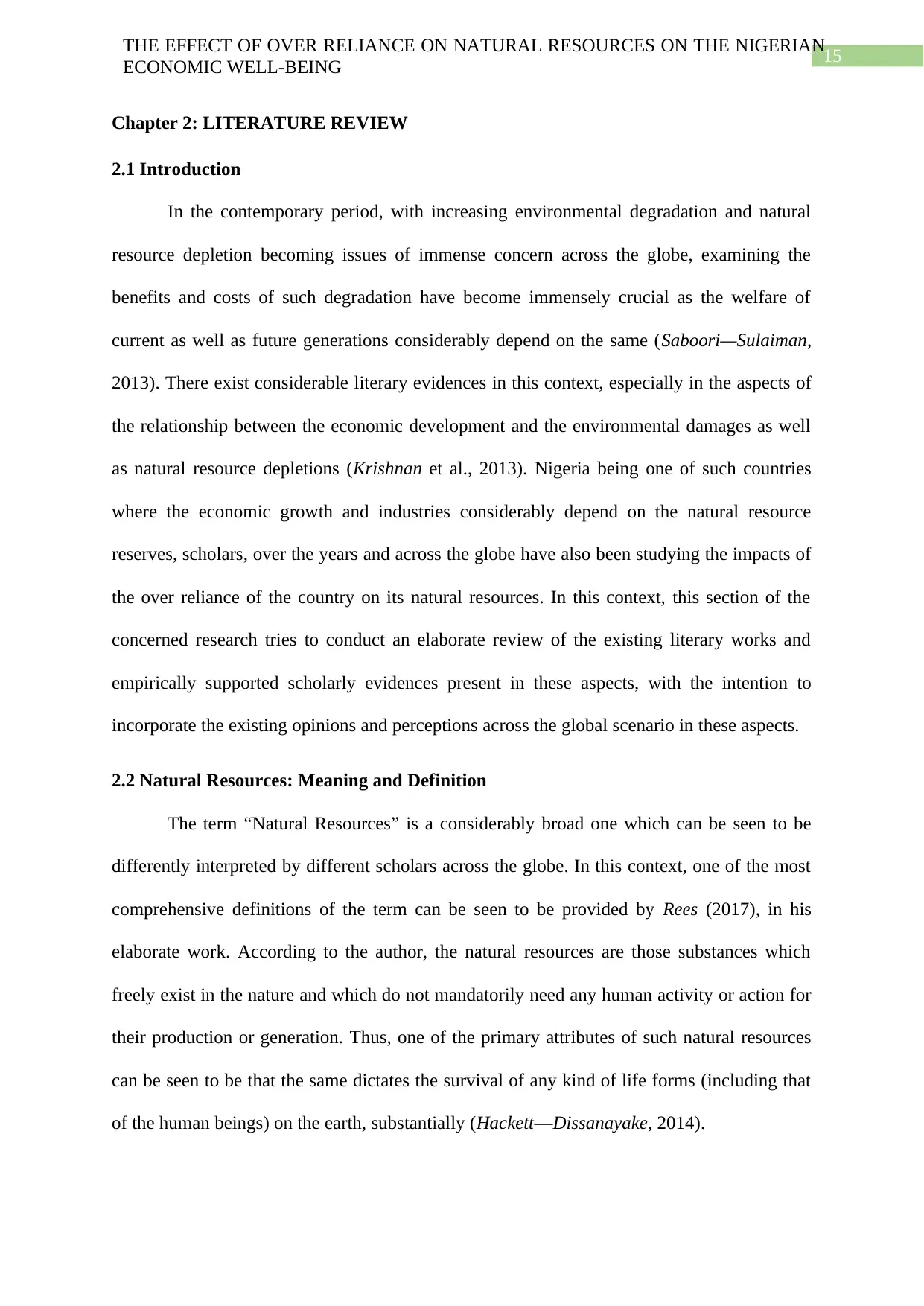
15
THE EFFECT OF OVER RELIANCE ON NATURAL RESOURCES ON THE NIGERIAN
ECONOMIC WELL-BEING
Chapter 2: LITERATURE REVIEW
2.1 Introduction
In the contemporary period, with increasing environmental degradation and natural
resource depletion becoming issues of immense concern across the globe, examining the
benefits and costs of such degradation have become immensely crucial as the welfare of
current as well as future generations considerably depend on the same (Saboori—Sulaiman,
2013). There exist considerable literary evidences in this context, especially in the aspects of
the relationship between the economic development and the environmental damages as well
as natural resource depletions (Krishnan et al., 2013). Nigeria being one of such countries
where the economic growth and industries considerably depend on the natural resource
reserves, scholars, over the years and across the globe have also been studying the impacts of
the over reliance of the country on its natural resources. In this context, this section of the
concerned research tries to conduct an elaborate review of the existing literary works and
empirically supported scholarly evidences present in these aspects, with the intention to
incorporate the existing opinions and perceptions across the global scenario in these aspects.
2.2 Natural Resources: Meaning and Definition
The term “Natural Resources” is a considerably broad one which can be seen to be
differently interpreted by different scholars across the globe. In this context, one of the most
comprehensive definitions of the term can be seen to be provided by Rees (2017), in his
elaborate work. According to the author, the natural resources are those substances which
freely exist in the nature and which do not mandatorily need any human activity or action for
their production or generation. Thus, one of the primary attributes of such natural resources
can be seen to be that the same dictates the survival of any kind of life forms (including that
of the human beings) on the earth, substantially (Hackett—Dissanayake, 2014).
THE EFFECT OF OVER RELIANCE ON NATURAL RESOURCES ON THE NIGERIAN
ECONOMIC WELL-BEING
Chapter 2: LITERATURE REVIEW
2.1 Introduction
In the contemporary period, with increasing environmental degradation and natural
resource depletion becoming issues of immense concern across the globe, examining the
benefits and costs of such degradation have become immensely crucial as the welfare of
current as well as future generations considerably depend on the same (Saboori—Sulaiman,
2013). There exist considerable literary evidences in this context, especially in the aspects of
the relationship between the economic development and the environmental damages as well
as natural resource depletions (Krishnan et al., 2013). Nigeria being one of such countries
where the economic growth and industries considerably depend on the natural resource
reserves, scholars, over the years and across the globe have also been studying the impacts of
the over reliance of the country on its natural resources. In this context, this section of the
concerned research tries to conduct an elaborate review of the existing literary works and
empirically supported scholarly evidences present in these aspects, with the intention to
incorporate the existing opinions and perceptions across the global scenario in these aspects.
2.2 Natural Resources: Meaning and Definition
The term “Natural Resources” is a considerably broad one which can be seen to be
differently interpreted by different scholars across the globe. In this context, one of the most
comprehensive definitions of the term can be seen to be provided by Rees (2017), in his
elaborate work. According to the author, the natural resources are those substances which
freely exist in the nature and which do not mandatorily need any human activity or action for
their production or generation. Thus, one of the primary attributes of such natural resources
can be seen to be that the same dictates the survival of any kind of life forms (including that
of the human beings) on the earth, substantially (Hackett—Dissanayake, 2014).
Secure Best Marks with AI Grader
Need help grading? Try our AI Grader for instant feedback on your assignments.
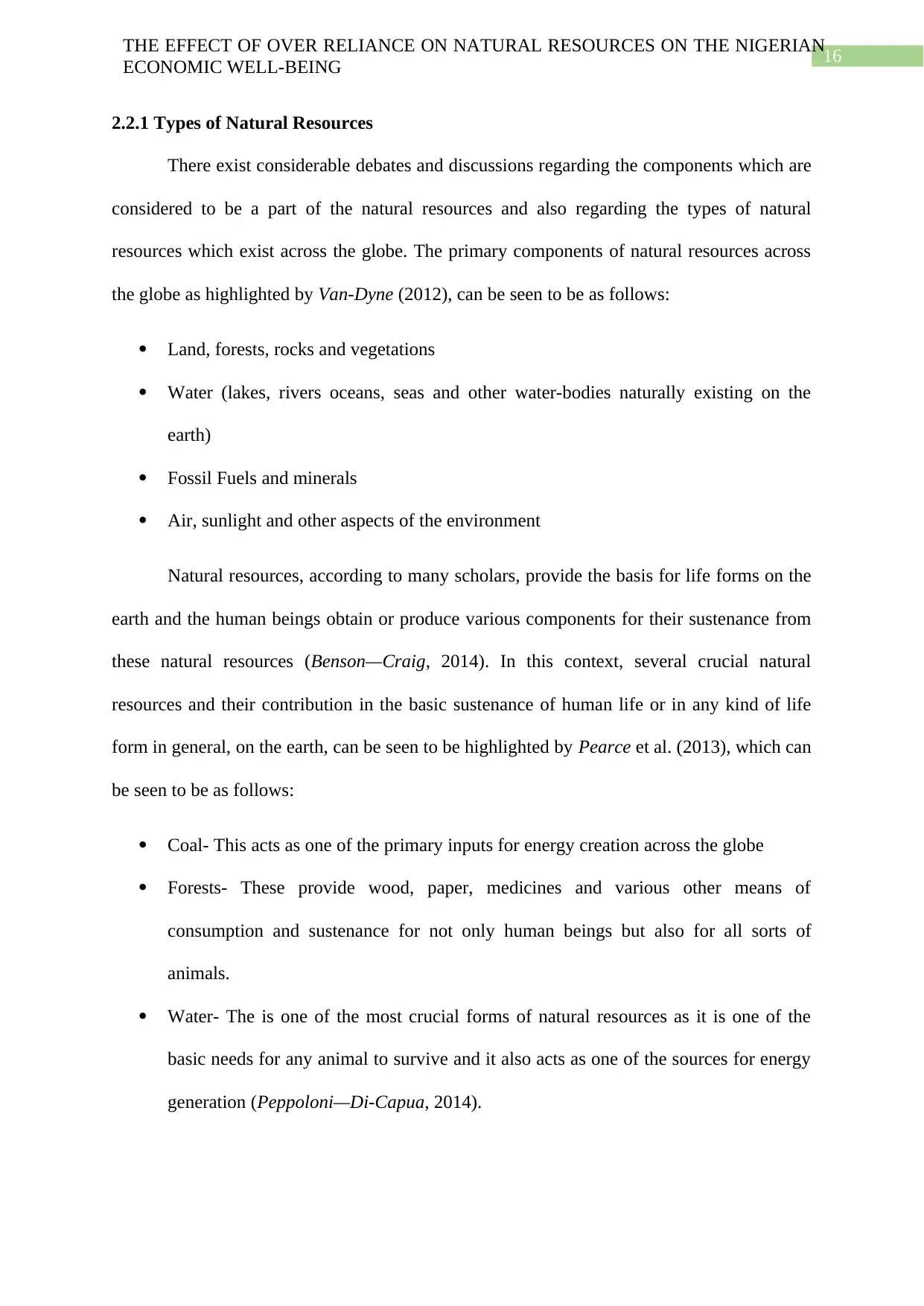
16
THE EFFECT OF OVER RELIANCE ON NATURAL RESOURCES ON THE NIGERIAN
ECONOMIC WELL-BEING
2.2.1 Types of Natural Resources
There exist considerable debates and discussions regarding the components which are
considered to be a part of the natural resources and also regarding the types of natural
resources which exist across the globe. The primary components of natural resources across
the globe as highlighted by Van-Dyne (2012), can be seen to be as follows:
Land, forests, rocks and vegetations
Water (lakes, rivers oceans, seas and other water-bodies naturally existing on the
earth)
Fossil Fuels and minerals
Air, sunlight and other aspects of the environment
Natural resources, according to many scholars, provide the basis for life forms on the
earth and the human beings obtain or produce various components for their sustenance from
these natural resources (Benson—Craig, 2014). In this context, several crucial natural
resources and their contribution in the basic sustenance of human life or in any kind of life
form in general, on the earth, can be seen to be highlighted by Pearce et al. (2013), which can
be seen to be as follows:
Coal- This acts as one of the primary inputs for energy creation across the globe
Forests- These provide wood, paper, medicines and various other means of
consumption and sustenance for not only human beings but also for all sorts of
animals.
Water- The is one of the most crucial forms of natural resources as it is one of the
basic needs for any animal to survive and it also acts as one of the sources for energy
generation (Peppoloni—Di-Capua, 2014).
THE EFFECT OF OVER RELIANCE ON NATURAL RESOURCES ON THE NIGERIAN
ECONOMIC WELL-BEING
2.2.1 Types of Natural Resources
There exist considerable debates and discussions regarding the components which are
considered to be a part of the natural resources and also regarding the types of natural
resources which exist across the globe. The primary components of natural resources across
the globe as highlighted by Van-Dyne (2012), can be seen to be as follows:
Land, forests, rocks and vegetations
Water (lakes, rivers oceans, seas and other water-bodies naturally existing on the
earth)
Fossil Fuels and minerals
Air, sunlight and other aspects of the environment
Natural resources, according to many scholars, provide the basis for life forms on the
earth and the human beings obtain or produce various components for their sustenance from
these natural resources (Benson—Craig, 2014). In this context, several crucial natural
resources and their contribution in the basic sustenance of human life or in any kind of life
form in general, on the earth, can be seen to be highlighted by Pearce et al. (2013), which can
be seen to be as follows:
Coal- This acts as one of the primary inputs for energy creation across the globe
Forests- These provide wood, paper, medicines and various other means of
consumption and sustenance for not only human beings but also for all sorts of
animals.
Water- The is one of the most crucial forms of natural resources as it is one of the
basic needs for any animal to survive and it also acts as one of the sources for energy
generation (Peppoloni—Di-Capua, 2014).
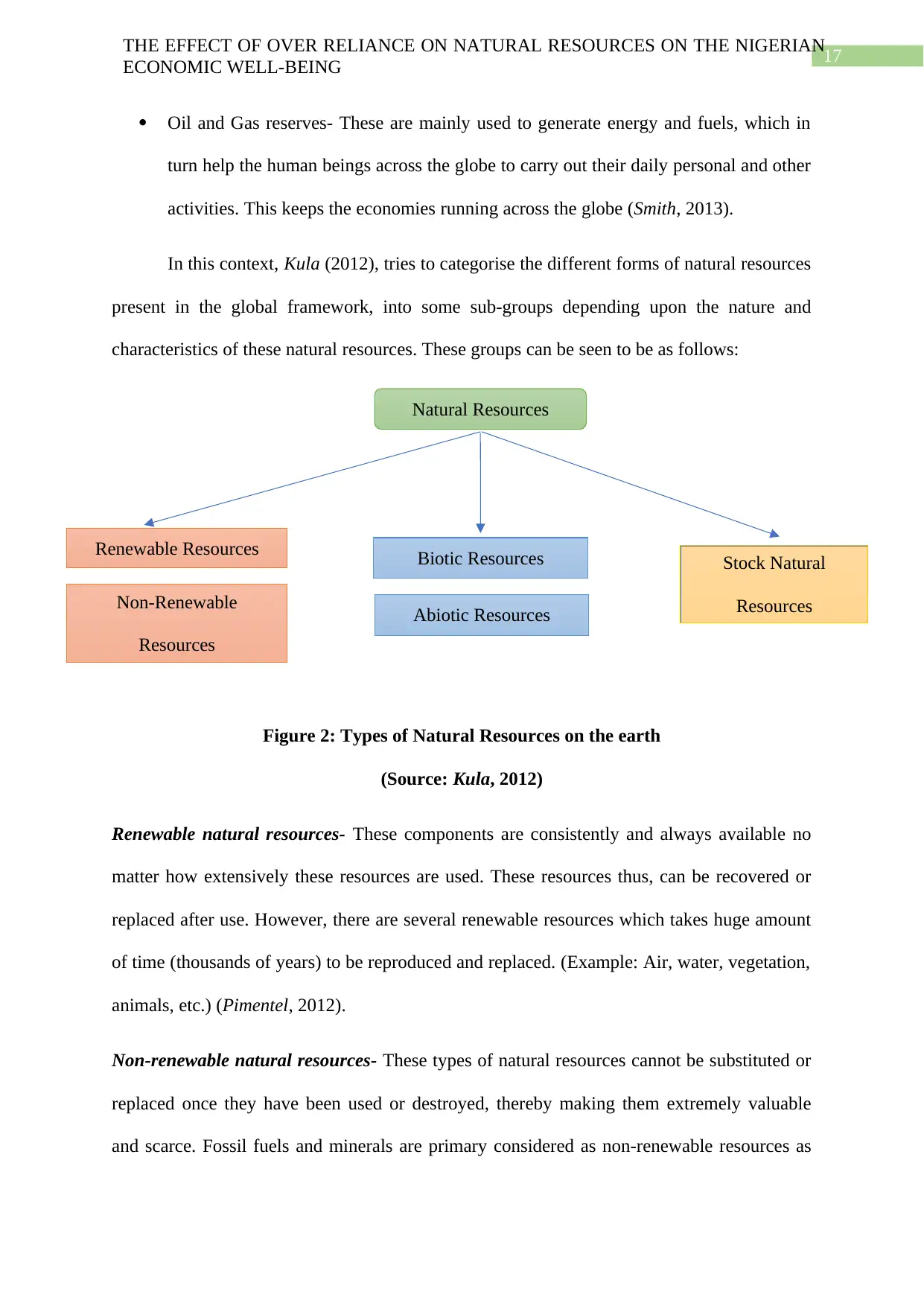
17
THE EFFECT OF OVER RELIANCE ON NATURAL RESOURCES ON THE NIGERIAN
ECONOMIC WELL-BEING
Oil and Gas reserves- These are mainly used to generate energy and fuels, which in
turn help the human beings across the globe to carry out their daily personal and other
activities. This keeps the economies running across the globe (Smith, 2013).
In this context, Kula (2012), tries to categorise the different forms of natural resources
present in the global framework, into some sub-groups depending upon the nature and
characteristics of these natural resources. These groups can be seen to be as follows:
Figure 2: Types of Natural Resources on the earth
(Source: Kula, 2012)
Renewable natural resources- These components are consistently and always available no
matter how extensively these resources are used. These resources thus, can be recovered or
replaced after use. However, there are several renewable resources which takes huge amount
of time (thousands of years) to be reproduced and replaced. (Example: Air, water, vegetation,
animals, etc.) (Pimentel, 2012).
Non-renewable natural resources- These types of natural resources cannot be substituted or
replaced once they have been used or destroyed, thereby making them extremely valuable
and scarce. Fossil fuels and minerals are primary considered as non-renewable resources as
Natural Resources
Renewable Resources
Non-Renewable
Resources
Biotic Resources
Abiotic Resources
Stock Natural
Resources
THE EFFECT OF OVER RELIANCE ON NATURAL RESOURCES ON THE NIGERIAN
ECONOMIC WELL-BEING
Oil and Gas reserves- These are mainly used to generate energy and fuels, which in
turn help the human beings across the globe to carry out their daily personal and other
activities. This keeps the economies running across the globe (Smith, 2013).
In this context, Kula (2012), tries to categorise the different forms of natural resources
present in the global framework, into some sub-groups depending upon the nature and
characteristics of these natural resources. These groups can be seen to be as follows:
Figure 2: Types of Natural Resources on the earth
(Source: Kula, 2012)
Renewable natural resources- These components are consistently and always available no
matter how extensively these resources are used. These resources thus, can be recovered or
replaced after use. However, there are several renewable resources which takes huge amount
of time (thousands of years) to be reproduced and replaced. (Example: Air, water, vegetation,
animals, etc.) (Pimentel, 2012).
Non-renewable natural resources- These types of natural resources cannot be substituted or
replaced once they have been used or destroyed, thereby making them extremely valuable
and scarce. Fossil fuels and minerals are primary considered as non-renewable resources as
Natural Resources
Renewable Resources
Non-Renewable
Resources
Biotic Resources
Abiotic Resources
Stock Natural
Resources
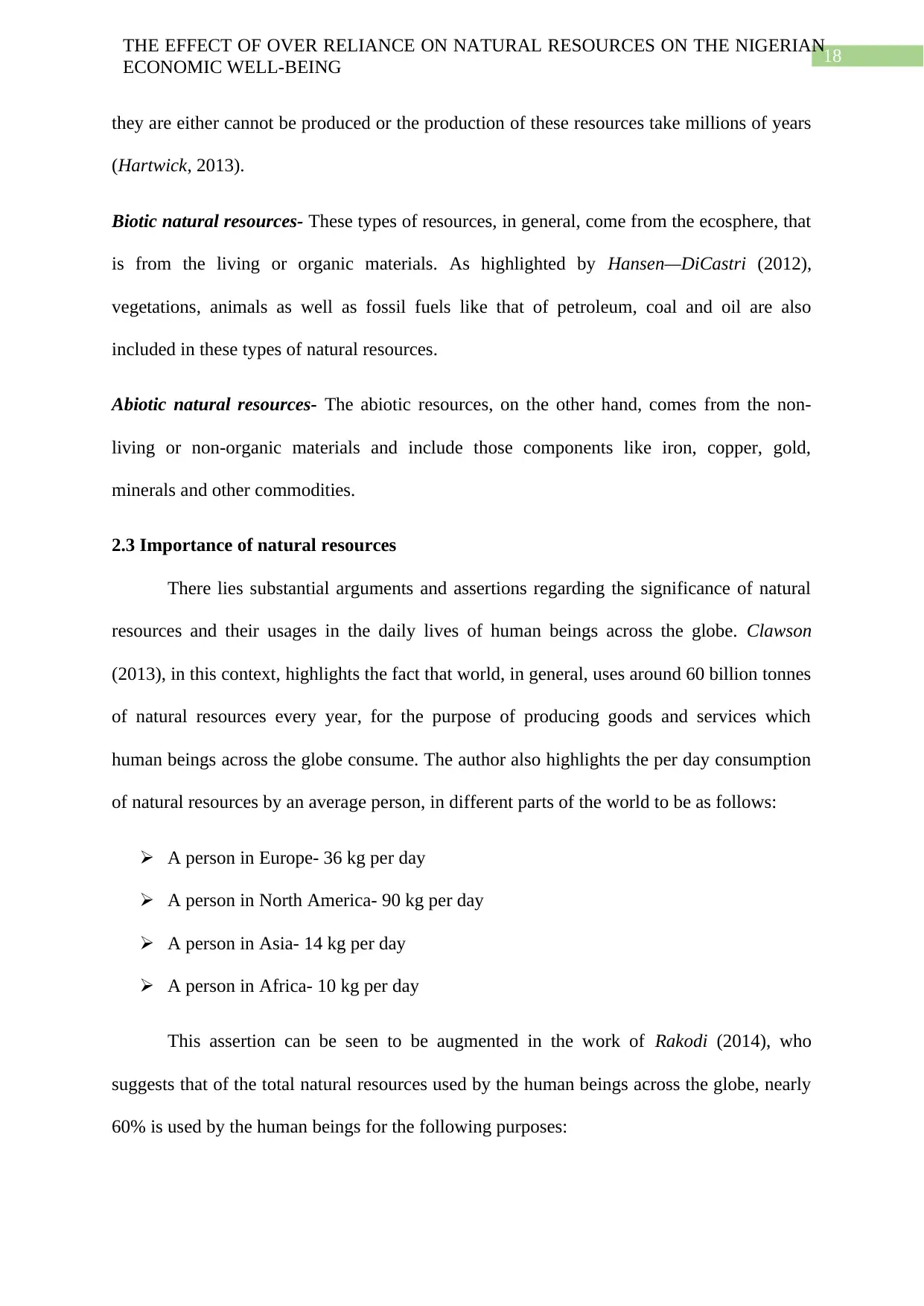
18
THE EFFECT OF OVER RELIANCE ON NATURAL RESOURCES ON THE NIGERIAN
ECONOMIC WELL-BEING
they are either cannot be produced or the production of these resources take millions of years
(Hartwick, 2013).
Biotic natural resources- These types of resources, in general, come from the ecosphere, that
is from the living or organic materials. As highlighted by Hansen—DiCastri (2012),
vegetations, animals as well as fossil fuels like that of petroleum, coal and oil are also
included in these types of natural resources.
Abiotic natural resources- The abiotic resources, on the other hand, comes from the non-
living or non-organic materials and include those components like iron, copper, gold,
minerals and other commodities.
2.3 Importance of natural resources
There lies substantial arguments and assertions regarding the significance of natural
resources and their usages in the daily lives of human beings across the globe. Clawson
(2013), in this context, highlights the fact that world, in general, uses around 60 billion tonnes
of natural resources every year, for the purpose of producing goods and services which
human beings across the globe consume. The author also highlights the per day consumption
of natural resources by an average person, in different parts of the world to be as follows:
A person in Europe- 36 kg per day
A person in North America- 90 kg per day
A person in Asia- 14 kg per day
A person in Africa- 10 kg per day
This assertion can be seen to be augmented in the work of Rakodi (2014), who
suggests that of the total natural resources used by the human beings across the globe, nearly
60% is used by the human beings for the following purposes:
THE EFFECT OF OVER RELIANCE ON NATURAL RESOURCES ON THE NIGERIAN
ECONOMIC WELL-BEING
they are either cannot be produced or the production of these resources take millions of years
(Hartwick, 2013).
Biotic natural resources- These types of resources, in general, come from the ecosphere, that
is from the living or organic materials. As highlighted by Hansen—DiCastri (2012),
vegetations, animals as well as fossil fuels like that of petroleum, coal and oil are also
included in these types of natural resources.
Abiotic natural resources- The abiotic resources, on the other hand, comes from the non-
living or non-organic materials and include those components like iron, copper, gold,
minerals and other commodities.
2.3 Importance of natural resources
There lies substantial arguments and assertions regarding the significance of natural
resources and their usages in the daily lives of human beings across the globe. Clawson
(2013), in this context, highlights the fact that world, in general, uses around 60 billion tonnes
of natural resources every year, for the purpose of producing goods and services which
human beings across the globe consume. The author also highlights the per day consumption
of natural resources by an average person, in different parts of the world to be as follows:
A person in Europe- 36 kg per day
A person in North America- 90 kg per day
A person in Asia- 14 kg per day
A person in Africa- 10 kg per day
This assertion can be seen to be augmented in the work of Rakodi (2014), who
suggests that of the total natural resources used by the human beings across the globe, nearly
60% is used by the human beings for the following purposes:
Paraphrase This Document
Need a fresh take? Get an instant paraphrase of this document with our AI Paraphraser
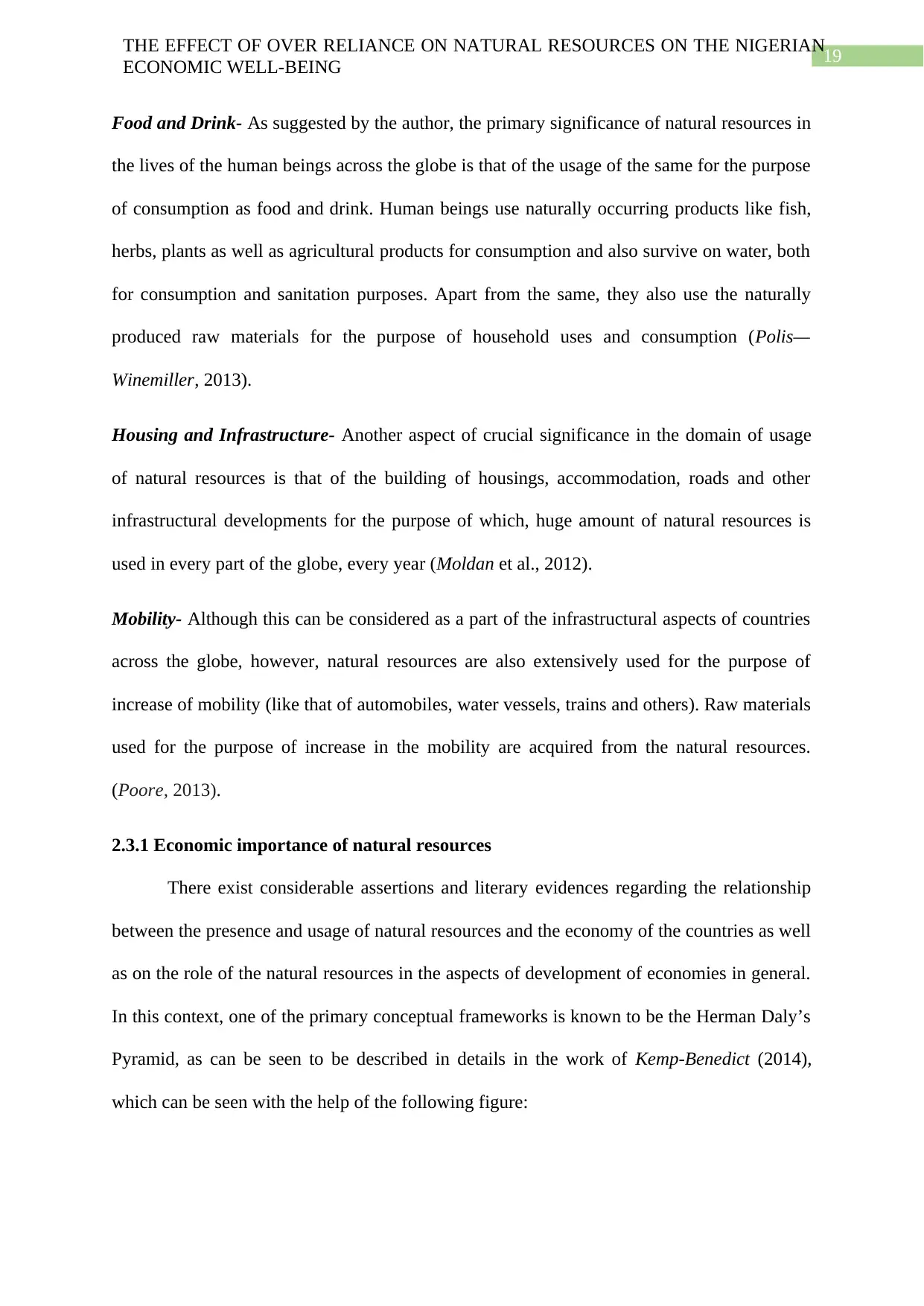
19
THE EFFECT OF OVER RELIANCE ON NATURAL RESOURCES ON THE NIGERIAN
ECONOMIC WELL-BEING
Food and Drink- As suggested by the author, the primary significance of natural resources in
the lives of the human beings across the globe is that of the usage of the same for the purpose
of consumption as food and drink. Human beings use naturally occurring products like fish,
herbs, plants as well as agricultural products for consumption and also survive on water, both
for consumption and sanitation purposes. Apart from the same, they also use the naturally
produced raw materials for the purpose of household uses and consumption (Polis—
Winemiller, 2013).
Housing and Infrastructure- Another aspect of crucial significance in the domain of usage
of natural resources is that of the building of housings, accommodation, roads and other
infrastructural developments for the purpose of which, huge amount of natural resources is
used in every part of the globe, every year (Moldan et al., 2012).
Mobility- Although this can be considered as a part of the infrastructural aspects of countries
across the globe, however, natural resources are also extensively used for the purpose of
increase of mobility (like that of automobiles, water vessels, trains and others). Raw materials
used for the purpose of increase in the mobility are acquired from the natural resources.
(Poore, 2013).
2.3.1 Economic importance of natural resources
There exist considerable assertions and literary evidences regarding the relationship
between the presence and usage of natural resources and the economy of the countries as well
as on the role of the natural resources in the aspects of development of economies in general.
In this context, one of the primary conceptual frameworks is known to be the Herman Daly’s
Pyramid, as can be seen to be described in details in the work of Kemp-Benedict (2014),
which can be seen with the help of the following figure:
THE EFFECT OF OVER RELIANCE ON NATURAL RESOURCES ON THE NIGERIAN
ECONOMIC WELL-BEING
Food and Drink- As suggested by the author, the primary significance of natural resources in
the lives of the human beings across the globe is that of the usage of the same for the purpose
of consumption as food and drink. Human beings use naturally occurring products like fish,
herbs, plants as well as agricultural products for consumption and also survive on water, both
for consumption and sanitation purposes. Apart from the same, they also use the naturally
produced raw materials for the purpose of household uses and consumption (Polis—
Winemiller, 2013).
Housing and Infrastructure- Another aspect of crucial significance in the domain of usage
of natural resources is that of the building of housings, accommodation, roads and other
infrastructural developments for the purpose of which, huge amount of natural resources is
used in every part of the globe, every year (Moldan et al., 2012).
Mobility- Although this can be considered as a part of the infrastructural aspects of countries
across the globe, however, natural resources are also extensively used for the purpose of
increase of mobility (like that of automobiles, water vessels, trains and others). Raw materials
used for the purpose of increase in the mobility are acquired from the natural resources.
(Poore, 2013).
2.3.1 Economic importance of natural resources
There exist considerable assertions and literary evidences regarding the relationship
between the presence and usage of natural resources and the economy of the countries as well
as on the role of the natural resources in the aspects of development of economies in general.
In this context, one of the primary conceptual frameworks is known to be the Herman Daly’s
Pyramid, as can be seen to be described in details in the work of Kemp-Benedict (2014),
which can be seen with the help of the following figure:
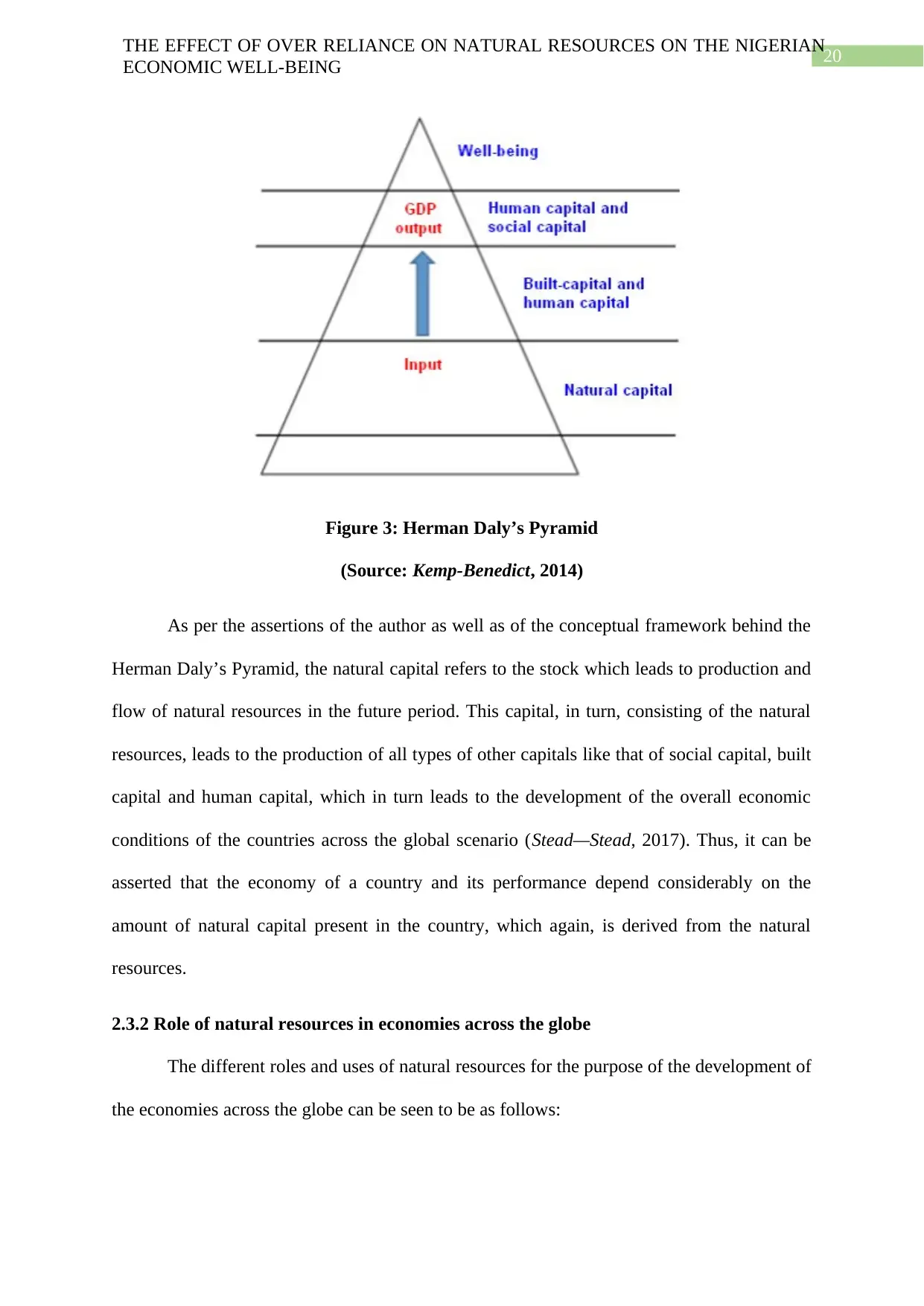
20
THE EFFECT OF OVER RELIANCE ON NATURAL RESOURCES ON THE NIGERIAN
ECONOMIC WELL-BEING
Figure 3: Herman Daly’s Pyramid
(Source: Kemp-Benedict, 2014)
As per the assertions of the author as well as of the conceptual framework behind the
Herman Daly’s Pyramid, the natural capital refers to the stock which leads to production and
flow of natural resources in the future period. This capital, in turn, consisting of the natural
resources, leads to the production of all types of other capitals like that of social capital, built
capital and human capital, which in turn leads to the development of the overall economic
conditions of the countries across the global scenario (Stead—Stead, 2017). Thus, it can be
asserted that the economy of a country and its performance depend considerably on the
amount of natural capital present in the country, which again, is derived from the natural
resources.
2.3.2 Role of natural resources in economies across the globe
The different roles and uses of natural resources for the purpose of the development of
the economies across the globe can be seen to be as follows:
THE EFFECT OF OVER RELIANCE ON NATURAL RESOURCES ON THE NIGERIAN
ECONOMIC WELL-BEING
Figure 3: Herman Daly’s Pyramid
(Source: Kemp-Benedict, 2014)
As per the assertions of the author as well as of the conceptual framework behind the
Herman Daly’s Pyramid, the natural capital refers to the stock which leads to production and
flow of natural resources in the future period. This capital, in turn, consisting of the natural
resources, leads to the production of all types of other capitals like that of social capital, built
capital and human capital, which in turn leads to the development of the overall economic
conditions of the countries across the global scenario (Stead—Stead, 2017). Thus, it can be
asserted that the economy of a country and its performance depend considerably on the
amount of natural capital present in the country, which again, is derived from the natural
resources.
2.3.2 Role of natural resources in economies across the globe
The different roles and uses of natural resources for the purpose of the development of
the economies across the globe can be seen to be as follows:
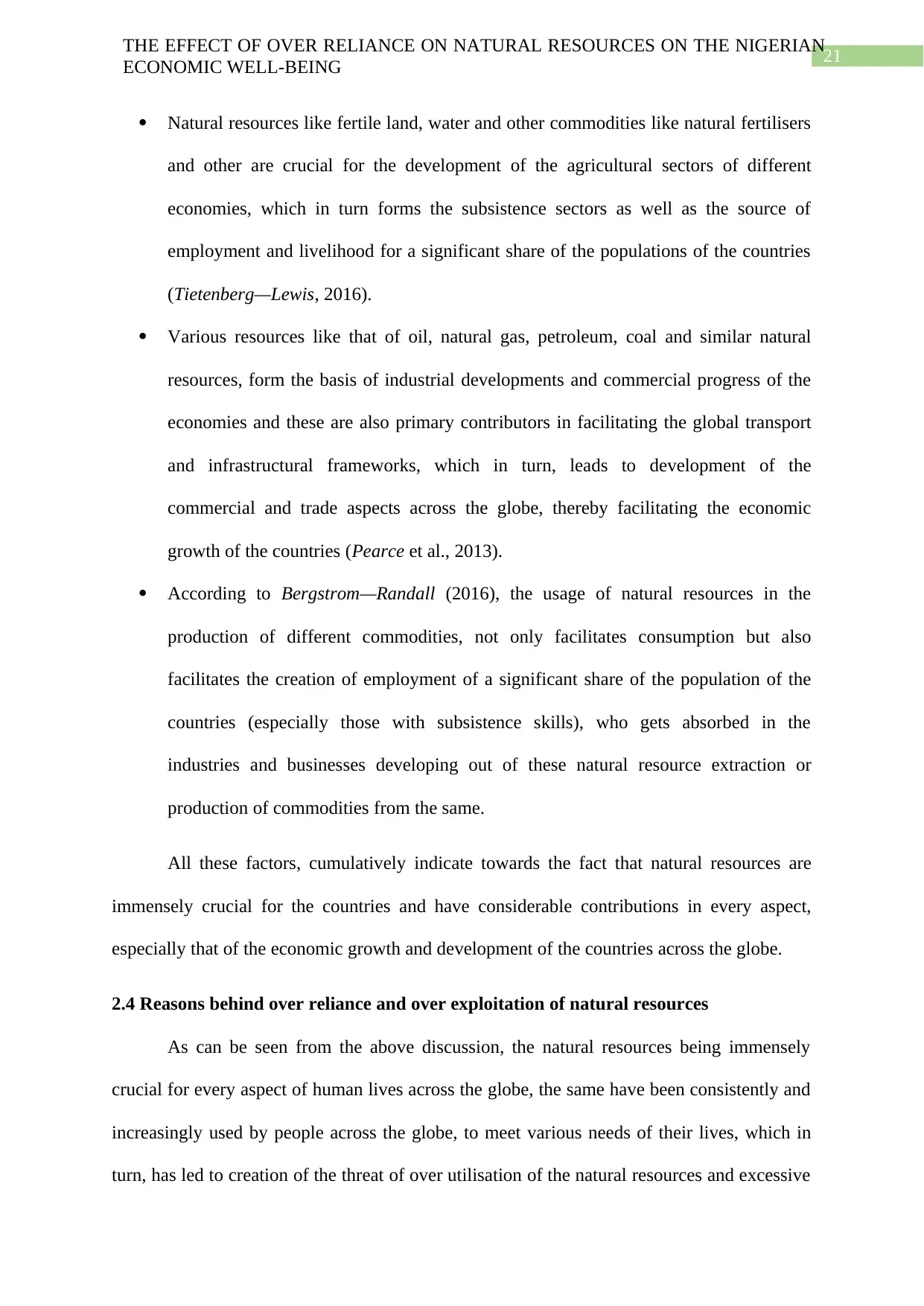
21
THE EFFECT OF OVER RELIANCE ON NATURAL RESOURCES ON THE NIGERIAN
ECONOMIC WELL-BEING
Natural resources like fertile land, water and other commodities like natural fertilisers
and other are crucial for the development of the agricultural sectors of different
economies, which in turn forms the subsistence sectors as well as the source of
employment and livelihood for a significant share of the populations of the countries
(Tietenberg—Lewis, 2016).
Various resources like that of oil, natural gas, petroleum, coal and similar natural
resources, form the basis of industrial developments and commercial progress of the
economies and these are also primary contributors in facilitating the global transport
and infrastructural frameworks, which in turn, leads to development of the
commercial and trade aspects across the globe, thereby facilitating the economic
growth of the countries (Pearce et al., 2013).
According to Bergstrom—Randall (2016), the usage of natural resources in the
production of different commodities, not only facilitates consumption but also
facilitates the creation of employment of a significant share of the population of the
countries (especially those with subsistence skills), who gets absorbed in the
industries and businesses developing out of these natural resource extraction or
production of commodities from the same.
All these factors, cumulatively indicate towards the fact that natural resources are
immensely crucial for the countries and have considerable contributions in every aspect,
especially that of the economic growth and development of the countries across the globe.
2.4 Reasons behind over reliance and over exploitation of natural resources
As can be seen from the above discussion, the natural resources being immensely
crucial for every aspect of human lives across the globe, the same have been consistently and
increasingly used by people across the globe, to meet various needs of their lives, which in
turn, has led to creation of the threat of over utilisation of the natural resources and excessive
THE EFFECT OF OVER RELIANCE ON NATURAL RESOURCES ON THE NIGERIAN
ECONOMIC WELL-BEING
Natural resources like fertile land, water and other commodities like natural fertilisers
and other are crucial for the development of the agricultural sectors of different
economies, which in turn forms the subsistence sectors as well as the source of
employment and livelihood for a significant share of the populations of the countries
(Tietenberg—Lewis, 2016).
Various resources like that of oil, natural gas, petroleum, coal and similar natural
resources, form the basis of industrial developments and commercial progress of the
economies and these are also primary contributors in facilitating the global transport
and infrastructural frameworks, which in turn, leads to development of the
commercial and trade aspects across the globe, thereby facilitating the economic
growth of the countries (Pearce et al., 2013).
According to Bergstrom—Randall (2016), the usage of natural resources in the
production of different commodities, not only facilitates consumption but also
facilitates the creation of employment of a significant share of the population of the
countries (especially those with subsistence skills), who gets absorbed in the
industries and businesses developing out of these natural resource extraction or
production of commodities from the same.
All these factors, cumulatively indicate towards the fact that natural resources are
immensely crucial for the countries and have considerable contributions in every aspect,
especially that of the economic growth and development of the countries across the globe.
2.4 Reasons behind over reliance and over exploitation of natural resources
As can be seen from the above discussion, the natural resources being immensely
crucial for every aspect of human lives across the globe, the same have been consistently and
increasingly used by people across the globe, to meet various needs of their lives, which in
turn, has led to creation of the threat of over utilisation of the natural resources and excessive
Secure Best Marks with AI Grader
Need help grading? Try our AI Grader for instant feedback on your assignments.
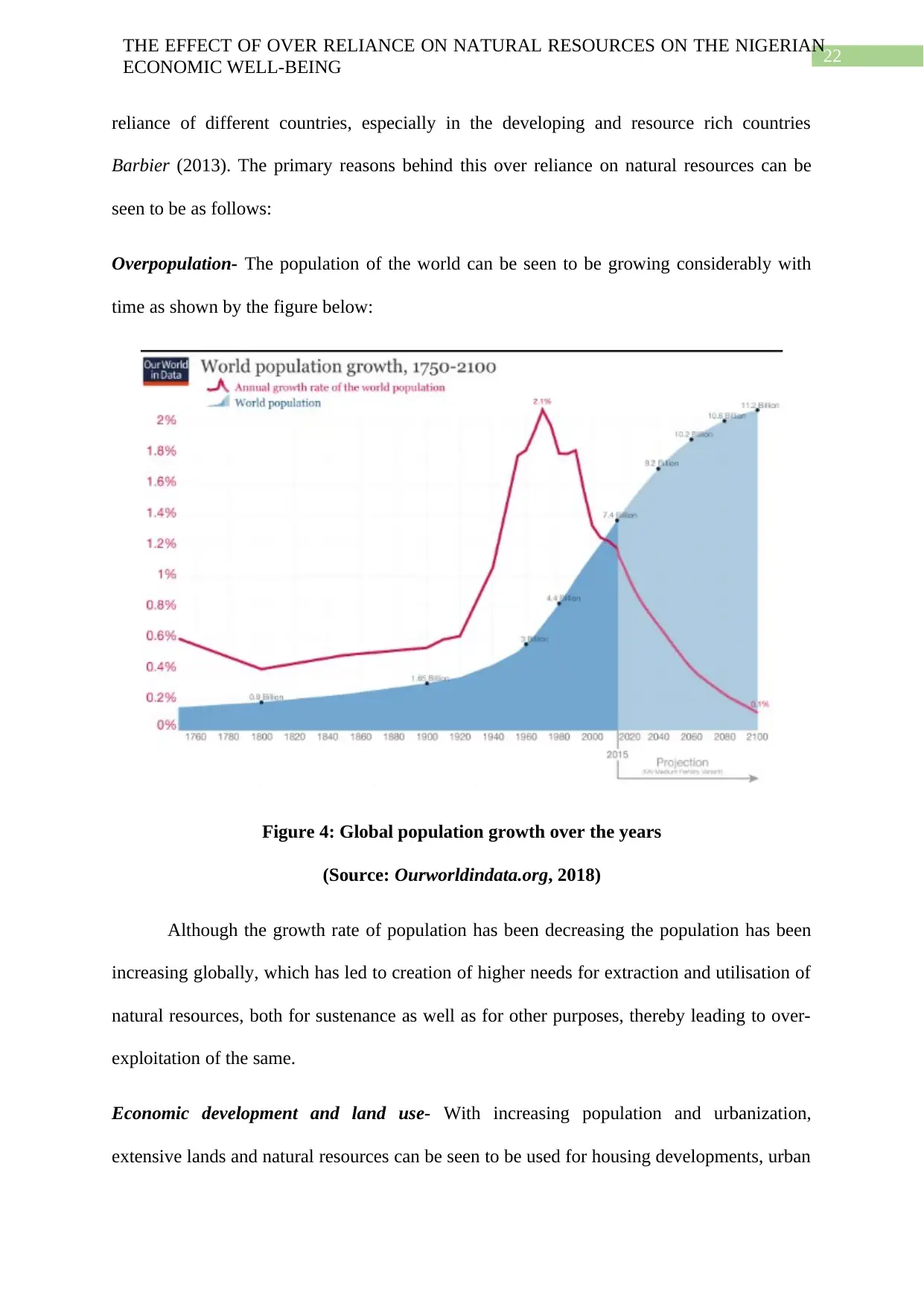
22
THE EFFECT OF OVER RELIANCE ON NATURAL RESOURCES ON THE NIGERIAN
ECONOMIC WELL-BEING
reliance of different countries, especially in the developing and resource rich countries
Barbier (2013). The primary reasons behind this over reliance on natural resources can be
seen to be as follows:
Overpopulation- The population of the world can be seen to be growing considerably with
time as shown by the figure below:
Figure 4: Global population growth over the years
(Source: Ourworldindata.org, 2018)
Although the growth rate of population has been decreasing the population has been
increasing globally, which has led to creation of higher needs for extraction and utilisation of
natural resources, both for sustenance as well as for other purposes, thereby leading to over-
exploitation of the same.
Economic development and land use- With increasing population and urbanization,
extensive lands and natural resources can be seen to be used for housing developments, urban
THE EFFECT OF OVER RELIANCE ON NATURAL RESOURCES ON THE NIGERIAN
ECONOMIC WELL-BEING
reliance of different countries, especially in the developing and resource rich countries
Barbier (2013). The primary reasons behind this over reliance on natural resources can be
seen to be as follows:
Overpopulation- The population of the world can be seen to be growing considerably with
time as shown by the figure below:
Figure 4: Global population growth over the years
(Source: Ourworldindata.org, 2018)
Although the growth rate of population has been decreasing the population has been
increasing globally, which has led to creation of higher needs for extraction and utilisation of
natural resources, both for sustenance as well as for other purposes, thereby leading to over-
exploitation of the same.
Economic development and land use- With increasing population and urbanization,
extensive lands and natural resources can be seen to be used for housing developments, urban
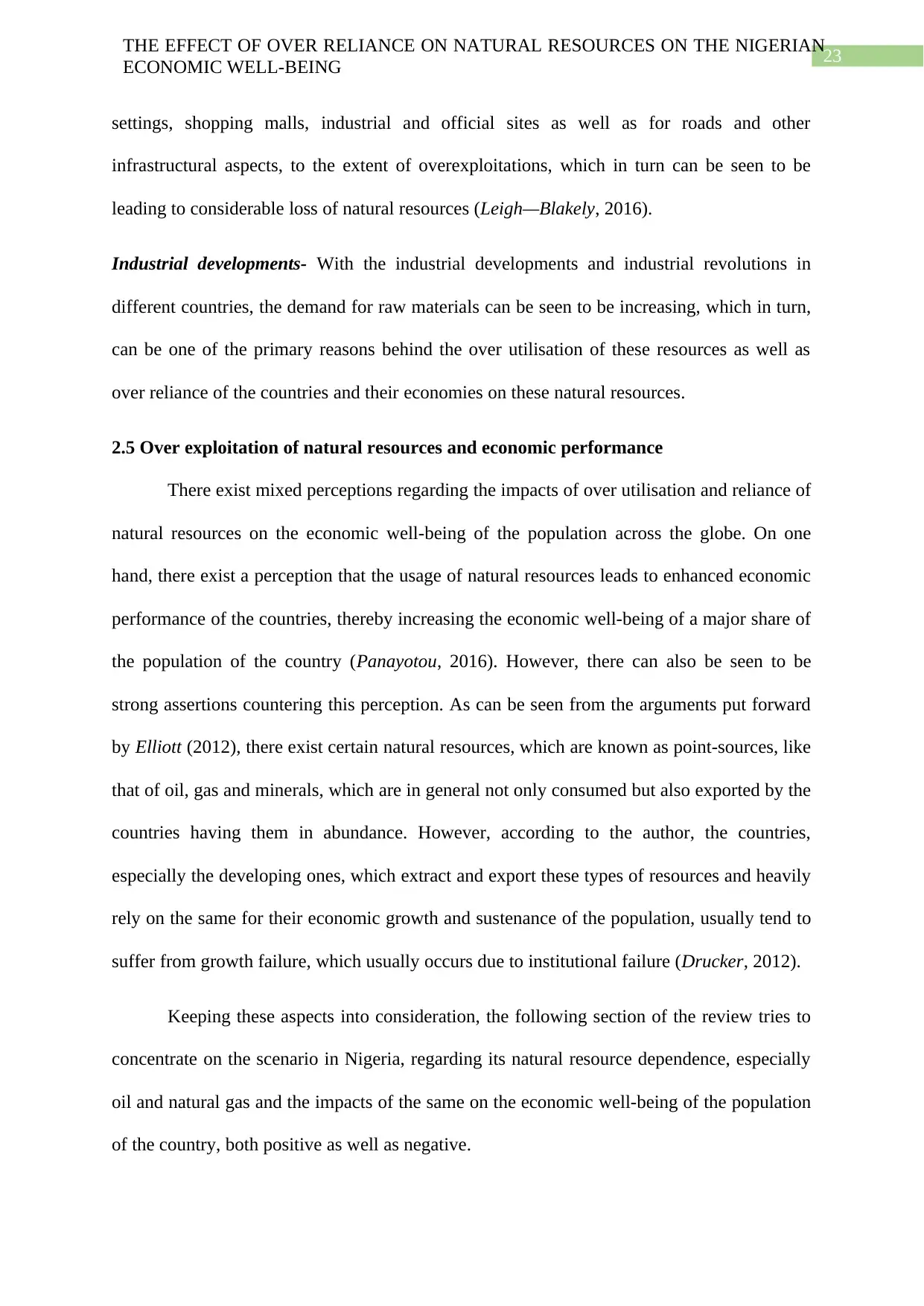
23
THE EFFECT OF OVER RELIANCE ON NATURAL RESOURCES ON THE NIGERIAN
ECONOMIC WELL-BEING
settings, shopping malls, industrial and official sites as well as for roads and other
infrastructural aspects, to the extent of overexploitations, which in turn can be seen to be
leading to considerable loss of natural resources (Leigh—Blakely, 2016).
Industrial developments- With the industrial developments and industrial revolutions in
different countries, the demand for raw materials can be seen to be increasing, which in turn,
can be one of the primary reasons behind the over utilisation of these resources as well as
over reliance of the countries and their economies on these natural resources.
2.5 Over exploitation of natural resources and economic performance
There exist mixed perceptions regarding the impacts of over utilisation and reliance of
natural resources on the economic well-being of the population across the globe. On one
hand, there exist a perception that the usage of natural resources leads to enhanced economic
performance of the countries, thereby increasing the economic well-being of a major share of
the population of the country (Panayotou, 2016). However, there can also be seen to be
strong assertions countering this perception. As can be seen from the arguments put forward
by Elliott (2012), there exist certain natural resources, which are known as point-sources, like
that of oil, gas and minerals, which are in general not only consumed but also exported by the
countries having them in abundance. However, according to the author, the countries,
especially the developing ones, which extract and export these types of resources and heavily
rely on the same for their economic growth and sustenance of the population, usually tend to
suffer from growth failure, which usually occurs due to institutional failure (Drucker, 2012).
Keeping these aspects into consideration, the following section of the review tries to
concentrate on the scenario in Nigeria, regarding its natural resource dependence, especially
oil and natural gas and the impacts of the same on the economic well-being of the population
of the country, both positive as well as negative.
THE EFFECT OF OVER RELIANCE ON NATURAL RESOURCES ON THE NIGERIAN
ECONOMIC WELL-BEING
settings, shopping malls, industrial and official sites as well as for roads and other
infrastructural aspects, to the extent of overexploitations, which in turn can be seen to be
leading to considerable loss of natural resources (Leigh—Blakely, 2016).
Industrial developments- With the industrial developments and industrial revolutions in
different countries, the demand for raw materials can be seen to be increasing, which in turn,
can be one of the primary reasons behind the over utilisation of these resources as well as
over reliance of the countries and their economies on these natural resources.
2.5 Over exploitation of natural resources and economic performance
There exist mixed perceptions regarding the impacts of over utilisation and reliance of
natural resources on the economic well-being of the population across the globe. On one
hand, there exist a perception that the usage of natural resources leads to enhanced economic
performance of the countries, thereby increasing the economic well-being of a major share of
the population of the country (Panayotou, 2016). However, there can also be seen to be
strong assertions countering this perception. As can be seen from the arguments put forward
by Elliott (2012), there exist certain natural resources, which are known as point-sources, like
that of oil, gas and minerals, which are in general not only consumed but also exported by the
countries having them in abundance. However, according to the author, the countries,
especially the developing ones, which extract and export these types of resources and heavily
rely on the same for their economic growth and sustenance of the population, usually tend to
suffer from growth failure, which usually occurs due to institutional failure (Drucker, 2012).
Keeping these aspects into consideration, the following section of the review tries to
concentrate on the scenario in Nigeria, regarding its natural resource dependence, especially
oil and natural gas and the impacts of the same on the economic well-being of the population
of the country, both positive as well as negative.
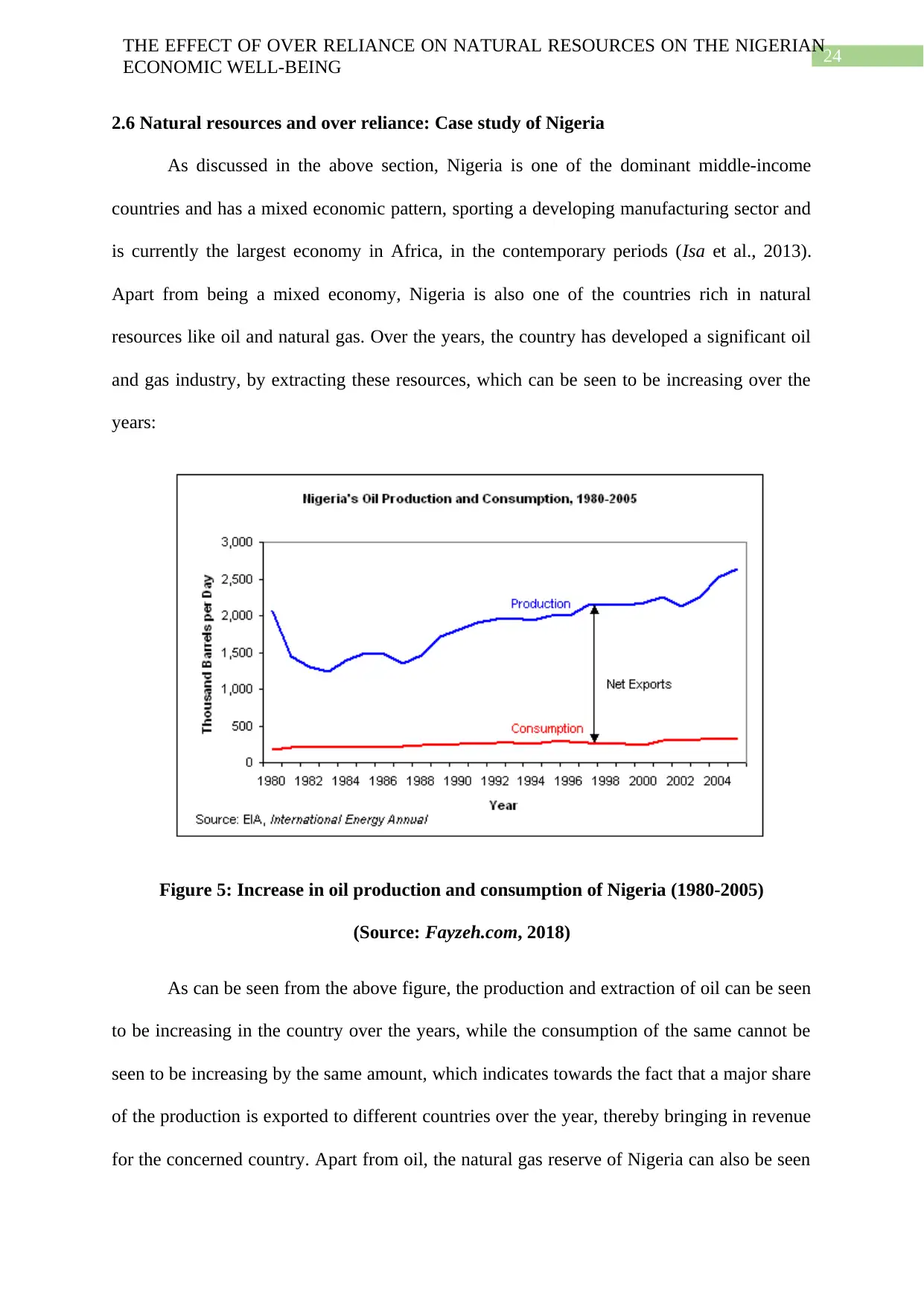
24
THE EFFECT OF OVER RELIANCE ON NATURAL RESOURCES ON THE NIGERIAN
ECONOMIC WELL-BEING
2.6 Natural resources and over reliance: Case study of Nigeria
As discussed in the above section, Nigeria is one of the dominant middle-income
countries and has a mixed economic pattern, sporting a developing manufacturing sector and
is currently the largest economy in Africa, in the contemporary periods (Isa et al., 2013).
Apart from being a mixed economy, Nigeria is also one of the countries rich in natural
resources like oil and natural gas. Over the years, the country has developed a significant oil
and gas industry, by extracting these resources, which can be seen to be increasing over the
years:
Figure 5: Increase in oil production and consumption of Nigeria (1980-2005)
(Source: Fayzeh.com, 2018)
As can be seen from the above figure, the production and extraction of oil can be seen
to be increasing in the country over the years, while the consumption of the same cannot be
seen to be increasing by the same amount, which indicates towards the fact that a major share
of the production is exported to different countries over the year, thereby bringing in revenue
for the concerned country. Apart from oil, the natural gas reserve of Nigeria can also be seen
THE EFFECT OF OVER RELIANCE ON NATURAL RESOURCES ON THE NIGERIAN
ECONOMIC WELL-BEING
2.6 Natural resources and over reliance: Case study of Nigeria
As discussed in the above section, Nigeria is one of the dominant middle-income
countries and has a mixed economic pattern, sporting a developing manufacturing sector and
is currently the largest economy in Africa, in the contemporary periods (Isa et al., 2013).
Apart from being a mixed economy, Nigeria is also one of the countries rich in natural
resources like oil and natural gas. Over the years, the country has developed a significant oil
and gas industry, by extracting these resources, which can be seen to be increasing over the
years:
Figure 5: Increase in oil production and consumption of Nigeria (1980-2005)
(Source: Fayzeh.com, 2018)
As can be seen from the above figure, the production and extraction of oil can be seen
to be increasing in the country over the years, while the consumption of the same cannot be
seen to be increasing by the same amount, which indicates towards the fact that a major share
of the production is exported to different countries over the year, thereby bringing in revenue
for the concerned country. Apart from oil, the natural gas reserve of Nigeria can also be seen
Paraphrase This Document
Need a fresh take? Get an instant paraphrase of this document with our AI Paraphraser
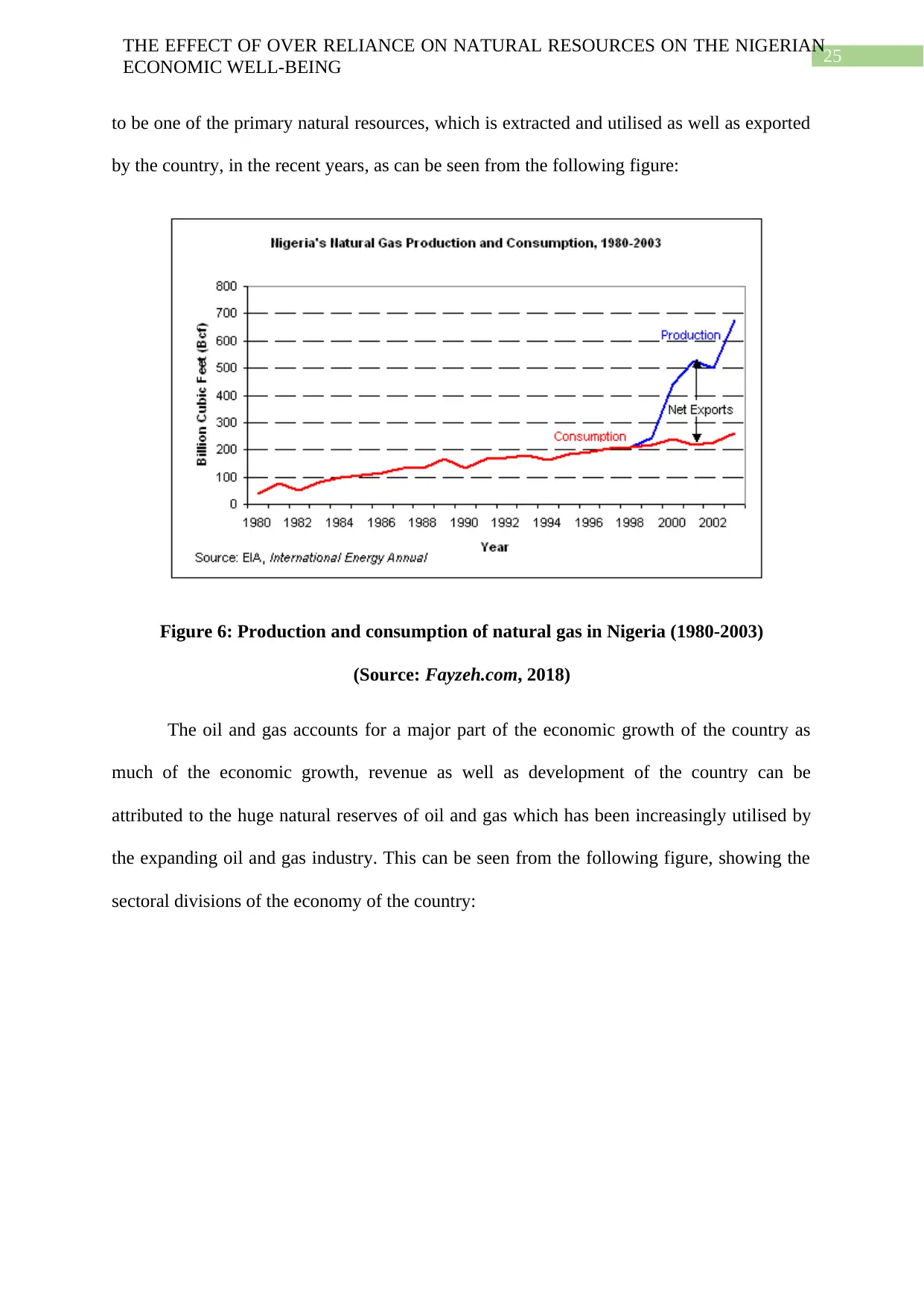
25
THE EFFECT OF OVER RELIANCE ON NATURAL RESOURCES ON THE NIGERIAN
ECONOMIC WELL-BEING
to be one of the primary natural resources, which is extracted and utilised as well as exported
by the country, in the recent years, as can be seen from the following figure:
Figure 6: Production and consumption of natural gas in Nigeria (1980-2003)
(Source: Fayzeh.com, 2018)
The oil and gas accounts for a major part of the economic growth of the country as
much of the economic growth, revenue as well as development of the country can be
attributed to the huge natural reserves of oil and gas which has been increasingly utilised by
the expanding oil and gas industry. This can be seen from the following figure, showing the
sectoral divisions of the economy of the country:
THE EFFECT OF OVER RELIANCE ON NATURAL RESOURCES ON THE NIGERIAN
ECONOMIC WELL-BEING
to be one of the primary natural resources, which is extracted and utilised as well as exported
by the country, in the recent years, as can be seen from the following figure:
Figure 6: Production and consumption of natural gas in Nigeria (1980-2003)
(Source: Fayzeh.com, 2018)
The oil and gas accounts for a major part of the economic growth of the country as
much of the economic growth, revenue as well as development of the country can be
attributed to the huge natural reserves of oil and gas which has been increasingly utilised by
the expanding oil and gas industry. This can be seen from the following figure, showing the
sectoral divisions of the economy of the country:
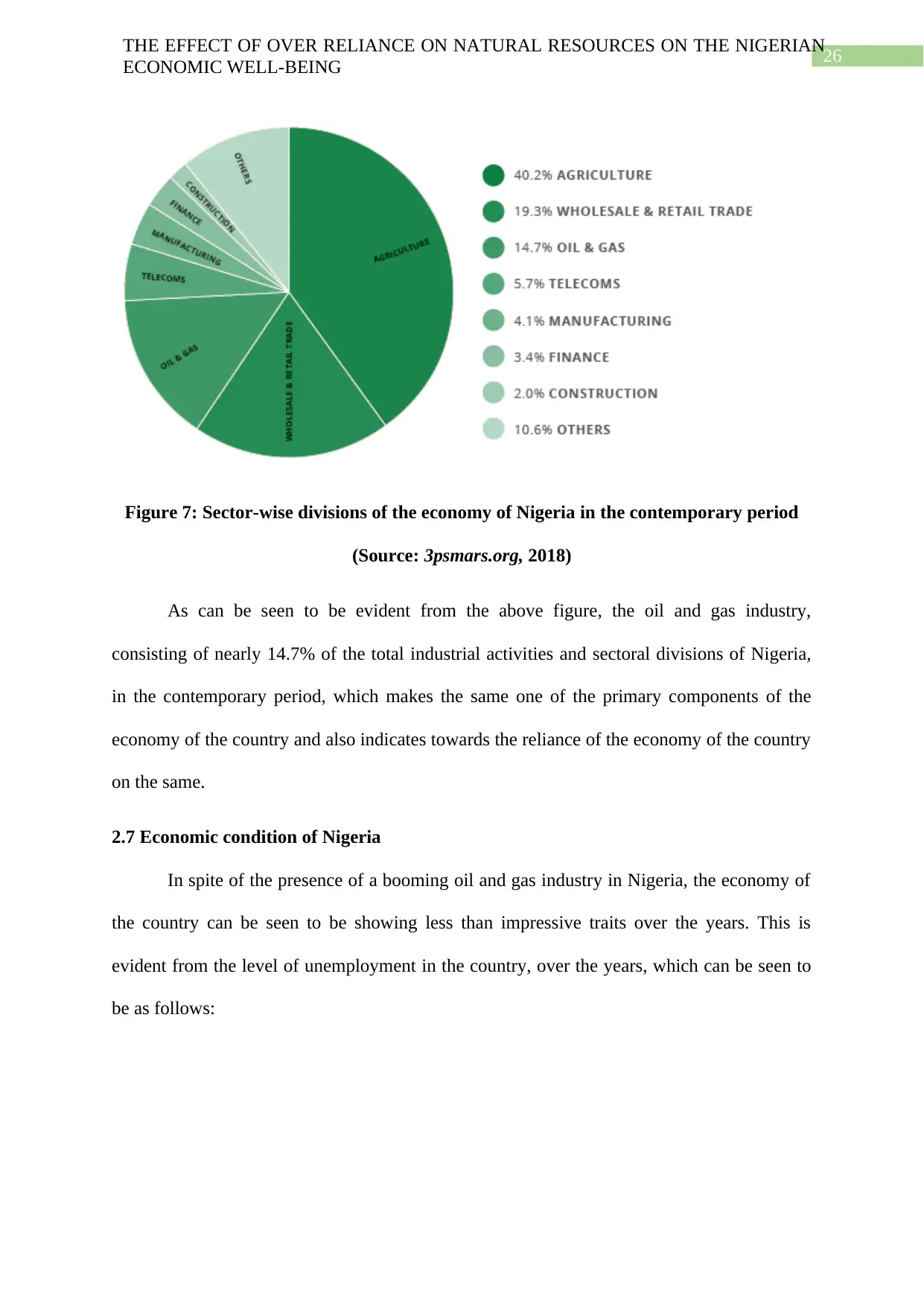
26
THE EFFECT OF OVER RELIANCE ON NATURAL RESOURCES ON THE NIGERIAN
ECONOMIC WELL-BEING
Figure 7: Sector-wise divisions of the economy of Nigeria in the contemporary period
(Source: 3psmars.org, 2018)
As can be seen to be evident from the above figure, the oil and gas industry,
consisting of nearly 14.7% of the total industrial activities and sectoral divisions of Nigeria,
in the contemporary period, which makes the same one of the primary components of the
economy of the country and also indicates towards the reliance of the economy of the country
on the same.
2.7 Economic condition of Nigeria
In spite of the presence of a booming oil and gas industry in Nigeria, the economy of
the country can be seen to be showing less than impressive traits over the years. This is
evident from the level of unemployment in the country, over the years, which can be seen to
be as follows:
THE EFFECT OF OVER RELIANCE ON NATURAL RESOURCES ON THE NIGERIAN
ECONOMIC WELL-BEING
Figure 7: Sector-wise divisions of the economy of Nigeria in the contemporary period
(Source: 3psmars.org, 2018)
As can be seen to be evident from the above figure, the oil and gas industry,
consisting of nearly 14.7% of the total industrial activities and sectoral divisions of Nigeria,
in the contemporary period, which makes the same one of the primary components of the
economy of the country and also indicates towards the reliance of the economy of the country
on the same.
2.7 Economic condition of Nigeria
In spite of the presence of a booming oil and gas industry in Nigeria, the economy of
the country can be seen to be showing less than impressive traits over the years. This is
evident from the level of unemployment in the country, over the years, which can be seen to
be as follows:
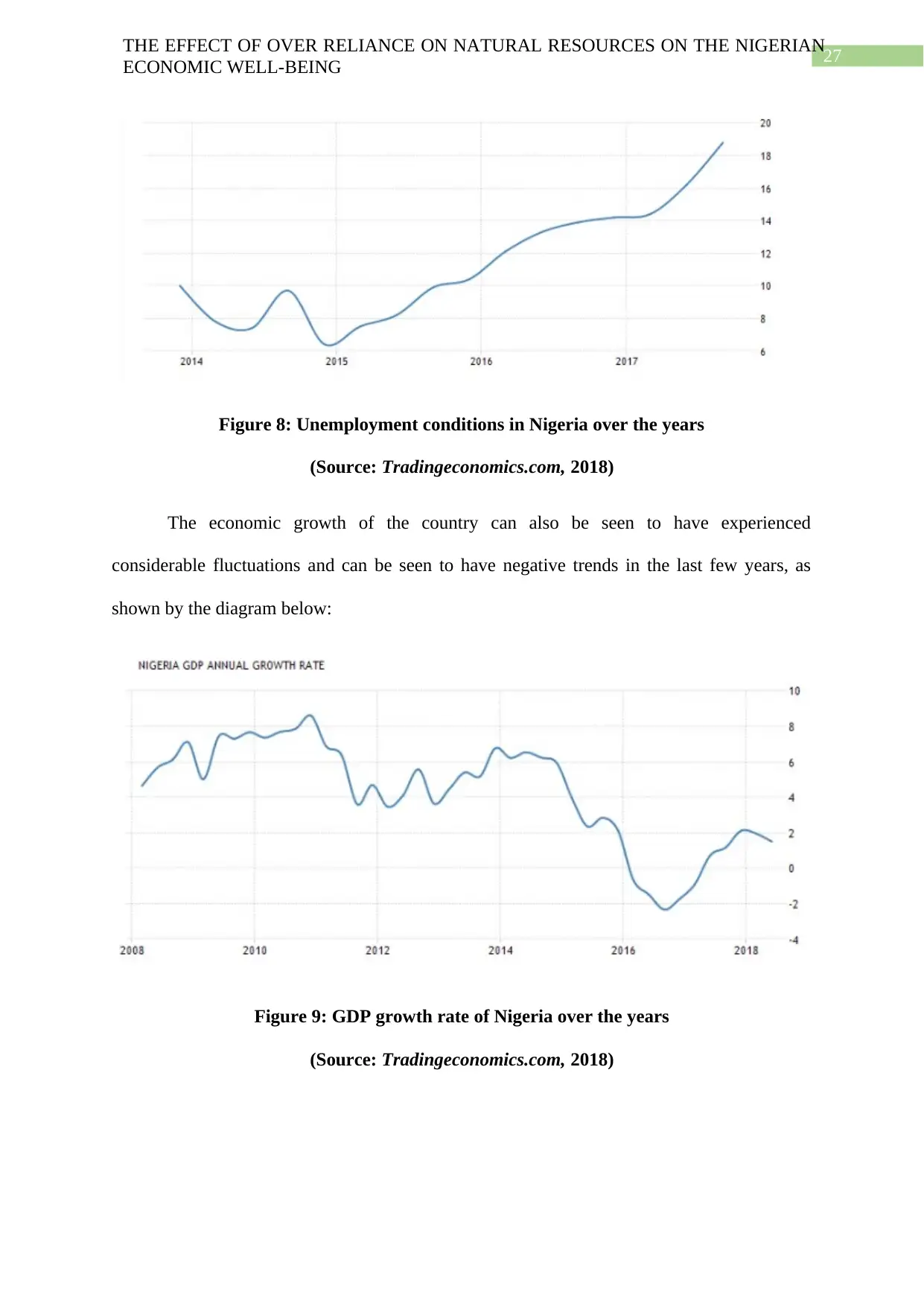
27
THE EFFECT OF OVER RELIANCE ON NATURAL RESOURCES ON THE NIGERIAN
ECONOMIC WELL-BEING
Figure 8: Unemployment conditions in Nigeria over the years
(Source: Tradingeconomics.com, 2018)
The economic growth of the country can also be seen to have experienced
considerable fluctuations and can be seen to have negative trends in the last few years, as
shown by the diagram below:
Figure 9: GDP growth rate of Nigeria over the years
(Source: Tradingeconomics.com, 2018)
THE EFFECT OF OVER RELIANCE ON NATURAL RESOURCES ON THE NIGERIAN
ECONOMIC WELL-BEING
Figure 8: Unemployment conditions in Nigeria over the years
(Source: Tradingeconomics.com, 2018)
The economic growth of the country can also be seen to have experienced
considerable fluctuations and can be seen to have negative trends in the last few years, as
shown by the diagram below:
Figure 9: GDP growth rate of Nigeria over the years
(Source: Tradingeconomics.com, 2018)
Secure Best Marks with AI Grader
Need help grading? Try our AI Grader for instant feedback on your assignments.
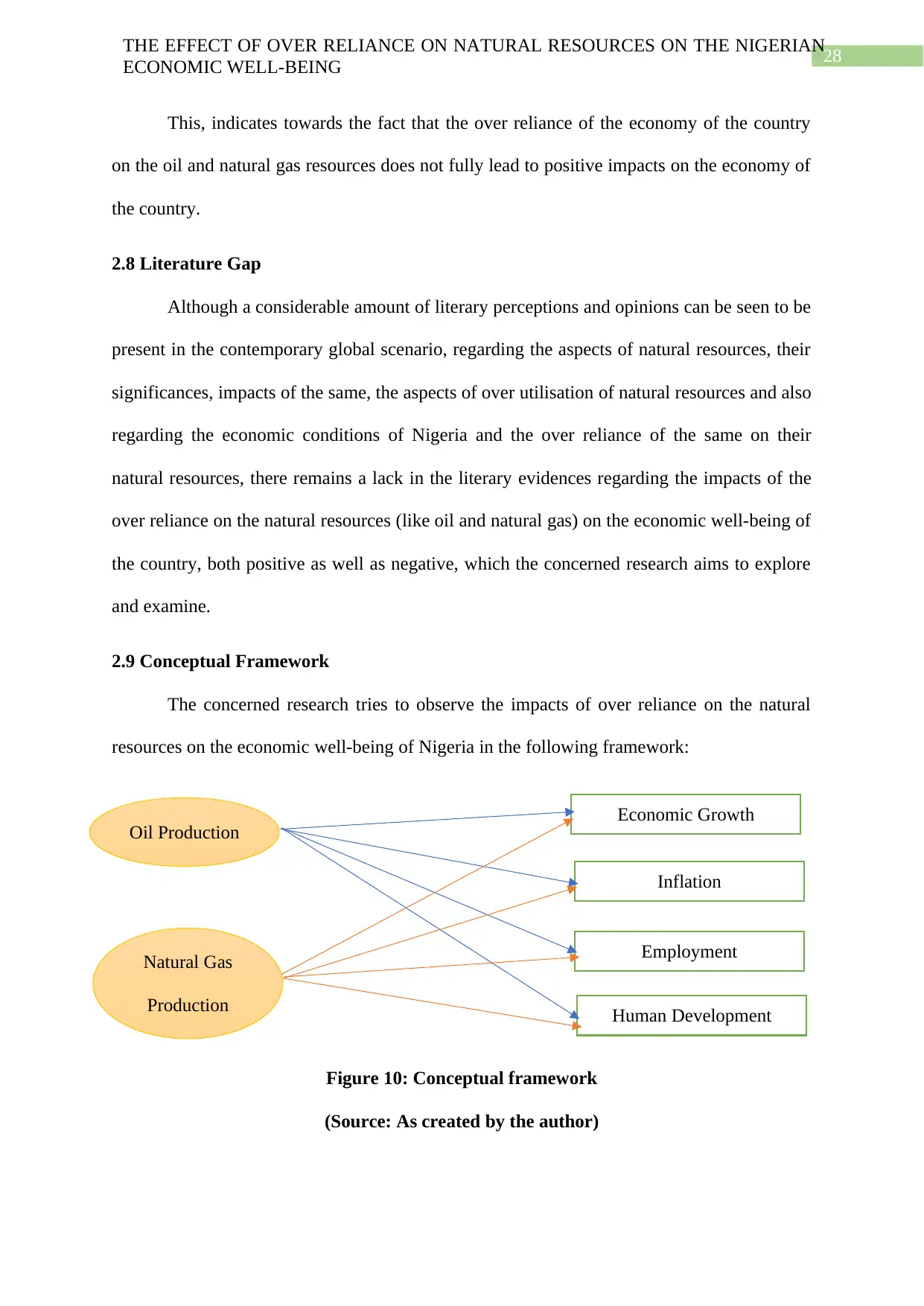
28
THE EFFECT OF OVER RELIANCE ON NATURAL RESOURCES ON THE NIGERIAN
ECONOMIC WELL-BEING
This, indicates towards the fact that the over reliance of the economy of the country
on the oil and natural gas resources does not fully lead to positive impacts on the economy of
the country.
2.8 Literature Gap
Although a considerable amount of literary perceptions and opinions can be seen to be
present in the contemporary global scenario, regarding the aspects of natural resources, their
significances, impacts of the same, the aspects of over utilisation of natural resources and also
regarding the economic conditions of Nigeria and the over reliance of the same on their
natural resources, there remains a lack in the literary evidences regarding the impacts of the
over reliance on the natural resources (like oil and natural gas) on the economic well-being of
the country, both positive as well as negative, which the concerned research aims to explore
and examine.
2.9 Conceptual Framework
The concerned research tries to observe the impacts of over reliance on the natural
resources on the economic well-being of Nigeria in the following framework:
Figure 10: Conceptual framework
(Source: As created by the author)
Oil Production Economic Growth
Inflation
Employment
Human Development
Natural Gas
Production
THE EFFECT OF OVER RELIANCE ON NATURAL RESOURCES ON THE NIGERIAN
ECONOMIC WELL-BEING
This, indicates towards the fact that the over reliance of the economy of the country
on the oil and natural gas resources does not fully lead to positive impacts on the economy of
the country.
2.8 Literature Gap
Although a considerable amount of literary perceptions and opinions can be seen to be
present in the contemporary global scenario, regarding the aspects of natural resources, their
significances, impacts of the same, the aspects of over utilisation of natural resources and also
regarding the economic conditions of Nigeria and the over reliance of the same on their
natural resources, there remains a lack in the literary evidences regarding the impacts of the
over reliance on the natural resources (like oil and natural gas) on the economic well-being of
the country, both positive as well as negative, which the concerned research aims to explore
and examine.
2.9 Conceptual Framework
The concerned research tries to observe the impacts of over reliance on the natural
resources on the economic well-being of Nigeria in the following framework:
Figure 10: Conceptual framework
(Source: As created by the author)
Oil Production Economic Growth
Inflation
Employment
Human Development
Natural Gas
Production
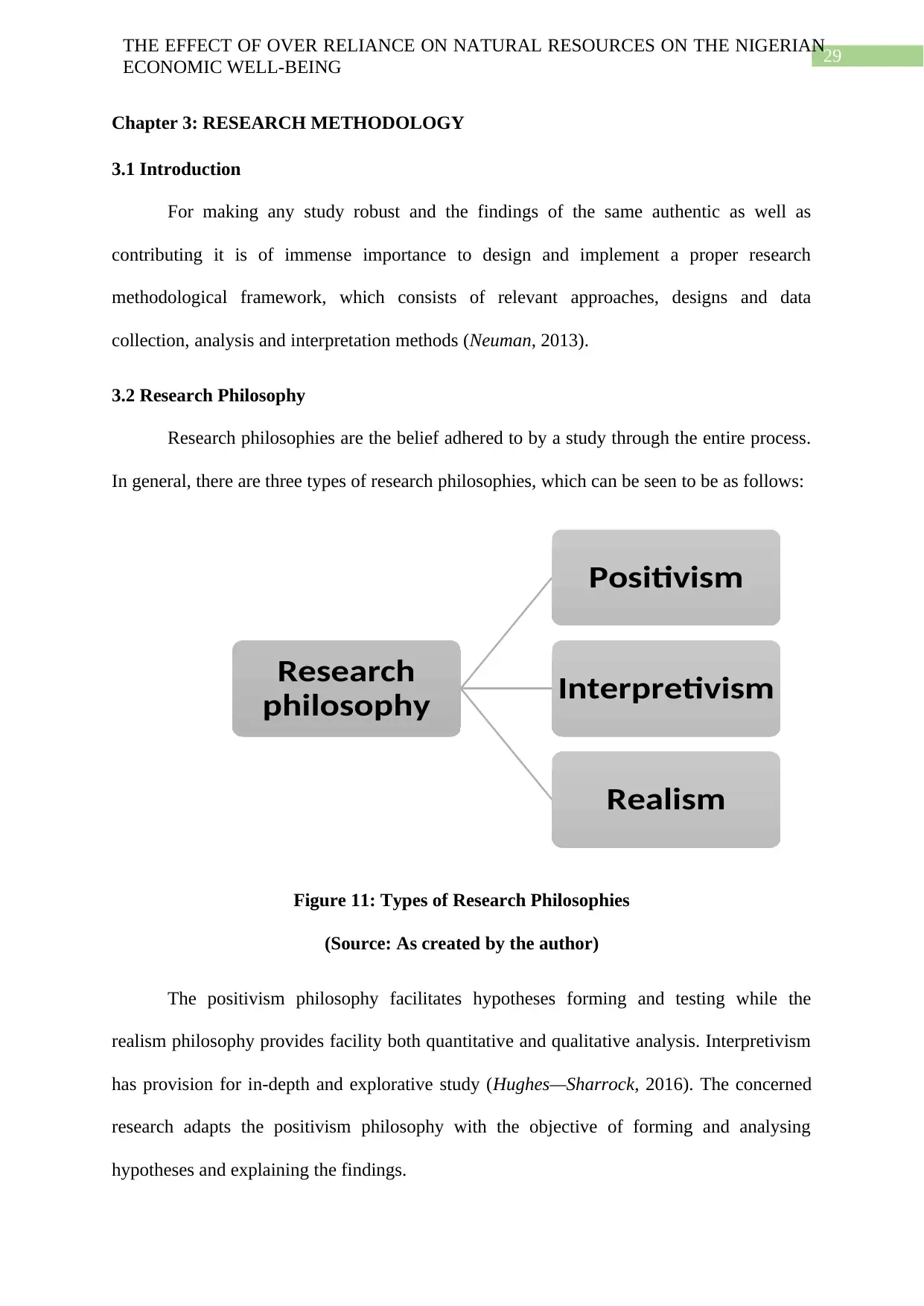
29
THE EFFECT OF OVER RELIANCE ON NATURAL RESOURCES ON THE NIGERIAN
ECONOMIC WELL-BEING
Chapter 3: RESEARCH METHODOLOGY
3.1 Introduction
For making any study robust and the findings of the same authentic as well as
contributing it is of immense importance to design and implement a proper research
methodological framework, which consists of relevant approaches, designs and data
collection, analysis and interpretation methods (Neuman, 2013).
3.2 Research Philosophy
Research philosophies are the belief adhered to by a study through the entire process.
In general, there are three types of research philosophies, which can be seen to be as follows:
Figure 11: Types of Research Philosophies
(Source: As created by the author)
The positivism philosophy facilitates hypotheses forming and testing while the
realism philosophy provides facility both quantitative and qualitative analysis. Interpretivism
has provision for in-depth and explorative study (Hughes—Sharrock, 2016). The concerned
research adapts the positivism philosophy with the objective of forming and analysing
hypotheses and explaining the findings.
Research
philosophy
Positivism
Interpretivism
Realism
THE EFFECT OF OVER RELIANCE ON NATURAL RESOURCES ON THE NIGERIAN
ECONOMIC WELL-BEING
Chapter 3: RESEARCH METHODOLOGY
3.1 Introduction
For making any study robust and the findings of the same authentic as well as
contributing it is of immense importance to design and implement a proper research
methodological framework, which consists of relevant approaches, designs and data
collection, analysis and interpretation methods (Neuman, 2013).
3.2 Research Philosophy
Research philosophies are the belief adhered to by a study through the entire process.
In general, there are three types of research philosophies, which can be seen to be as follows:
Figure 11: Types of Research Philosophies
(Source: As created by the author)
The positivism philosophy facilitates hypotheses forming and testing while the
realism philosophy provides facility both quantitative and qualitative analysis. Interpretivism
has provision for in-depth and explorative study (Hughes—Sharrock, 2016). The concerned
research adapts the positivism philosophy with the objective of forming and analysing
hypotheses and explaining the findings.
Research
philosophy
Positivism
Interpretivism
Realism
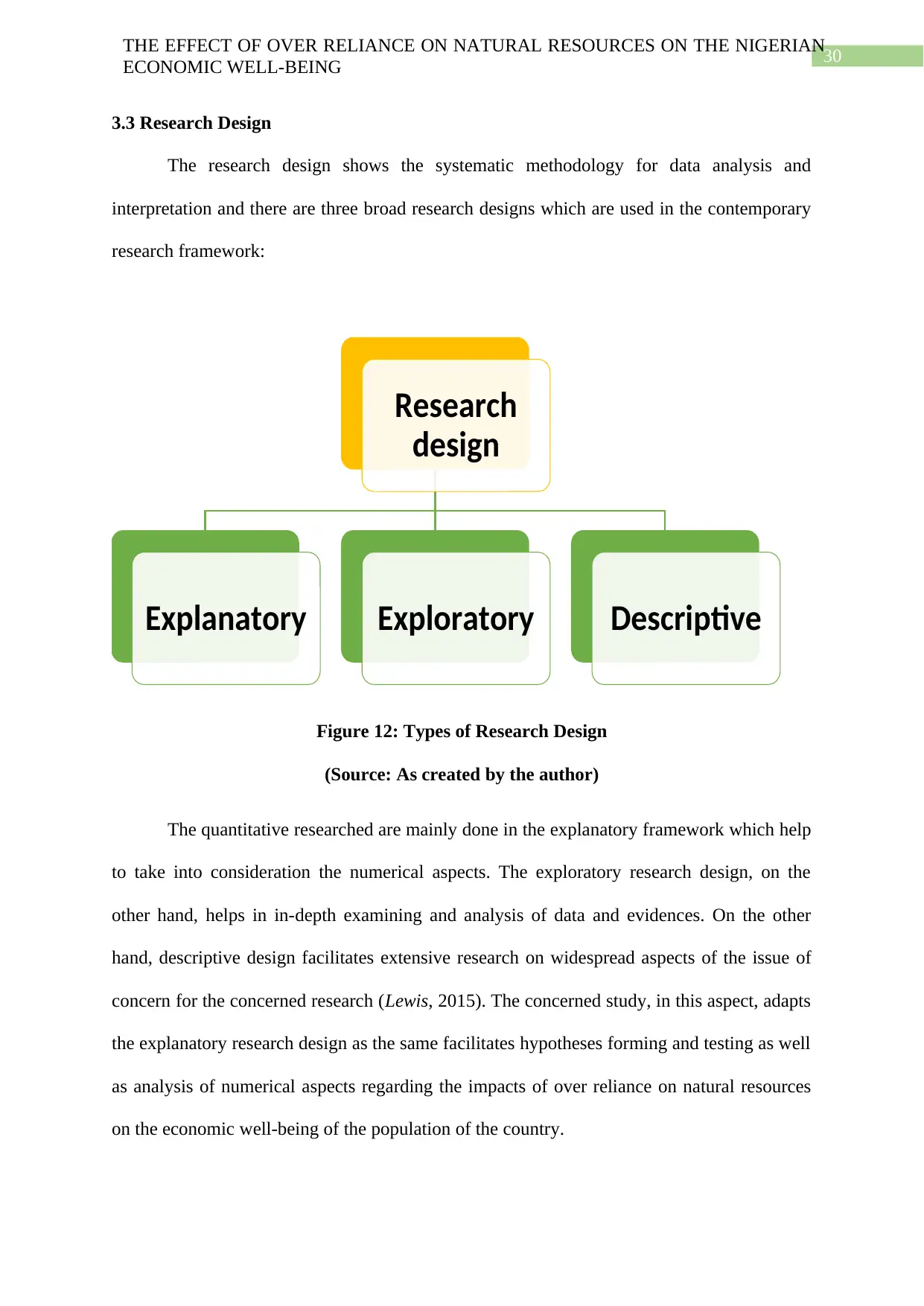
30
THE EFFECT OF OVER RELIANCE ON NATURAL RESOURCES ON THE NIGERIAN
ECONOMIC WELL-BEING
3.3 Research Design
The research design shows the systematic methodology for data analysis and
interpretation and there are three broad research designs which are used in the contemporary
research framework:
Figure 12: Types of Research Design
(Source: As created by the author)
The quantitative researched are mainly done in the explanatory framework which help
to take into consideration the numerical aspects. The exploratory research design, on the
other hand, helps in in-depth examining and analysis of data and evidences. On the other
hand, descriptive design facilitates extensive research on widespread aspects of the issue of
concern for the concerned research (Lewis, 2015). The concerned study, in this aspect, adapts
the explanatory research design as the same facilitates hypotheses forming and testing as well
as analysis of numerical aspects regarding the impacts of over reliance on natural resources
on the economic well-being of the population of the country.
Research
design
Explanatory Exploratory Descriptive
THE EFFECT OF OVER RELIANCE ON NATURAL RESOURCES ON THE NIGERIAN
ECONOMIC WELL-BEING
3.3 Research Design
The research design shows the systematic methodology for data analysis and
interpretation and there are three broad research designs which are used in the contemporary
research framework:
Figure 12: Types of Research Design
(Source: As created by the author)
The quantitative researched are mainly done in the explanatory framework which help
to take into consideration the numerical aspects. The exploratory research design, on the
other hand, helps in in-depth examining and analysis of data and evidences. On the other
hand, descriptive design facilitates extensive research on widespread aspects of the issue of
concern for the concerned research (Lewis, 2015). The concerned study, in this aspect, adapts
the explanatory research design as the same facilitates hypotheses forming and testing as well
as analysis of numerical aspects regarding the impacts of over reliance on natural resources
on the economic well-being of the population of the country.
Research
design
Explanatory Exploratory Descriptive
Paraphrase This Document
Need a fresh take? Get an instant paraphrase of this document with our AI Paraphraser
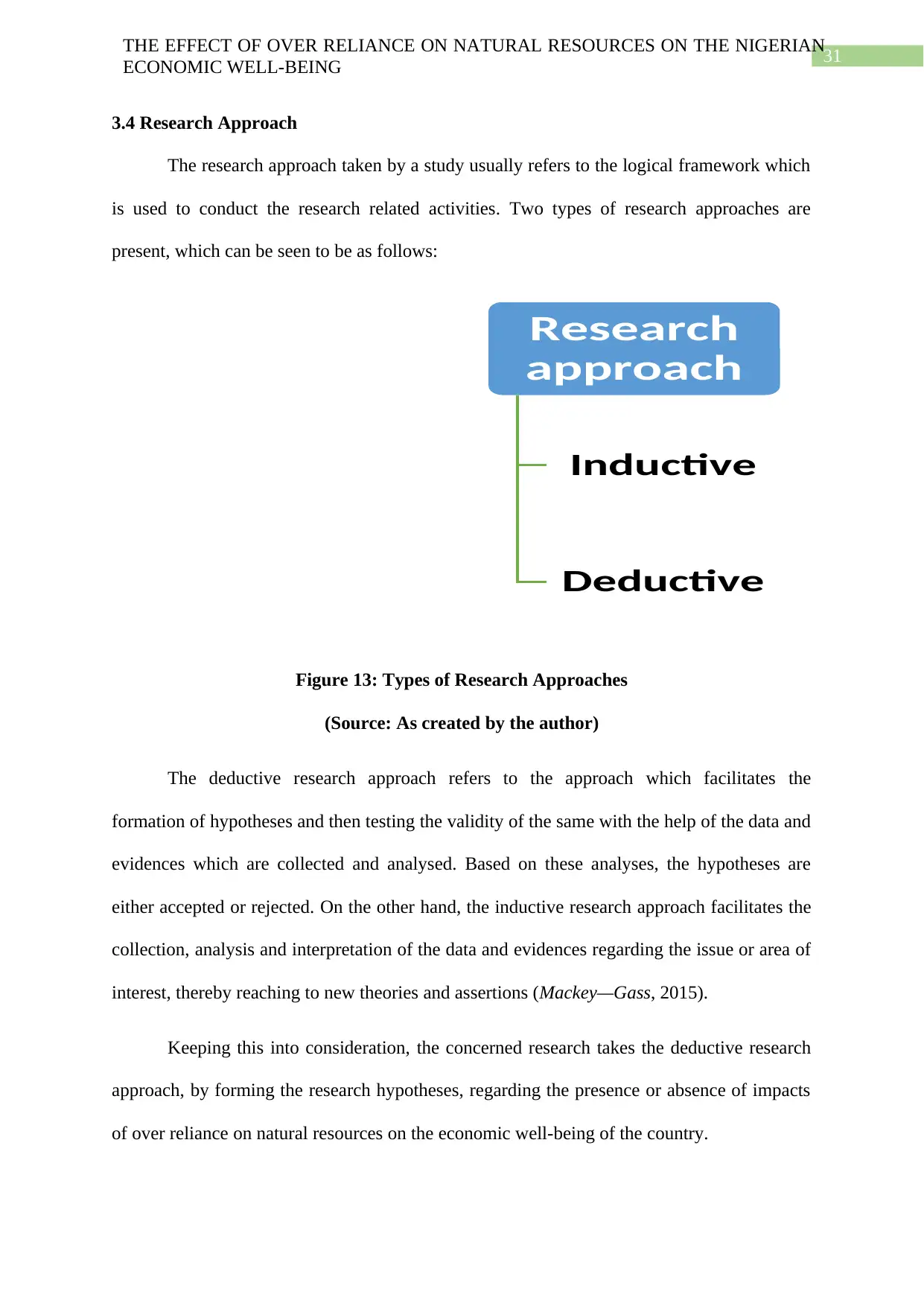
31
THE EFFECT OF OVER RELIANCE ON NATURAL RESOURCES ON THE NIGERIAN
ECONOMIC WELL-BEING
3.4 Research Approach
The research approach taken by a study usually refers to the logical framework which
is used to conduct the research related activities. Two types of research approaches are
present, which can be seen to be as follows:
Figure 13: Types of Research Approaches
(Source: As created by the author)
The deductive research approach refers to the approach which facilitates the
formation of hypotheses and then testing the validity of the same with the help of the data and
evidences which are collected and analysed. Based on these analyses, the hypotheses are
either accepted or rejected. On the other hand, the inductive research approach facilitates the
collection, analysis and interpretation of the data and evidences regarding the issue or area of
interest, thereby reaching to new theories and assertions (Mackey—Gass, 2015).
Keeping this into consideration, the concerned research takes the deductive research
approach, by forming the research hypotheses, regarding the presence or absence of impacts
of over reliance on natural resources on the economic well-being of the country.
Research
approach
Inductive
Deductive
THE EFFECT OF OVER RELIANCE ON NATURAL RESOURCES ON THE NIGERIAN
ECONOMIC WELL-BEING
3.4 Research Approach
The research approach taken by a study usually refers to the logical framework which
is used to conduct the research related activities. Two types of research approaches are
present, which can be seen to be as follows:
Figure 13: Types of Research Approaches
(Source: As created by the author)
The deductive research approach refers to the approach which facilitates the
formation of hypotheses and then testing the validity of the same with the help of the data and
evidences which are collected and analysed. Based on these analyses, the hypotheses are
either accepted or rejected. On the other hand, the inductive research approach facilitates the
collection, analysis and interpretation of the data and evidences regarding the issue or area of
interest, thereby reaching to new theories and assertions (Mackey—Gass, 2015).
Keeping this into consideration, the concerned research takes the deductive research
approach, by forming the research hypotheses, regarding the presence or absence of impacts
of over reliance on natural resources on the economic well-being of the country.
Research
approach
Inductive
Deductive
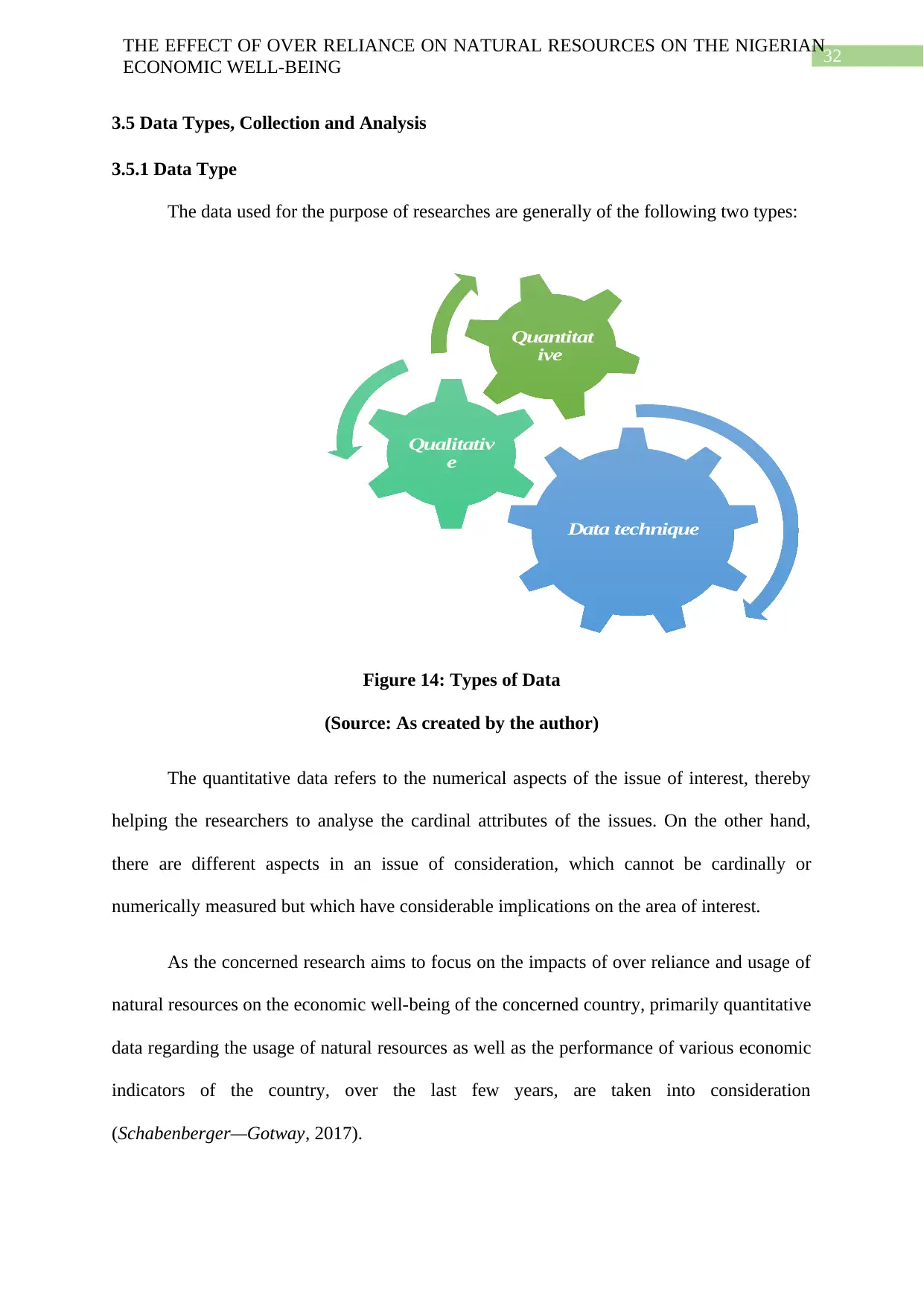
32
THE EFFECT OF OVER RELIANCE ON NATURAL RESOURCES ON THE NIGERIAN
ECONOMIC WELL-BEING
3.5 Data Types, Collection and Analysis
3.5.1 Data Type
The data used for the purpose of researches are generally of the following two types:
Figure 14: Types of Data
(Source: As created by the author)
The quantitative data refers to the numerical aspects of the issue of interest, thereby
helping the researchers to analyse the cardinal attributes of the issues. On the other hand,
there are different aspects in an issue of consideration, which cannot be cardinally or
numerically measured but which have considerable implications on the area of interest.
As the concerned research aims to focus on the impacts of over reliance and usage of
natural resources on the economic well-being of the concerned country, primarily quantitative
data regarding the usage of natural resources as well as the performance of various economic
indicators of the country, over the last few years, are taken into consideration
(Schabenberger—Gotway, 2017).
Data technique
Qualitativ
e
Quantitat
ive
THE EFFECT OF OVER RELIANCE ON NATURAL RESOURCES ON THE NIGERIAN
ECONOMIC WELL-BEING
3.5 Data Types, Collection and Analysis
3.5.1 Data Type
The data used for the purpose of researches are generally of the following two types:
Figure 14: Types of Data
(Source: As created by the author)
The quantitative data refers to the numerical aspects of the issue of interest, thereby
helping the researchers to analyse the cardinal attributes of the issues. On the other hand,
there are different aspects in an issue of consideration, which cannot be cardinally or
numerically measured but which have considerable implications on the area of interest.
As the concerned research aims to focus on the impacts of over reliance and usage of
natural resources on the economic well-being of the concerned country, primarily quantitative
data regarding the usage of natural resources as well as the performance of various economic
indicators of the country, over the last few years, are taken into consideration
(Schabenberger—Gotway, 2017).
Data technique
Qualitativ
e
Quantitat
ive
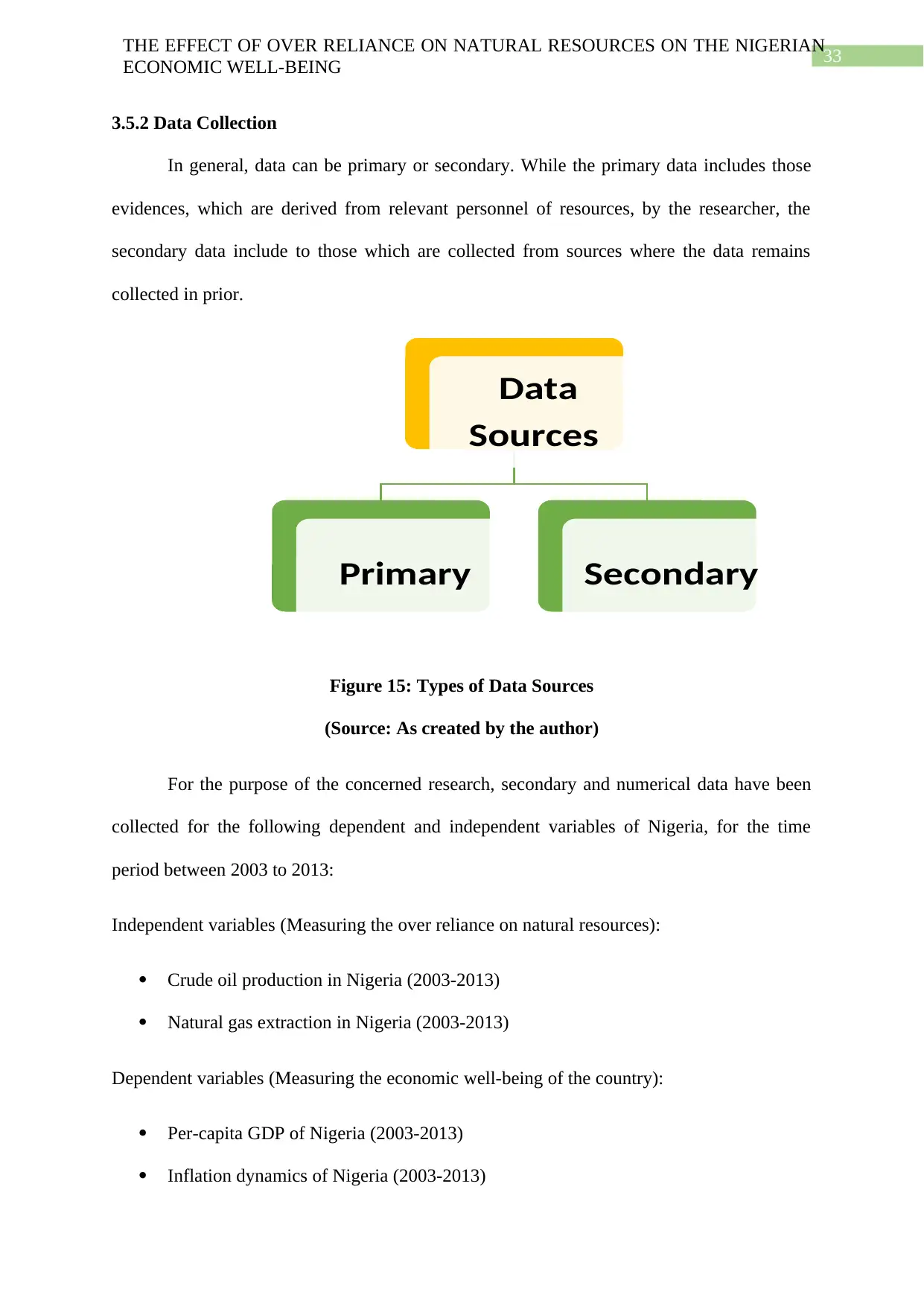
33
THE EFFECT OF OVER RELIANCE ON NATURAL RESOURCES ON THE NIGERIAN
ECONOMIC WELL-BEING
3.5.2 Data Collection
In general, data can be primary or secondary. While the primary data includes those
evidences, which are derived from relevant personnel of resources, by the researcher, the
secondary data include to those which are collected from sources where the data remains
collected in prior.
Figure 15: Types of Data Sources
(Source: As created by the author)
For the purpose of the concerned research, secondary and numerical data have been
collected for the following dependent and independent variables of Nigeria, for the time
period between 2003 to 2013:
Independent variables (Measuring the over reliance on natural resources):
Crude oil production in Nigeria (2003-2013)
Natural gas extraction in Nigeria (2003-2013)
Dependent variables (Measuring the economic well-being of the country):
Per-capita GDP of Nigeria (2003-2013)
Inflation dynamics of Nigeria (2003-2013)
Data
Sources
Primary Secondary
THE EFFECT OF OVER RELIANCE ON NATURAL RESOURCES ON THE NIGERIAN
ECONOMIC WELL-BEING
3.5.2 Data Collection
In general, data can be primary or secondary. While the primary data includes those
evidences, which are derived from relevant personnel of resources, by the researcher, the
secondary data include to those which are collected from sources where the data remains
collected in prior.
Figure 15: Types of Data Sources
(Source: As created by the author)
For the purpose of the concerned research, secondary and numerical data have been
collected for the following dependent and independent variables of Nigeria, for the time
period between 2003 to 2013:
Independent variables (Measuring the over reliance on natural resources):
Crude oil production in Nigeria (2003-2013)
Natural gas extraction in Nigeria (2003-2013)
Dependent variables (Measuring the economic well-being of the country):
Per-capita GDP of Nigeria (2003-2013)
Inflation dynamics of Nigeria (2003-2013)
Data
Sources
Primary Secondary
Secure Best Marks with AI Grader
Need help grading? Try our AI Grader for instant feedback on your assignments.
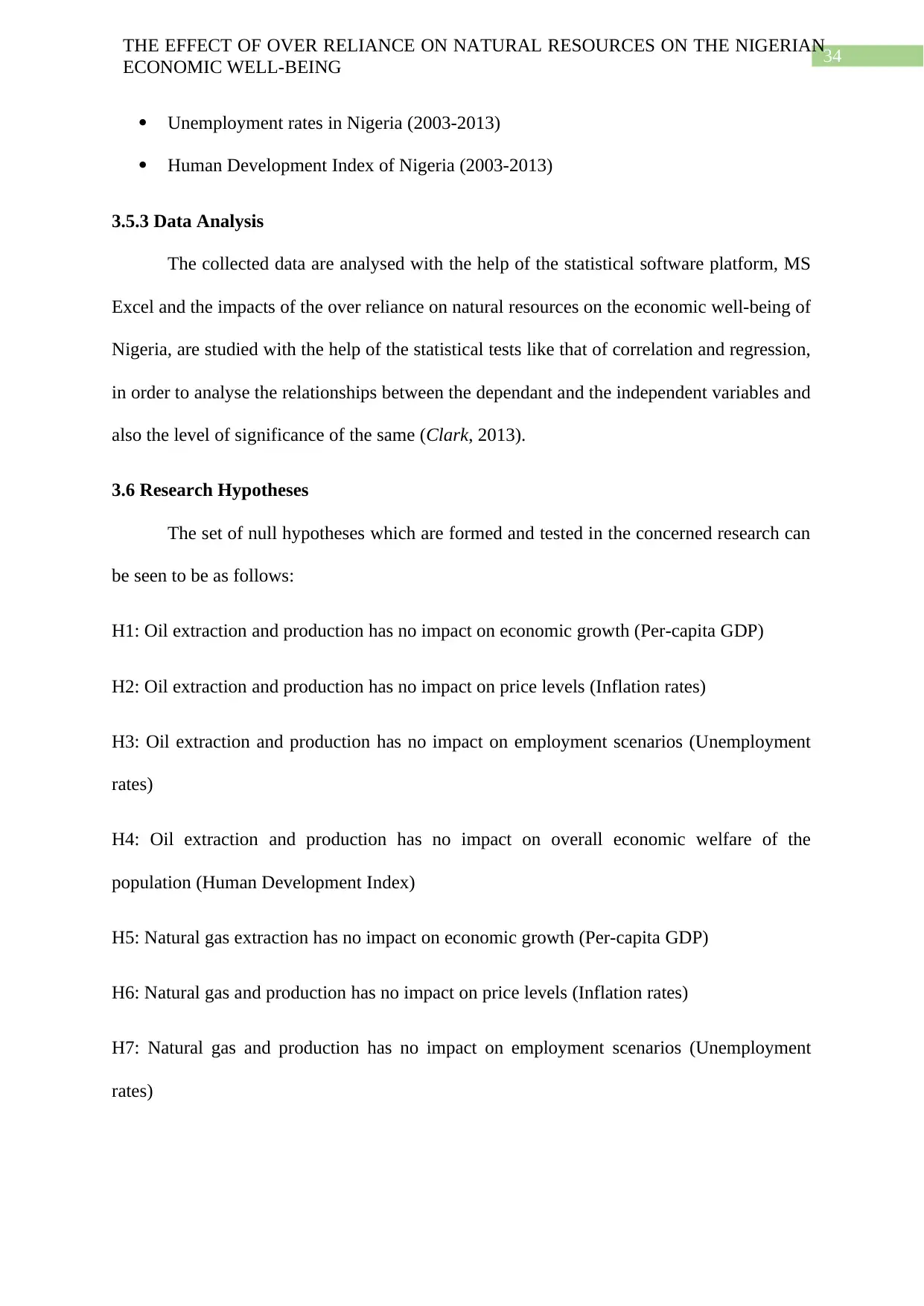
34
THE EFFECT OF OVER RELIANCE ON NATURAL RESOURCES ON THE NIGERIAN
ECONOMIC WELL-BEING
Unemployment rates in Nigeria (2003-2013)
Human Development Index of Nigeria (2003-2013)
3.5.3 Data Analysis
The collected data are analysed with the help of the statistical software platform, MS
Excel and the impacts of the over reliance on natural resources on the economic well-being of
Nigeria, are studied with the help of the statistical tests like that of correlation and regression,
in order to analyse the relationships between the dependant and the independent variables and
also the level of significance of the same (Clark, 2013).
3.6 Research Hypotheses
The set of null hypotheses which are formed and tested in the concerned research can
be seen to be as follows:
H1: Oil extraction and production has no impact on economic growth (Per-capita GDP)
H2: Oil extraction and production has no impact on price levels (Inflation rates)
H3: Oil extraction and production has no impact on employment scenarios (Unemployment
rates)
H4: Oil extraction and production has no impact on overall economic welfare of the
population (Human Development Index)
H5: Natural gas extraction has no impact on economic growth (Per-capita GDP)
H6: Natural gas and production has no impact on price levels (Inflation rates)
H7: Natural gas and production has no impact on employment scenarios (Unemployment
rates)
THE EFFECT OF OVER RELIANCE ON NATURAL RESOURCES ON THE NIGERIAN
ECONOMIC WELL-BEING
Unemployment rates in Nigeria (2003-2013)
Human Development Index of Nigeria (2003-2013)
3.5.3 Data Analysis
The collected data are analysed with the help of the statistical software platform, MS
Excel and the impacts of the over reliance on natural resources on the economic well-being of
Nigeria, are studied with the help of the statistical tests like that of correlation and regression,
in order to analyse the relationships between the dependant and the independent variables and
also the level of significance of the same (Clark, 2013).
3.6 Research Hypotheses
The set of null hypotheses which are formed and tested in the concerned research can
be seen to be as follows:
H1: Oil extraction and production has no impact on economic growth (Per-capita GDP)
H2: Oil extraction and production has no impact on price levels (Inflation rates)
H3: Oil extraction and production has no impact on employment scenarios (Unemployment
rates)
H4: Oil extraction and production has no impact on overall economic welfare of the
population (Human Development Index)
H5: Natural gas extraction has no impact on economic growth (Per-capita GDP)
H6: Natural gas and production has no impact on price levels (Inflation rates)
H7: Natural gas and production has no impact on employment scenarios (Unemployment
rates)
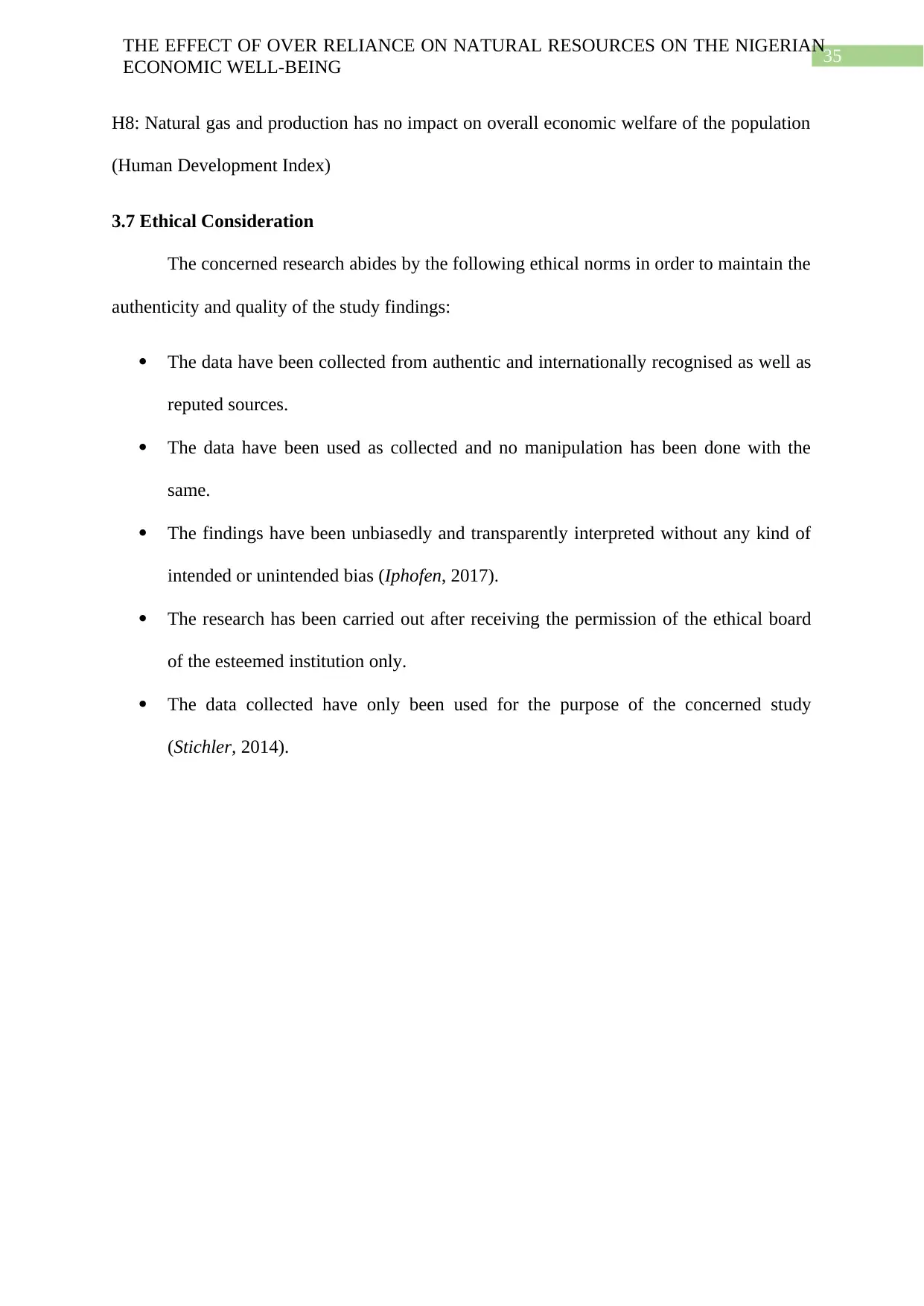
35
THE EFFECT OF OVER RELIANCE ON NATURAL RESOURCES ON THE NIGERIAN
ECONOMIC WELL-BEING
H8: Natural gas and production has no impact on overall economic welfare of the population
(Human Development Index)
3.7 Ethical Consideration
The concerned research abides by the following ethical norms in order to maintain the
authenticity and quality of the study findings:
The data have been collected from authentic and internationally recognised as well as
reputed sources.
The data have been used as collected and no manipulation has been done with the
same.
The findings have been unbiasedly and transparently interpreted without any kind of
intended or unintended bias (Iphofen, 2017).
The research has been carried out after receiving the permission of the ethical board
of the esteemed institution only.
The data collected have only been used for the purpose of the concerned study
(Stichler, 2014).
THE EFFECT OF OVER RELIANCE ON NATURAL RESOURCES ON THE NIGERIAN
ECONOMIC WELL-BEING
H8: Natural gas and production has no impact on overall economic welfare of the population
(Human Development Index)
3.7 Ethical Consideration
The concerned research abides by the following ethical norms in order to maintain the
authenticity and quality of the study findings:
The data have been collected from authentic and internationally recognised as well as
reputed sources.
The data have been used as collected and no manipulation has been done with the
same.
The findings have been unbiasedly and transparently interpreted without any kind of
intended or unintended bias (Iphofen, 2017).
The research has been carried out after receiving the permission of the ethical board
of the esteemed institution only.
The data collected have only been used for the purpose of the concerned study
(Stichler, 2014).
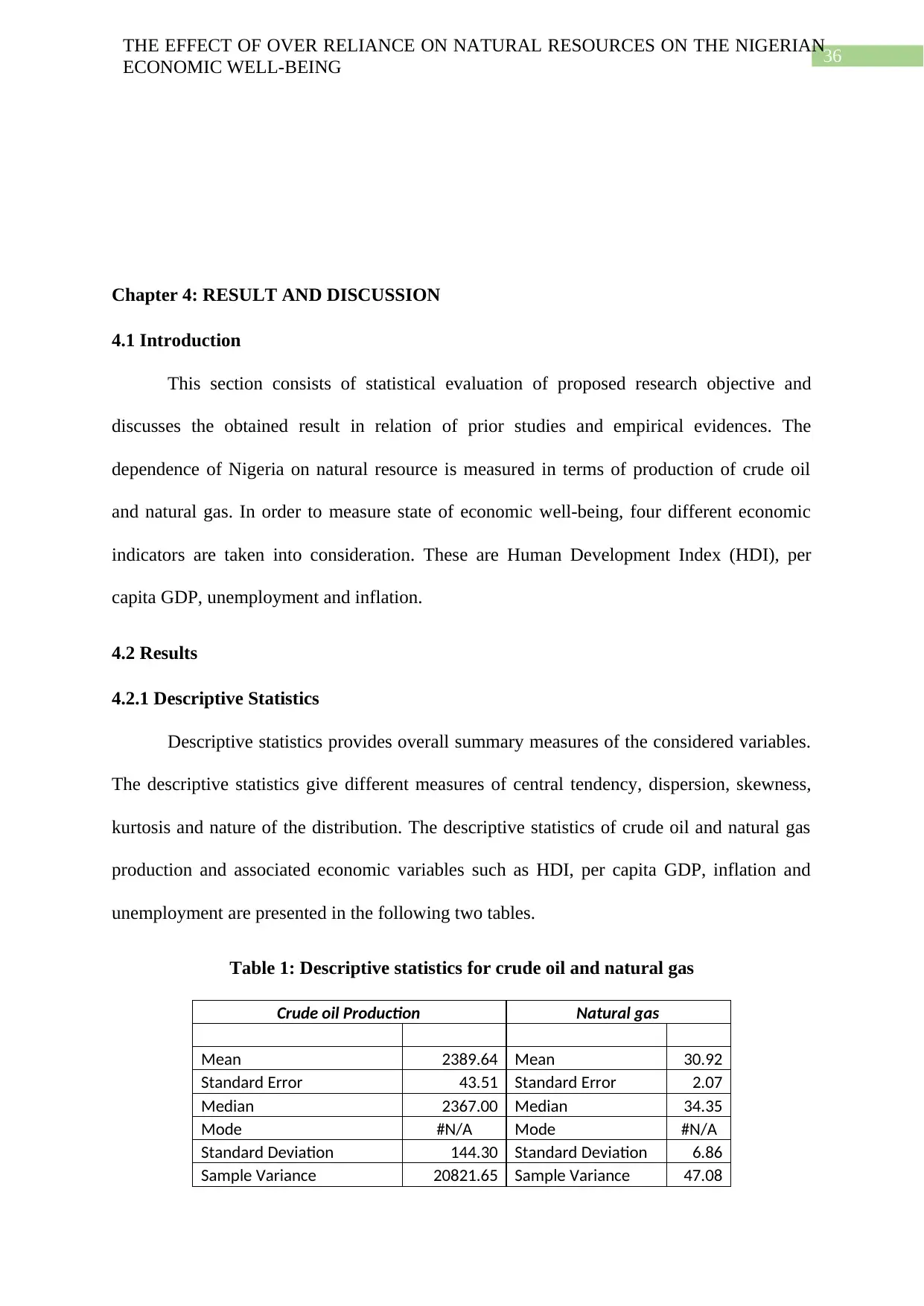
36
THE EFFECT OF OVER RELIANCE ON NATURAL RESOURCES ON THE NIGERIAN
ECONOMIC WELL-BEING
Chapter 4: RESULT AND DISCUSSION
4.1 Introduction
This section consists of statistical evaluation of proposed research objective and
discusses the obtained result in relation of prior studies and empirical evidences. The
dependence of Nigeria on natural resource is measured in terms of production of crude oil
and natural gas. In order to measure state of economic well-being, four different economic
indicators are taken into consideration. These are Human Development Index (HDI), per
capita GDP, unemployment and inflation.
4.2 Results
4.2.1 Descriptive Statistics
Descriptive statistics provides overall summary measures of the considered variables.
The descriptive statistics give different measures of central tendency, dispersion, skewness,
kurtosis and nature of the distribution. The descriptive statistics of crude oil and natural gas
production and associated economic variables such as HDI, per capita GDP, inflation and
unemployment are presented in the following two tables.
Table 1: Descriptive statistics for crude oil and natural gas
Crude oil Production Natural gas
Mean 2389.64 Mean 30.92
Standard Error 43.51 Standard Error 2.07
Median 2367.00 Median 34.35
Mode #N/A Mode #N/A
Standard Deviation 144.30 Standard Deviation 6.86
Sample Variance 20821.65 Sample Variance 47.08
THE EFFECT OF OVER RELIANCE ON NATURAL RESOURCES ON THE NIGERIAN
ECONOMIC WELL-BEING
Chapter 4: RESULT AND DISCUSSION
4.1 Introduction
This section consists of statistical evaluation of proposed research objective and
discusses the obtained result in relation of prior studies and empirical evidences. The
dependence of Nigeria on natural resource is measured in terms of production of crude oil
and natural gas. In order to measure state of economic well-being, four different economic
indicators are taken into consideration. These are Human Development Index (HDI), per
capita GDP, unemployment and inflation.
4.2 Results
4.2.1 Descriptive Statistics
Descriptive statistics provides overall summary measures of the considered variables.
The descriptive statistics give different measures of central tendency, dispersion, skewness,
kurtosis and nature of the distribution. The descriptive statistics of crude oil and natural gas
production and associated economic variables such as HDI, per capita GDP, inflation and
unemployment are presented in the following two tables.
Table 1: Descriptive statistics for crude oil and natural gas
Crude oil Production Natural gas
Mean 2389.64 Mean 30.92
Standard Error 43.51 Standard Error 2.07
Median 2367.00 Median 34.35
Mode #N/A Mode #N/A
Standard Deviation 144.30 Standard Deviation 6.86
Sample Variance 20821.65 Sample Variance 47.08
Paraphrase This Document
Need a fresh take? Get an instant paraphrase of this document with our AI Paraphraser
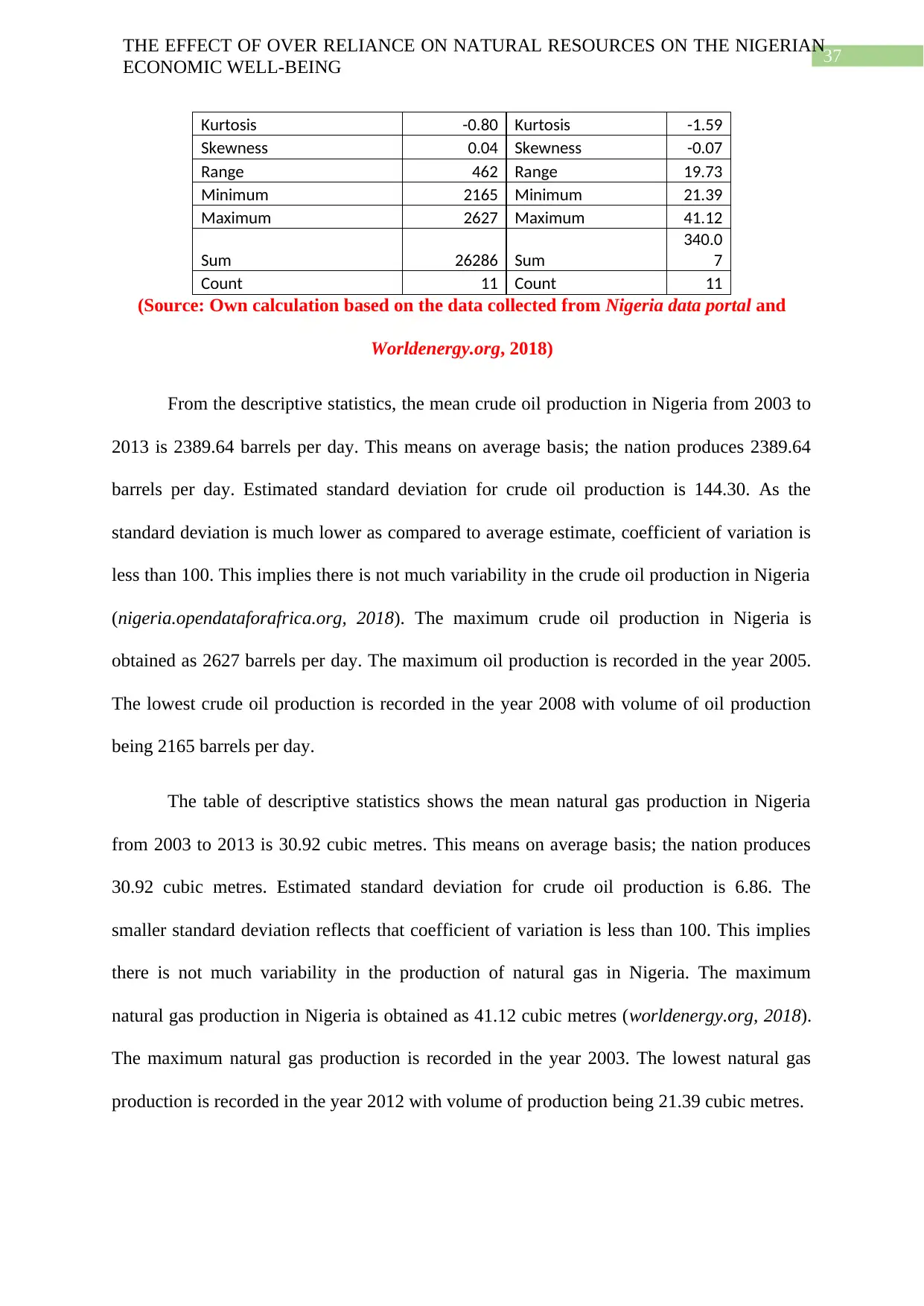
37
THE EFFECT OF OVER RELIANCE ON NATURAL RESOURCES ON THE NIGERIAN
ECONOMIC WELL-BEING
Kurtosis -0.80 Kurtosis -1.59
Skewness 0.04 Skewness -0.07
Range 462 Range 19.73
Minimum 2165 Minimum 21.39
Maximum 2627 Maximum 41.12
Sum 26286 Sum
340.0
7
Count 11 Count 11
(Source: Own calculation based on the data collected from Nigeria data portal and
Worldenergy.org, 2018)
From the descriptive statistics, the mean crude oil production in Nigeria from 2003 to
2013 is 2389.64 barrels per day. This means on average basis; the nation produces 2389.64
barrels per day. Estimated standard deviation for crude oil production is 144.30. As the
standard deviation is much lower as compared to average estimate, coefficient of variation is
less than 100. This implies there is not much variability in the crude oil production in Nigeria
(nigeria.opendataforafrica.org, 2018). The maximum crude oil production in Nigeria is
obtained as 2627 barrels per day. The maximum oil production is recorded in the year 2005.
The lowest crude oil production is recorded in the year 2008 with volume of oil production
being 2165 barrels per day.
The table of descriptive statistics shows the mean natural gas production in Nigeria
from 2003 to 2013 is 30.92 cubic metres. This means on average basis; the nation produces
30.92 cubic metres. Estimated standard deviation for crude oil production is 6.86. The
smaller standard deviation reflects that coefficient of variation is less than 100. This implies
there is not much variability in the production of natural gas in Nigeria. The maximum
natural gas production in Nigeria is obtained as 41.12 cubic metres (worldenergy.org, 2018).
The maximum natural gas production is recorded in the year 2003. The lowest natural gas
production is recorded in the year 2012 with volume of production being 21.39 cubic metres.
THE EFFECT OF OVER RELIANCE ON NATURAL RESOURCES ON THE NIGERIAN
ECONOMIC WELL-BEING
Kurtosis -0.80 Kurtosis -1.59
Skewness 0.04 Skewness -0.07
Range 462 Range 19.73
Minimum 2165 Minimum 21.39
Maximum 2627 Maximum 41.12
Sum 26286 Sum
340.0
7
Count 11 Count 11
(Source: Own calculation based on the data collected from Nigeria data portal and
Worldenergy.org, 2018)
From the descriptive statistics, the mean crude oil production in Nigeria from 2003 to
2013 is 2389.64 barrels per day. This means on average basis; the nation produces 2389.64
barrels per day. Estimated standard deviation for crude oil production is 144.30. As the
standard deviation is much lower as compared to average estimate, coefficient of variation is
less than 100. This implies there is not much variability in the crude oil production in Nigeria
(nigeria.opendataforafrica.org, 2018). The maximum crude oil production in Nigeria is
obtained as 2627 barrels per day. The maximum oil production is recorded in the year 2005.
The lowest crude oil production is recorded in the year 2008 with volume of oil production
being 2165 barrels per day.
The table of descriptive statistics shows the mean natural gas production in Nigeria
from 2003 to 2013 is 30.92 cubic metres. This means on average basis; the nation produces
30.92 cubic metres. Estimated standard deviation for crude oil production is 6.86. The
smaller standard deviation reflects that coefficient of variation is less than 100. This implies
there is not much variability in the production of natural gas in Nigeria. The maximum
natural gas production in Nigeria is obtained as 41.12 cubic metres (worldenergy.org, 2018).
The maximum natural gas production is recorded in the year 2003. The lowest natural gas
production is recorded in the year 2012 with volume of production being 21.39 cubic metres.
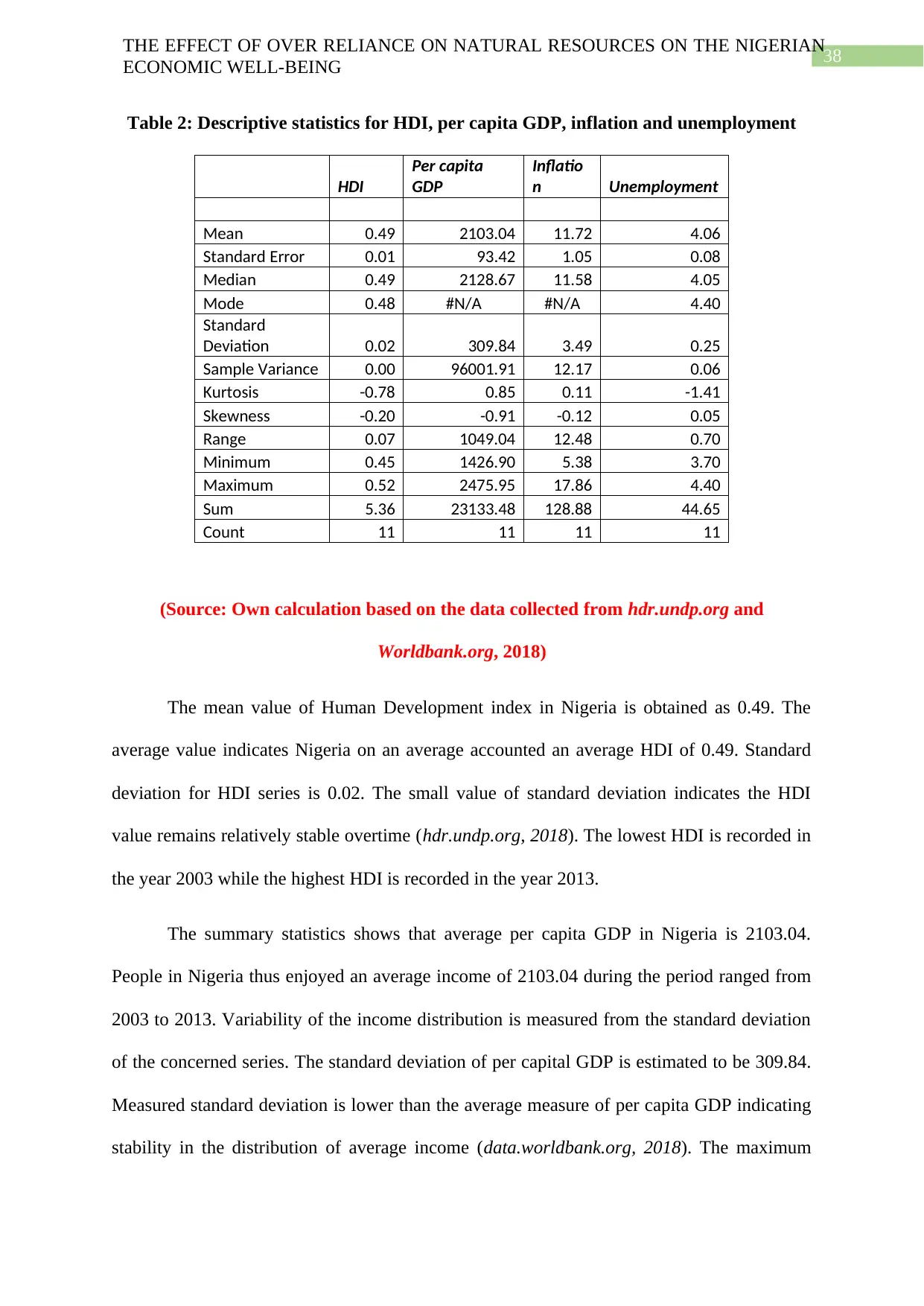
38
THE EFFECT OF OVER RELIANCE ON NATURAL RESOURCES ON THE NIGERIAN
ECONOMIC WELL-BEING
Table 2: Descriptive statistics for HDI, per capita GDP, inflation and unemployment
HDI
Per capita
GDP
Inflatio
n Unemployment
Mean 0.49 2103.04 11.72 4.06
Standard Error 0.01 93.42 1.05 0.08
Median 0.49 2128.67 11.58 4.05
Mode 0.48 #N/A #N/A 4.40
Standard
Deviation 0.02 309.84 3.49 0.25
Sample Variance 0.00 96001.91 12.17 0.06
Kurtosis -0.78 0.85 0.11 -1.41
Skewness -0.20 -0.91 -0.12 0.05
Range 0.07 1049.04 12.48 0.70
Minimum 0.45 1426.90 5.38 3.70
Maximum 0.52 2475.95 17.86 4.40
Sum 5.36 23133.48 128.88 44.65
Count 11 11 11 11
(Source: Own calculation based on the data collected from hdr.undp.org and
Worldbank.org, 2018)
The mean value of Human Development index in Nigeria is obtained as 0.49. The
average value indicates Nigeria on an average accounted an average HDI of 0.49. Standard
deviation for HDI series is 0.02. The small value of standard deviation indicates the HDI
value remains relatively stable overtime (hdr.undp.org, 2018). The lowest HDI is recorded in
the year 2003 while the highest HDI is recorded in the year 2013.
The summary statistics shows that average per capita GDP in Nigeria is 2103.04.
People in Nigeria thus enjoyed an average income of 2103.04 during the period ranged from
2003 to 2013. Variability of the income distribution is measured from the standard deviation
of the concerned series. The standard deviation of per capital GDP is estimated to be 309.84.
Measured standard deviation is lower than the average measure of per capita GDP indicating
stability in the distribution of average income (data.worldbank.org, 2018). The maximum
THE EFFECT OF OVER RELIANCE ON NATURAL RESOURCES ON THE NIGERIAN
ECONOMIC WELL-BEING
Table 2: Descriptive statistics for HDI, per capita GDP, inflation and unemployment
HDI
Per capita
GDP
Inflatio
n Unemployment
Mean 0.49 2103.04 11.72 4.06
Standard Error 0.01 93.42 1.05 0.08
Median 0.49 2128.67 11.58 4.05
Mode 0.48 #N/A #N/A 4.40
Standard
Deviation 0.02 309.84 3.49 0.25
Sample Variance 0.00 96001.91 12.17 0.06
Kurtosis -0.78 0.85 0.11 -1.41
Skewness -0.20 -0.91 -0.12 0.05
Range 0.07 1049.04 12.48 0.70
Minimum 0.45 1426.90 5.38 3.70
Maximum 0.52 2475.95 17.86 4.40
Sum 5.36 23133.48 128.88 44.65
Count 11 11 11 11
(Source: Own calculation based on the data collected from hdr.undp.org and
Worldbank.org, 2018)
The mean value of Human Development index in Nigeria is obtained as 0.49. The
average value indicates Nigeria on an average accounted an average HDI of 0.49. Standard
deviation for HDI series is 0.02. The small value of standard deviation indicates the HDI
value remains relatively stable overtime (hdr.undp.org, 2018). The lowest HDI is recorded in
the year 2003 while the highest HDI is recorded in the year 2013.
The summary statistics shows that average per capita GDP in Nigeria is 2103.04.
People in Nigeria thus enjoyed an average income of 2103.04 during the period ranged from
2003 to 2013. Variability of the income distribution is measured from the standard deviation
of the concerned series. The standard deviation of per capital GDP is estimated to be 309.84.
Measured standard deviation is lower than the average measure of per capita GDP indicating
stability in the distribution of average income (data.worldbank.org, 2018). The maximum
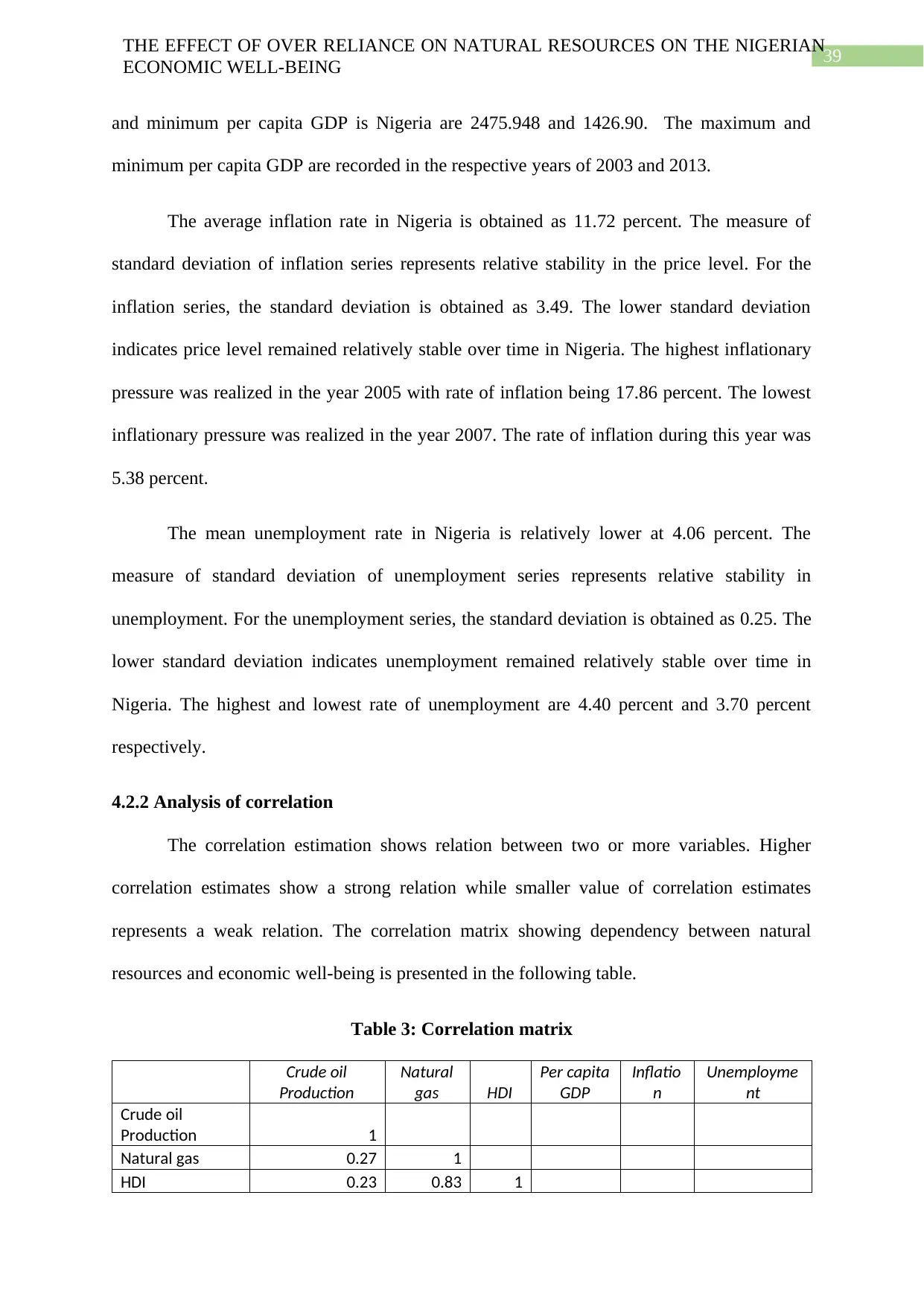
39
THE EFFECT OF OVER RELIANCE ON NATURAL RESOURCES ON THE NIGERIAN
ECONOMIC WELL-BEING
and minimum per capita GDP is Nigeria are 2475.948 and 1426.90. The maximum and
minimum per capita GDP are recorded in the respective years of 2003 and 2013.
The average inflation rate in Nigeria is obtained as 11.72 percent. The measure of
standard deviation of inflation series represents relative stability in the price level. For the
inflation series, the standard deviation is obtained as 3.49. The lower standard deviation
indicates price level remained relatively stable over time in Nigeria. The highest inflationary
pressure was realized in the year 2005 with rate of inflation being 17.86 percent. The lowest
inflationary pressure was realized in the year 2007. The rate of inflation during this year was
5.38 percent.
The mean unemployment rate in Nigeria is relatively lower at 4.06 percent. The
measure of standard deviation of unemployment series represents relative stability in
unemployment. For the unemployment series, the standard deviation is obtained as 0.25. The
lower standard deviation indicates unemployment remained relatively stable over time in
Nigeria. The highest and lowest rate of unemployment are 4.40 percent and 3.70 percent
respectively.
4.2.2 Analysis of correlation
The correlation estimation shows relation between two or more variables. Higher
correlation estimates show a strong relation while smaller value of correlation estimates
represents a weak relation. The correlation matrix showing dependency between natural
resources and economic well-being is presented in the following table.
Table 3: Correlation matrix
Crude oil
Production
Natural
gas HDI
Per capita
GDP
Inflatio
n
Unemployme
nt
Crude oil
Production 1
Natural gas 0.27 1
HDI 0.23 0.83 1
THE EFFECT OF OVER RELIANCE ON NATURAL RESOURCES ON THE NIGERIAN
ECONOMIC WELL-BEING
and minimum per capita GDP is Nigeria are 2475.948 and 1426.90. The maximum and
minimum per capita GDP are recorded in the respective years of 2003 and 2013.
The average inflation rate in Nigeria is obtained as 11.72 percent. The measure of
standard deviation of inflation series represents relative stability in the price level. For the
inflation series, the standard deviation is obtained as 3.49. The lower standard deviation
indicates price level remained relatively stable over time in Nigeria. The highest inflationary
pressure was realized in the year 2005 with rate of inflation being 17.86 percent. The lowest
inflationary pressure was realized in the year 2007. The rate of inflation during this year was
5.38 percent.
The mean unemployment rate in Nigeria is relatively lower at 4.06 percent. The
measure of standard deviation of unemployment series represents relative stability in
unemployment. For the unemployment series, the standard deviation is obtained as 0.25. The
lower standard deviation indicates unemployment remained relatively stable over time in
Nigeria. The highest and lowest rate of unemployment are 4.40 percent and 3.70 percent
respectively.
4.2.2 Analysis of correlation
The correlation estimation shows relation between two or more variables. Higher
correlation estimates show a strong relation while smaller value of correlation estimates
represents a weak relation. The correlation matrix showing dependency between natural
resources and economic well-being is presented in the following table.
Table 3: Correlation matrix
Crude oil
Production
Natural
gas HDI
Per capita
GDP
Inflatio
n
Unemployme
nt
Crude oil
Production 1
Natural gas 0.27 1
HDI 0.23 0.83 1
Secure Best Marks with AI Grader
Need help grading? Try our AI Grader for instant feedback on your assignments.
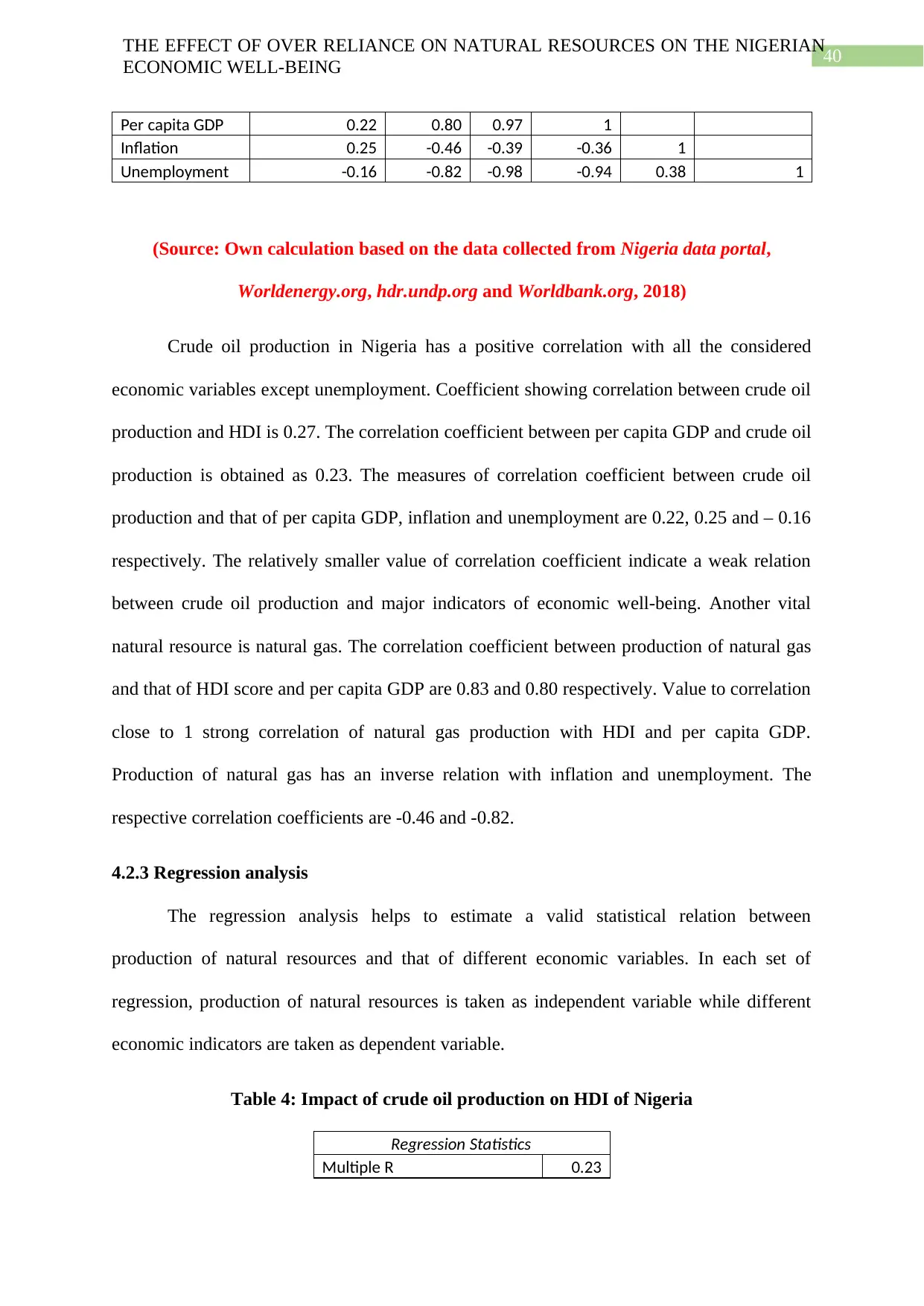
40
THE EFFECT OF OVER RELIANCE ON NATURAL RESOURCES ON THE NIGERIAN
ECONOMIC WELL-BEING
Per capita GDP 0.22 0.80 0.97 1
Inflation 0.25 -0.46 -0.39 -0.36 1
Unemployment -0.16 -0.82 -0.98 -0.94 0.38 1
(Source: Own calculation based on the data collected from Nigeria data portal,
Worldenergy.org, hdr.undp.org and Worldbank.org, 2018)
Crude oil production in Nigeria has a positive correlation with all the considered
economic variables except unemployment. Coefficient showing correlation between crude oil
production and HDI is 0.27. The correlation coefficient between per capita GDP and crude oil
production is obtained as 0.23. The measures of correlation coefficient between crude oil
production and that of per capita GDP, inflation and unemployment are 0.22, 0.25 and – 0.16
respectively. The relatively smaller value of correlation coefficient indicate a weak relation
between crude oil production and major indicators of economic well-being. Another vital
natural resource is natural gas. The correlation coefficient between production of natural gas
and that of HDI score and per capita GDP are 0.83 and 0.80 respectively. Value to correlation
close to 1 strong correlation of natural gas production with HDI and per capita GDP.
Production of natural gas has an inverse relation with inflation and unemployment. The
respective correlation coefficients are -0.46 and -0.82.
4.2.3 Regression analysis
The regression analysis helps to estimate a valid statistical relation between
production of natural resources and that of different economic variables. In each set of
regression, production of natural resources is taken as independent variable while different
economic indicators are taken as dependent variable.
Table 4: Impact of crude oil production on HDI of Nigeria
Regression Statistics
Multiple R 0.23
THE EFFECT OF OVER RELIANCE ON NATURAL RESOURCES ON THE NIGERIAN
ECONOMIC WELL-BEING
Per capita GDP 0.22 0.80 0.97 1
Inflation 0.25 -0.46 -0.39 -0.36 1
Unemployment -0.16 -0.82 -0.98 -0.94 0.38 1
(Source: Own calculation based on the data collected from Nigeria data portal,
Worldenergy.org, hdr.undp.org and Worldbank.org, 2018)
Crude oil production in Nigeria has a positive correlation with all the considered
economic variables except unemployment. Coefficient showing correlation between crude oil
production and HDI is 0.27. The correlation coefficient between per capita GDP and crude oil
production is obtained as 0.23. The measures of correlation coefficient between crude oil
production and that of per capita GDP, inflation and unemployment are 0.22, 0.25 and – 0.16
respectively. The relatively smaller value of correlation coefficient indicate a weak relation
between crude oil production and major indicators of economic well-being. Another vital
natural resource is natural gas. The correlation coefficient between production of natural gas
and that of HDI score and per capita GDP are 0.83 and 0.80 respectively. Value to correlation
close to 1 strong correlation of natural gas production with HDI and per capita GDP.
Production of natural gas has an inverse relation with inflation and unemployment. The
respective correlation coefficients are -0.46 and -0.82.
4.2.3 Regression analysis
The regression analysis helps to estimate a valid statistical relation between
production of natural resources and that of different economic variables. In each set of
regression, production of natural resources is taken as independent variable while different
economic indicators are taken as dependent variable.
Table 4: Impact of crude oil production on HDI of Nigeria
Regression Statistics
Multiple R 0.23
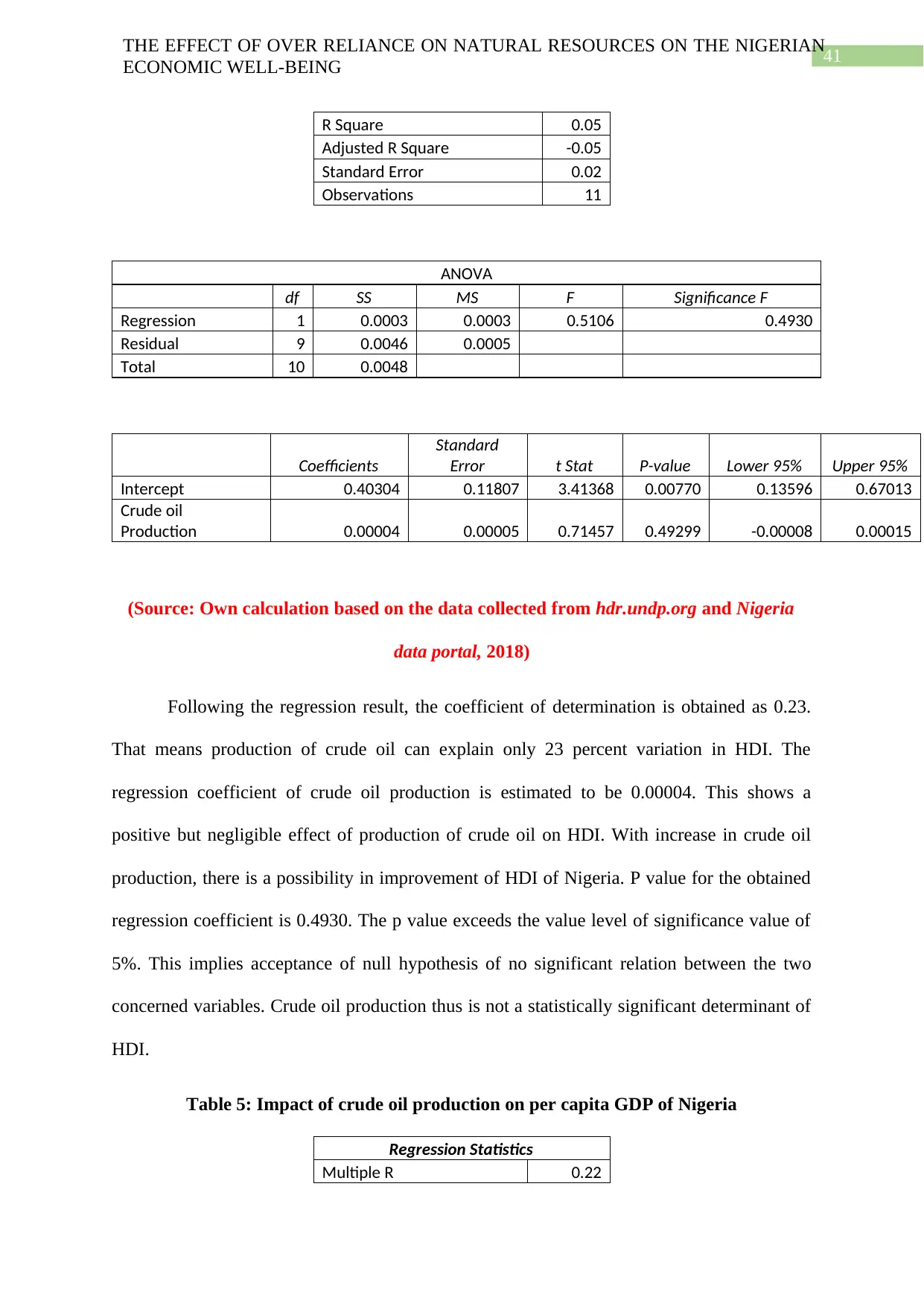
41
THE EFFECT OF OVER RELIANCE ON NATURAL RESOURCES ON THE NIGERIAN
ECONOMIC WELL-BEING
R Square 0.05
Adjusted R Square -0.05
Standard Error 0.02
Observations 11
ANOVA
df SS MS F Significance F
Regression 1 0.0003 0.0003 0.5106 0.4930
Residual 9 0.0046 0.0005
Total 10 0.0048
Coefficients
Standard
Error t Stat P-value Lower 95% Upper 95%
Intercept 0.40304 0.11807 3.41368 0.00770 0.13596 0.67013
Crude oil
Production 0.00004 0.00005 0.71457 0.49299 -0.00008 0.00015
(Source: Own calculation based on the data collected from hdr.undp.org and Nigeria
data portal, 2018)
Following the regression result, the coefficient of determination is obtained as 0.23.
That means production of crude oil can explain only 23 percent variation in HDI. The
regression coefficient of crude oil production is estimated to be 0.00004. This shows a
positive but negligible effect of production of crude oil on HDI. With increase in crude oil
production, there is a possibility in improvement of HDI of Nigeria. P value for the obtained
regression coefficient is 0.4930. The p value exceeds the value level of significance value of
5%. This implies acceptance of null hypothesis of no significant relation between the two
concerned variables. Crude oil production thus is not a statistically significant determinant of
HDI.
Table 5: Impact of crude oil production on per capita GDP of Nigeria
Regression Statistics
Multiple R 0.22
THE EFFECT OF OVER RELIANCE ON NATURAL RESOURCES ON THE NIGERIAN
ECONOMIC WELL-BEING
R Square 0.05
Adjusted R Square -0.05
Standard Error 0.02
Observations 11
ANOVA
df SS MS F Significance F
Regression 1 0.0003 0.0003 0.5106 0.4930
Residual 9 0.0046 0.0005
Total 10 0.0048
Coefficients
Standard
Error t Stat P-value Lower 95% Upper 95%
Intercept 0.40304 0.11807 3.41368 0.00770 0.13596 0.67013
Crude oil
Production 0.00004 0.00005 0.71457 0.49299 -0.00008 0.00015
(Source: Own calculation based on the data collected from hdr.undp.org and Nigeria
data portal, 2018)
Following the regression result, the coefficient of determination is obtained as 0.23.
That means production of crude oil can explain only 23 percent variation in HDI. The
regression coefficient of crude oil production is estimated to be 0.00004. This shows a
positive but negligible effect of production of crude oil on HDI. With increase in crude oil
production, there is a possibility in improvement of HDI of Nigeria. P value for the obtained
regression coefficient is 0.4930. The p value exceeds the value level of significance value of
5%. This implies acceptance of null hypothesis of no significant relation between the two
concerned variables. Crude oil production thus is not a statistically significant determinant of
HDI.
Table 5: Impact of crude oil production on per capita GDP of Nigeria
Regression Statistics
Multiple R 0.22
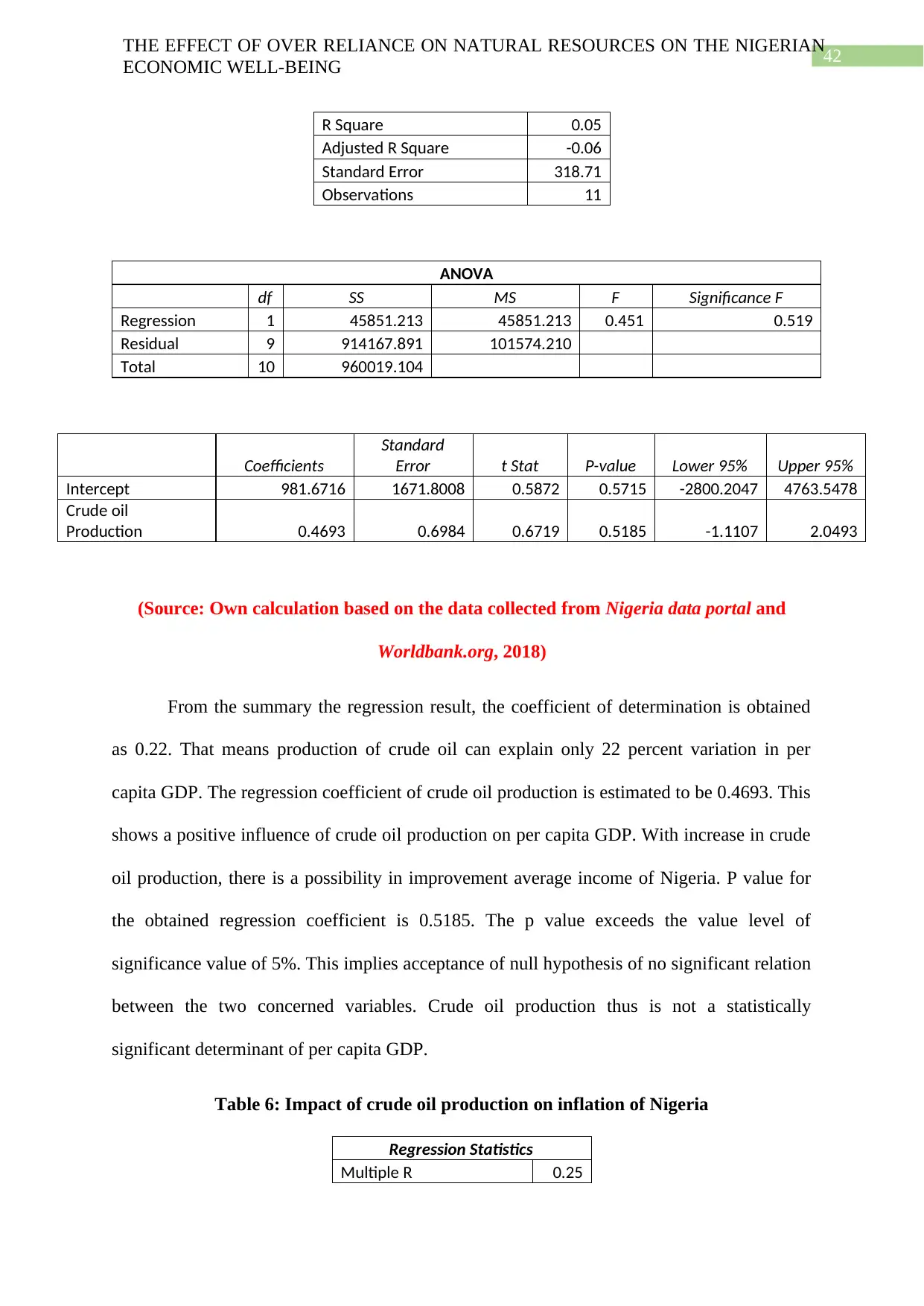
42
THE EFFECT OF OVER RELIANCE ON NATURAL RESOURCES ON THE NIGERIAN
ECONOMIC WELL-BEING
R Square 0.05
Adjusted R Square -0.06
Standard Error 318.71
Observations 11
ANOVA
df SS MS F Significance F
Regression 1 45851.213 45851.213 0.451 0.519
Residual 9 914167.891 101574.210
Total 10 960019.104
Coefficients
Standard
Error t Stat P-value Lower 95% Upper 95%
Intercept 981.6716 1671.8008 0.5872 0.5715 -2800.2047 4763.5478
Crude oil
Production 0.4693 0.6984 0.6719 0.5185 -1.1107 2.0493
(Source: Own calculation based on the data collected from Nigeria data portal and
Worldbank.org, 2018)
From the summary the regression result, the coefficient of determination is obtained
as 0.22. That means production of crude oil can explain only 22 percent variation in per
capita GDP. The regression coefficient of crude oil production is estimated to be 0.4693. This
shows a positive influence of crude oil production on per capita GDP. With increase in crude
oil production, there is a possibility in improvement average income of Nigeria. P value for
the obtained regression coefficient is 0.5185. The p value exceeds the value level of
significance value of 5%. This implies acceptance of null hypothesis of no significant relation
between the two concerned variables. Crude oil production thus is not a statistically
significant determinant of per capita GDP.
Table 6: Impact of crude oil production on inflation of Nigeria
Regression Statistics
Multiple R 0.25
THE EFFECT OF OVER RELIANCE ON NATURAL RESOURCES ON THE NIGERIAN
ECONOMIC WELL-BEING
R Square 0.05
Adjusted R Square -0.06
Standard Error 318.71
Observations 11
ANOVA
df SS MS F Significance F
Regression 1 45851.213 45851.213 0.451 0.519
Residual 9 914167.891 101574.210
Total 10 960019.104
Coefficients
Standard
Error t Stat P-value Lower 95% Upper 95%
Intercept 981.6716 1671.8008 0.5872 0.5715 -2800.2047 4763.5478
Crude oil
Production 0.4693 0.6984 0.6719 0.5185 -1.1107 2.0493
(Source: Own calculation based on the data collected from Nigeria data portal and
Worldbank.org, 2018)
From the summary the regression result, the coefficient of determination is obtained
as 0.22. That means production of crude oil can explain only 22 percent variation in per
capita GDP. The regression coefficient of crude oil production is estimated to be 0.4693. This
shows a positive influence of crude oil production on per capita GDP. With increase in crude
oil production, there is a possibility in improvement average income of Nigeria. P value for
the obtained regression coefficient is 0.5185. The p value exceeds the value level of
significance value of 5%. This implies acceptance of null hypothesis of no significant relation
between the two concerned variables. Crude oil production thus is not a statistically
significant determinant of per capita GDP.
Table 6: Impact of crude oil production on inflation of Nigeria
Regression Statistics
Multiple R 0.25
Paraphrase This Document
Need a fresh take? Get an instant paraphrase of this document with our AI Paraphraser
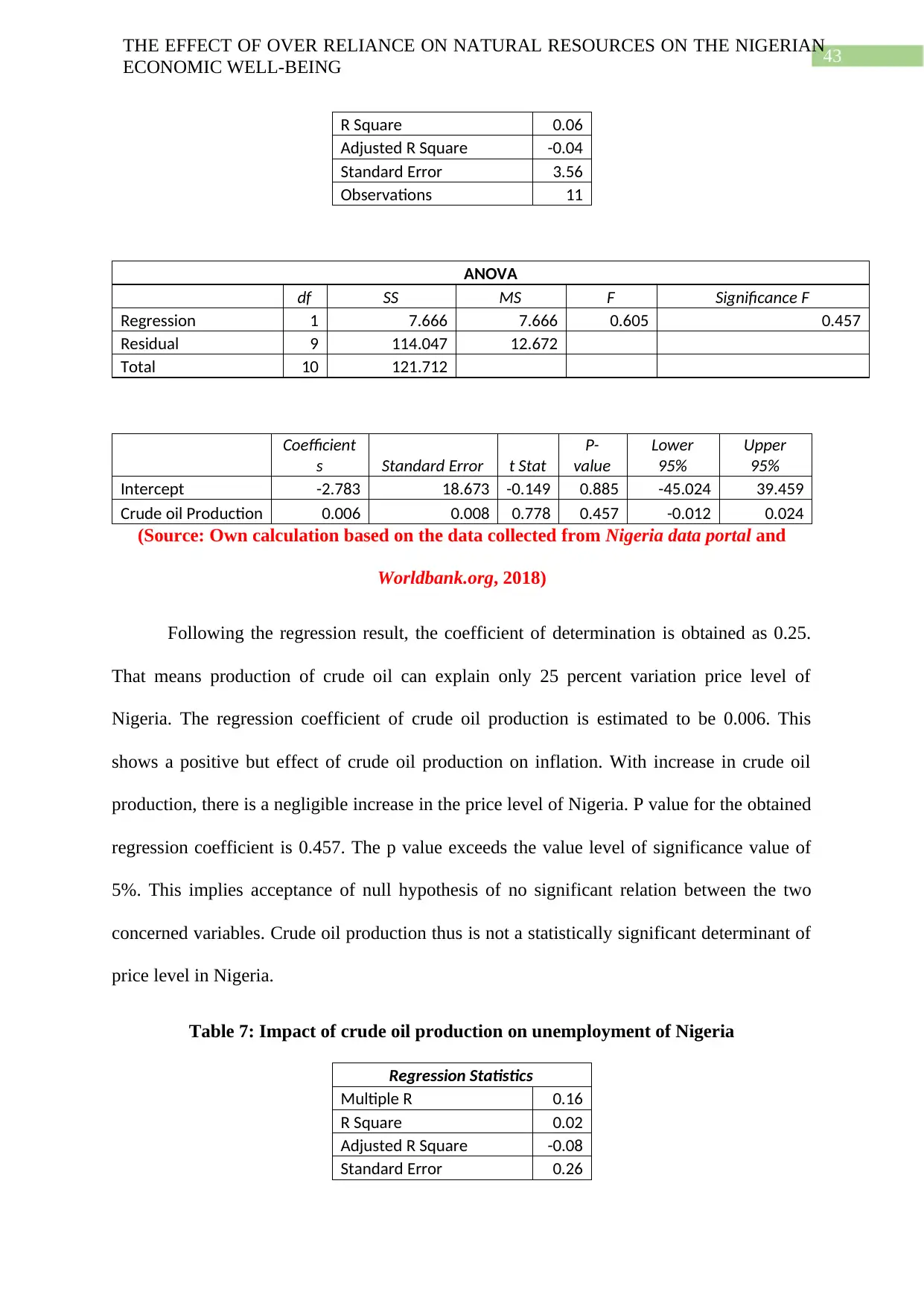
43
THE EFFECT OF OVER RELIANCE ON NATURAL RESOURCES ON THE NIGERIAN
ECONOMIC WELL-BEING
R Square 0.06
Adjusted R Square -0.04
Standard Error 3.56
Observations 11
ANOVA
df SS MS F Significance F
Regression 1 7.666 7.666 0.605 0.457
Residual 9 114.047 12.672
Total 10 121.712
Coefficient
s Standard Error t Stat
P-
value
Lower
95%
Upper
95%
Intercept -2.783 18.673 -0.149 0.885 -45.024 39.459
Crude oil Production 0.006 0.008 0.778 0.457 -0.012 0.024
(Source: Own calculation based on the data collected from Nigeria data portal and
Worldbank.org, 2018)
Following the regression result, the coefficient of determination is obtained as 0.25.
That means production of crude oil can explain only 25 percent variation price level of
Nigeria. The regression coefficient of crude oil production is estimated to be 0.006. This
shows a positive but effect of crude oil production on inflation. With increase in crude oil
production, there is a negligible increase in the price level of Nigeria. P value for the obtained
regression coefficient is 0.457. The p value exceeds the value level of significance value of
5%. This implies acceptance of null hypothesis of no significant relation between the two
concerned variables. Crude oil production thus is not a statistically significant determinant of
price level in Nigeria.
Table 7: Impact of crude oil production on unemployment of Nigeria
Regression Statistics
Multiple R 0.16
R Square 0.02
Adjusted R Square -0.08
Standard Error 0.26
THE EFFECT OF OVER RELIANCE ON NATURAL RESOURCES ON THE NIGERIAN
ECONOMIC WELL-BEING
R Square 0.06
Adjusted R Square -0.04
Standard Error 3.56
Observations 11
ANOVA
df SS MS F Significance F
Regression 1 7.666 7.666 0.605 0.457
Residual 9 114.047 12.672
Total 10 121.712
Coefficient
s Standard Error t Stat
P-
value
Lower
95%
Upper
95%
Intercept -2.783 18.673 -0.149 0.885 -45.024 39.459
Crude oil Production 0.006 0.008 0.778 0.457 -0.012 0.024
(Source: Own calculation based on the data collected from Nigeria data portal and
Worldbank.org, 2018)
Following the regression result, the coefficient of determination is obtained as 0.25.
That means production of crude oil can explain only 25 percent variation price level of
Nigeria. The regression coefficient of crude oil production is estimated to be 0.006. This
shows a positive but effect of crude oil production on inflation. With increase in crude oil
production, there is a negligible increase in the price level of Nigeria. P value for the obtained
regression coefficient is 0.457. The p value exceeds the value level of significance value of
5%. This implies acceptance of null hypothesis of no significant relation between the two
concerned variables. Crude oil production thus is not a statistically significant determinant of
price level in Nigeria.
Table 7: Impact of crude oil production on unemployment of Nigeria
Regression Statistics
Multiple R 0.16
R Square 0.02
Adjusted R Square -0.08
Standard Error 0.26
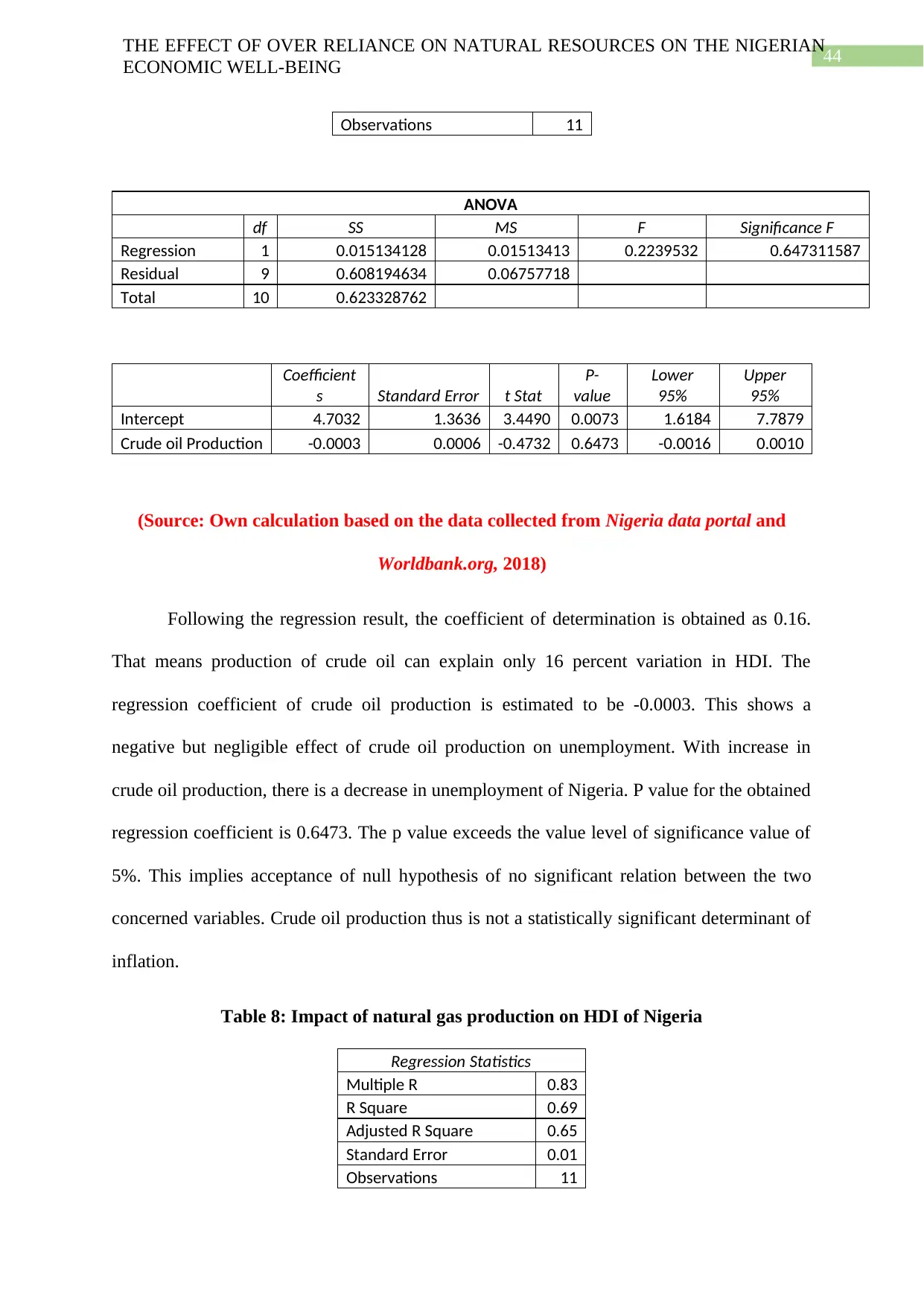
44
THE EFFECT OF OVER RELIANCE ON NATURAL RESOURCES ON THE NIGERIAN
ECONOMIC WELL-BEING
Observations 11
ANOVA
df SS MS F Significance F
Regression 1 0.015134128 0.01513413 0.2239532 0.647311587
Residual 9 0.608194634 0.06757718
Total 10 0.623328762
Coefficient
s Standard Error t Stat
P-
value
Lower
95%
Upper
95%
Intercept 4.7032 1.3636 3.4490 0.0073 1.6184 7.7879
Crude oil Production -0.0003 0.0006 -0.4732 0.6473 -0.0016 0.0010
(Source: Own calculation based on the data collected from Nigeria data portal and
Worldbank.org, 2018)
Following the regression result, the coefficient of determination is obtained as 0.16.
That means production of crude oil can explain only 16 percent variation in HDI. The
regression coefficient of crude oil production is estimated to be -0.0003. This shows a
negative but negligible effect of crude oil production on unemployment. With increase in
crude oil production, there is a decrease in unemployment of Nigeria. P value for the obtained
regression coefficient is 0.6473. The p value exceeds the value level of significance value of
5%. This implies acceptance of null hypothesis of no significant relation between the two
concerned variables. Crude oil production thus is not a statistically significant determinant of
inflation.
Table 8: Impact of natural gas production on HDI of Nigeria
Regression Statistics
Multiple R 0.83
R Square 0.69
Adjusted R Square 0.65
Standard Error 0.01
Observations 11
THE EFFECT OF OVER RELIANCE ON NATURAL RESOURCES ON THE NIGERIAN
ECONOMIC WELL-BEING
Observations 11
ANOVA
df SS MS F Significance F
Regression 1 0.015134128 0.01513413 0.2239532 0.647311587
Residual 9 0.608194634 0.06757718
Total 10 0.623328762
Coefficient
s Standard Error t Stat
P-
value
Lower
95%
Upper
95%
Intercept 4.7032 1.3636 3.4490 0.0073 1.6184 7.7879
Crude oil Production -0.0003 0.0006 -0.4732 0.6473 -0.0016 0.0010
(Source: Own calculation based on the data collected from Nigeria data portal and
Worldbank.org, 2018)
Following the regression result, the coefficient of determination is obtained as 0.16.
That means production of crude oil can explain only 16 percent variation in HDI. The
regression coefficient of crude oil production is estimated to be -0.0003. This shows a
negative but negligible effect of crude oil production on unemployment. With increase in
crude oil production, there is a decrease in unemployment of Nigeria. P value for the obtained
regression coefficient is 0.6473. The p value exceeds the value level of significance value of
5%. This implies acceptance of null hypothesis of no significant relation between the two
concerned variables. Crude oil production thus is not a statistically significant determinant of
inflation.
Table 8: Impact of natural gas production on HDI of Nigeria
Regression Statistics
Multiple R 0.83
R Square 0.69
Adjusted R Square 0.65
Standard Error 0.01
Observations 11
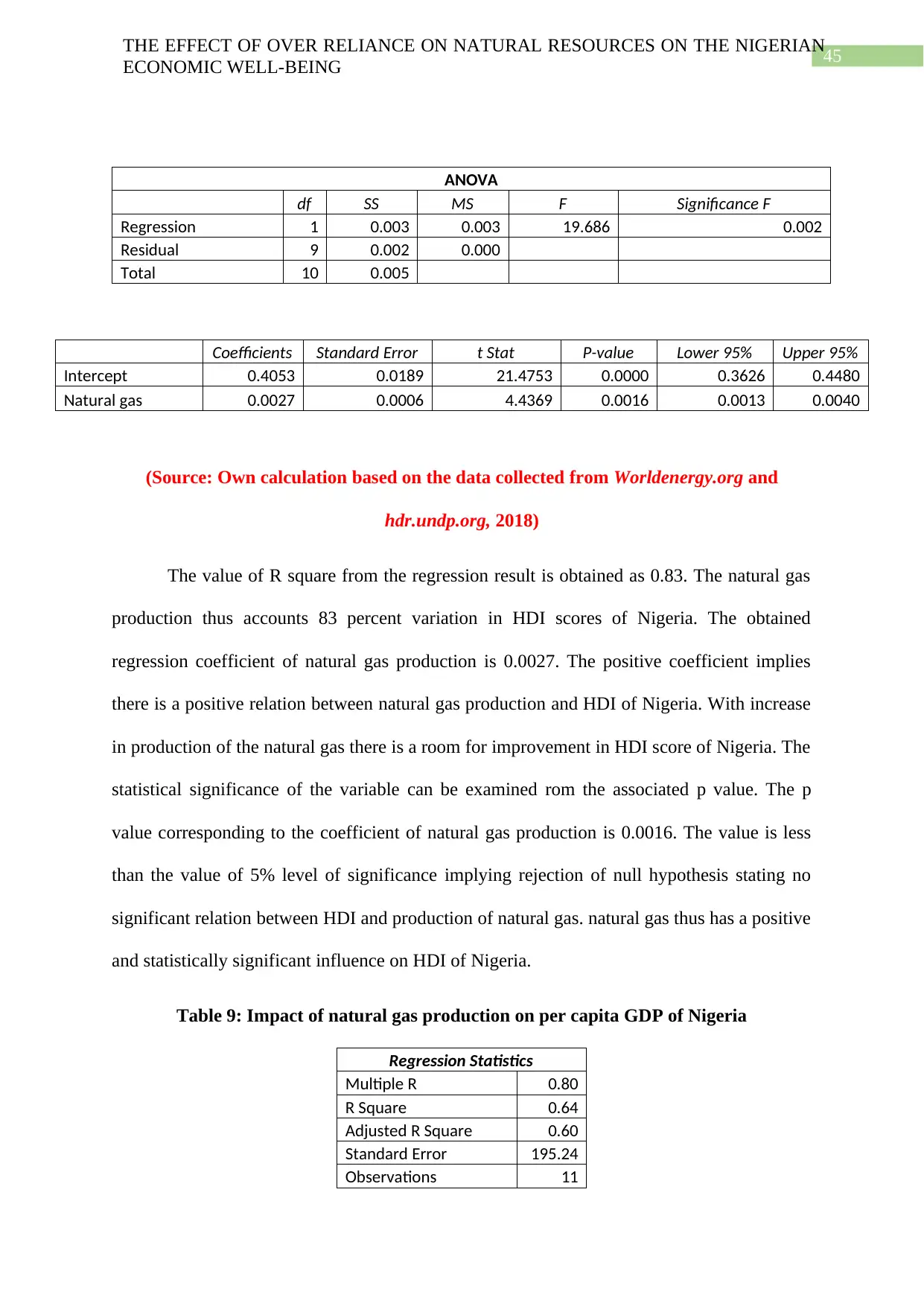
45
THE EFFECT OF OVER RELIANCE ON NATURAL RESOURCES ON THE NIGERIAN
ECONOMIC WELL-BEING
ANOVA
df SS MS F Significance F
Regression 1 0.003 0.003 19.686 0.002
Residual 9 0.002 0.000
Total 10 0.005
Coefficients Standard Error t Stat P-value Lower 95% Upper 95%
Intercept 0.4053 0.0189 21.4753 0.0000 0.3626 0.4480
Natural gas 0.0027 0.0006 4.4369 0.0016 0.0013 0.0040
(Source: Own calculation based on the data collected from Worldenergy.org and
hdr.undp.org, 2018)
The value of R square from the regression result is obtained as 0.83. The natural gas
production thus accounts 83 percent variation in HDI scores of Nigeria. The obtained
regression coefficient of natural gas production is 0.0027. The positive coefficient implies
there is a positive relation between natural gas production and HDI of Nigeria. With increase
in production of the natural gas there is a room for improvement in HDI score of Nigeria. The
statistical significance of the variable can be examined rom the associated p value. The p
value corresponding to the coefficient of natural gas production is 0.0016. The value is less
than the value of 5% level of significance implying rejection of null hypothesis stating no
significant relation between HDI and production of natural gas. natural gas thus has a positive
and statistically significant influence on HDI of Nigeria.
Table 9: Impact of natural gas production on per capita GDP of Nigeria
Regression Statistics
Multiple R 0.80
R Square 0.64
Adjusted R Square 0.60
Standard Error 195.24
Observations 11
THE EFFECT OF OVER RELIANCE ON NATURAL RESOURCES ON THE NIGERIAN
ECONOMIC WELL-BEING
ANOVA
df SS MS F Significance F
Regression 1 0.003 0.003 19.686 0.002
Residual 9 0.002 0.000
Total 10 0.005
Coefficients Standard Error t Stat P-value Lower 95% Upper 95%
Intercept 0.4053 0.0189 21.4753 0.0000 0.3626 0.4480
Natural gas 0.0027 0.0006 4.4369 0.0016 0.0013 0.0040
(Source: Own calculation based on the data collected from Worldenergy.org and
hdr.undp.org, 2018)
The value of R square from the regression result is obtained as 0.83. The natural gas
production thus accounts 83 percent variation in HDI scores of Nigeria. The obtained
regression coefficient of natural gas production is 0.0027. The positive coefficient implies
there is a positive relation between natural gas production and HDI of Nigeria. With increase
in production of the natural gas there is a room for improvement in HDI score of Nigeria. The
statistical significance of the variable can be examined rom the associated p value. The p
value corresponding to the coefficient of natural gas production is 0.0016. The value is less
than the value of 5% level of significance implying rejection of null hypothesis stating no
significant relation between HDI and production of natural gas. natural gas thus has a positive
and statistically significant influence on HDI of Nigeria.
Table 9: Impact of natural gas production on per capita GDP of Nigeria
Regression Statistics
Multiple R 0.80
R Square 0.64
Adjusted R Square 0.60
Standard Error 195.24
Observations 11
Secure Best Marks with AI Grader
Need help grading? Try our AI Grader for instant feedback on your assignments.
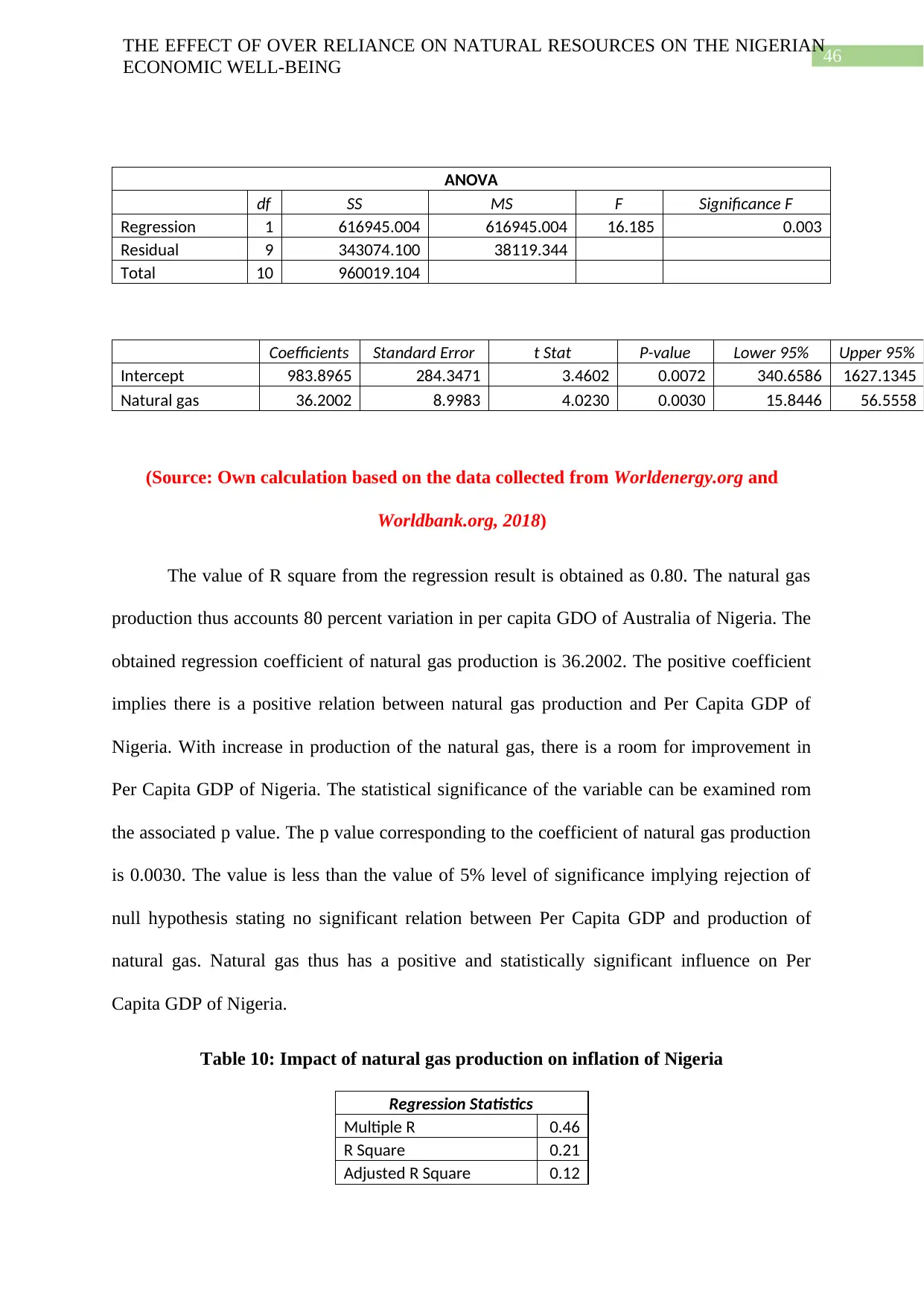
46
THE EFFECT OF OVER RELIANCE ON NATURAL RESOURCES ON THE NIGERIAN
ECONOMIC WELL-BEING
ANOVA
df SS MS F Significance F
Regression 1 616945.004 616945.004 16.185 0.003
Residual 9 343074.100 38119.344
Total 10 960019.104
Coefficients Standard Error t Stat P-value Lower 95% Upper 95%
Intercept 983.8965 284.3471 3.4602 0.0072 340.6586 1627.1345
Natural gas 36.2002 8.9983 4.0230 0.0030 15.8446 56.5558
(Source: Own calculation based on the data collected from Worldenergy.org and
Worldbank.org, 2018)
The value of R square from the regression result is obtained as 0.80. The natural gas
production thus accounts 80 percent variation in per capita GDO of Australia of Nigeria. The
obtained regression coefficient of natural gas production is 36.2002. The positive coefficient
implies there is a positive relation between natural gas production and Per Capita GDP of
Nigeria. With increase in production of the natural gas, there is a room for improvement in
Per Capita GDP of Nigeria. The statistical significance of the variable can be examined rom
the associated p value. The p value corresponding to the coefficient of natural gas production
is 0.0030. The value is less than the value of 5% level of significance implying rejection of
null hypothesis stating no significant relation between Per Capita GDP and production of
natural gas. Natural gas thus has a positive and statistically significant influence on Per
Capita GDP of Nigeria.
Table 10: Impact of natural gas production on inflation of Nigeria
Regression Statistics
Multiple R 0.46
R Square 0.21
Adjusted R Square 0.12
THE EFFECT OF OVER RELIANCE ON NATURAL RESOURCES ON THE NIGERIAN
ECONOMIC WELL-BEING
ANOVA
df SS MS F Significance F
Regression 1 616945.004 616945.004 16.185 0.003
Residual 9 343074.100 38119.344
Total 10 960019.104
Coefficients Standard Error t Stat P-value Lower 95% Upper 95%
Intercept 983.8965 284.3471 3.4602 0.0072 340.6586 1627.1345
Natural gas 36.2002 8.9983 4.0230 0.0030 15.8446 56.5558
(Source: Own calculation based on the data collected from Worldenergy.org and
Worldbank.org, 2018)
The value of R square from the regression result is obtained as 0.80. The natural gas
production thus accounts 80 percent variation in per capita GDO of Australia of Nigeria. The
obtained regression coefficient of natural gas production is 36.2002. The positive coefficient
implies there is a positive relation between natural gas production and Per Capita GDP of
Nigeria. With increase in production of the natural gas, there is a room for improvement in
Per Capita GDP of Nigeria. The statistical significance of the variable can be examined rom
the associated p value. The p value corresponding to the coefficient of natural gas production
is 0.0030. The value is less than the value of 5% level of significance implying rejection of
null hypothesis stating no significant relation between Per Capita GDP and production of
natural gas. Natural gas thus has a positive and statistically significant influence on Per
Capita GDP of Nigeria.
Table 10: Impact of natural gas production on inflation of Nigeria
Regression Statistics
Multiple R 0.46
R Square 0.21
Adjusted R Square 0.12
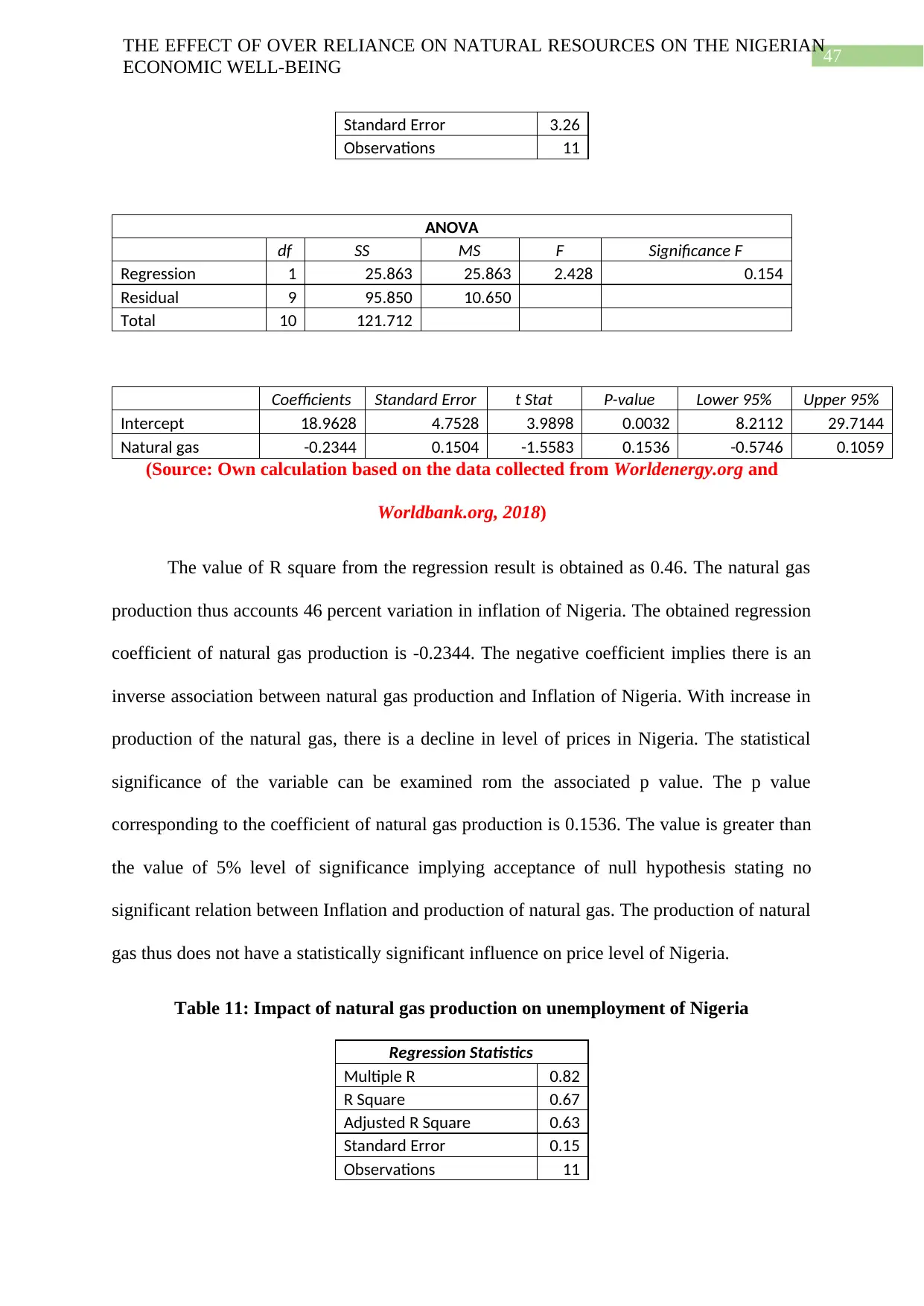
47
THE EFFECT OF OVER RELIANCE ON NATURAL RESOURCES ON THE NIGERIAN
ECONOMIC WELL-BEING
Standard Error 3.26
Observations 11
ANOVA
df SS MS F Significance F
Regression 1 25.863 25.863 2.428 0.154
Residual 9 95.850 10.650
Total 10 121.712
Coefficients Standard Error t Stat P-value Lower 95% Upper 95%
Intercept 18.9628 4.7528 3.9898 0.0032 8.2112 29.7144
Natural gas -0.2344 0.1504 -1.5583 0.1536 -0.5746 0.1059
(Source: Own calculation based on the data collected from Worldenergy.org and
Worldbank.org, 2018)
The value of R square from the regression result is obtained as 0.46. The natural gas
production thus accounts 46 percent variation in inflation of Nigeria. The obtained regression
coefficient of natural gas production is -0.2344. The negative coefficient implies there is an
inverse association between natural gas production and Inflation of Nigeria. With increase in
production of the natural gas, there is a decline in level of prices in Nigeria. The statistical
significance of the variable can be examined rom the associated p value. The p value
corresponding to the coefficient of natural gas production is 0.1536. The value is greater than
the value of 5% level of significance implying acceptance of null hypothesis stating no
significant relation between Inflation and production of natural gas. The production of natural
gas thus does not have a statistically significant influence on price level of Nigeria.
Table 11: Impact of natural gas production on unemployment of Nigeria
Regression Statistics
Multiple R 0.82
R Square 0.67
Adjusted R Square 0.63
Standard Error 0.15
Observations 11
THE EFFECT OF OVER RELIANCE ON NATURAL RESOURCES ON THE NIGERIAN
ECONOMIC WELL-BEING
Standard Error 3.26
Observations 11
ANOVA
df SS MS F Significance F
Regression 1 25.863 25.863 2.428 0.154
Residual 9 95.850 10.650
Total 10 121.712
Coefficients Standard Error t Stat P-value Lower 95% Upper 95%
Intercept 18.9628 4.7528 3.9898 0.0032 8.2112 29.7144
Natural gas -0.2344 0.1504 -1.5583 0.1536 -0.5746 0.1059
(Source: Own calculation based on the data collected from Worldenergy.org and
Worldbank.org, 2018)
The value of R square from the regression result is obtained as 0.46. The natural gas
production thus accounts 46 percent variation in inflation of Nigeria. The obtained regression
coefficient of natural gas production is -0.2344. The negative coefficient implies there is an
inverse association between natural gas production and Inflation of Nigeria. With increase in
production of the natural gas, there is a decline in level of prices in Nigeria. The statistical
significance of the variable can be examined rom the associated p value. The p value
corresponding to the coefficient of natural gas production is 0.1536. The value is greater than
the value of 5% level of significance implying acceptance of null hypothesis stating no
significant relation between Inflation and production of natural gas. The production of natural
gas thus does not have a statistically significant influence on price level of Nigeria.
Table 11: Impact of natural gas production on unemployment of Nigeria
Regression Statistics
Multiple R 0.82
R Square 0.67
Adjusted R Square 0.63
Standard Error 0.15
Observations 11
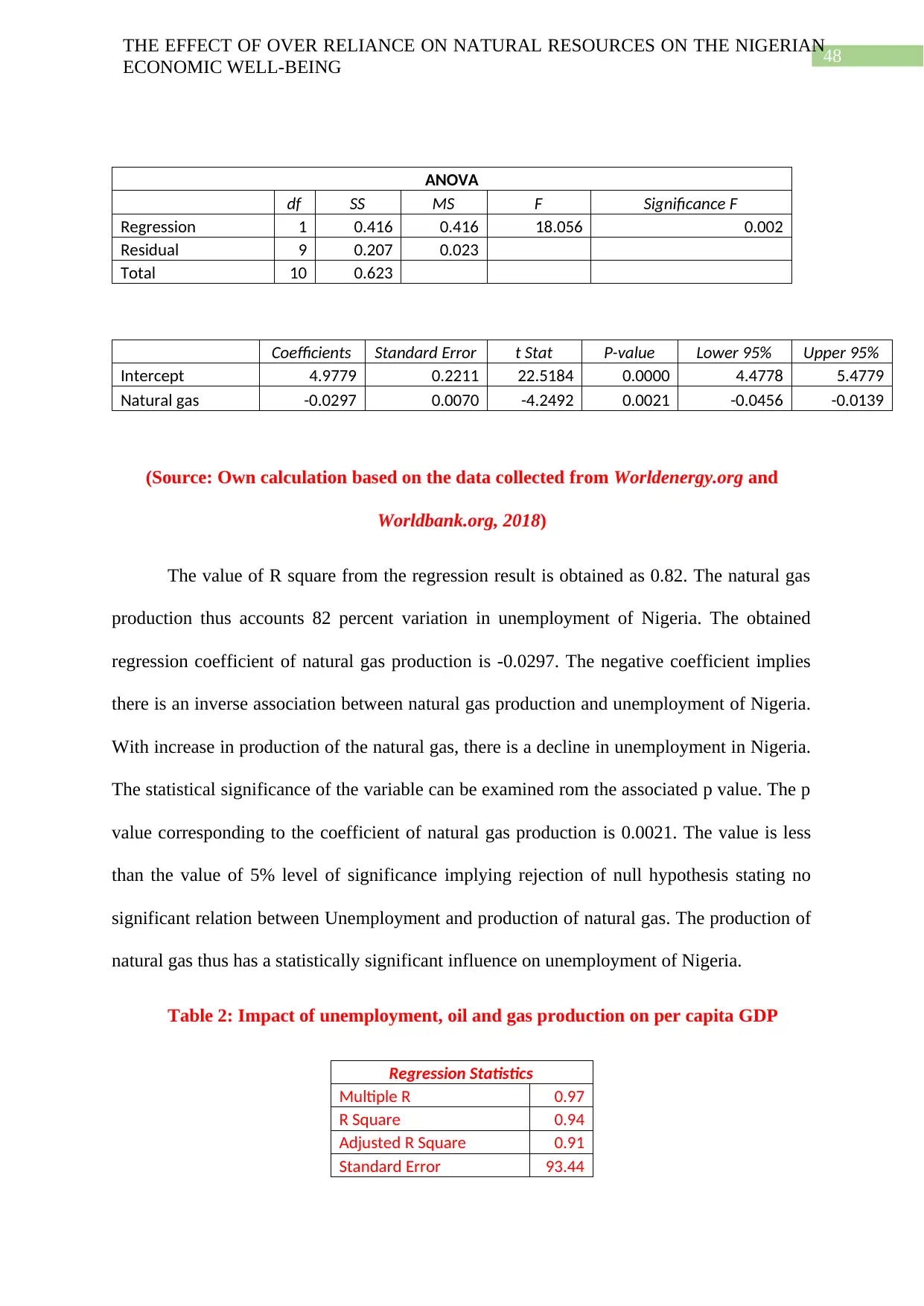
48
THE EFFECT OF OVER RELIANCE ON NATURAL RESOURCES ON THE NIGERIAN
ECONOMIC WELL-BEING
ANOVA
df SS MS F Significance F
Regression 1 0.416 0.416 18.056 0.002
Residual 9 0.207 0.023
Total 10 0.623
Coefficients Standard Error t Stat P-value Lower 95% Upper 95%
Intercept 4.9779 0.2211 22.5184 0.0000 4.4778 5.4779
Natural gas -0.0297 0.0070 -4.2492 0.0021 -0.0456 -0.0139
(Source: Own calculation based on the data collected from Worldenergy.org and
Worldbank.org, 2018)
The value of R square from the regression result is obtained as 0.82. The natural gas
production thus accounts 82 percent variation in unemployment of Nigeria. The obtained
regression coefficient of natural gas production is -0.0297. The negative coefficient implies
there is an inverse association between natural gas production and unemployment of Nigeria.
With increase in production of the natural gas, there is a decline in unemployment in Nigeria.
The statistical significance of the variable can be examined rom the associated p value. The p
value corresponding to the coefficient of natural gas production is 0.0021. The value is less
than the value of 5% level of significance implying rejection of null hypothesis stating no
significant relation between Unemployment and production of natural gas. The production of
natural gas thus has a statistically significant influence on unemployment of Nigeria.
Table 2: Impact of unemployment, oil and gas production on per capita GDP
Regression Statistics
Multiple R 0.97
R Square 0.94
Adjusted R Square 0.91
Standard Error 93.44
THE EFFECT OF OVER RELIANCE ON NATURAL RESOURCES ON THE NIGERIAN
ECONOMIC WELL-BEING
ANOVA
df SS MS F Significance F
Regression 1 0.416 0.416 18.056 0.002
Residual 9 0.207 0.023
Total 10 0.623
Coefficients Standard Error t Stat P-value Lower 95% Upper 95%
Intercept 4.9779 0.2211 22.5184 0.0000 4.4778 5.4779
Natural gas -0.0297 0.0070 -4.2492 0.0021 -0.0456 -0.0139
(Source: Own calculation based on the data collected from Worldenergy.org and
Worldbank.org, 2018)
The value of R square from the regression result is obtained as 0.82. The natural gas
production thus accounts 82 percent variation in unemployment of Nigeria. The obtained
regression coefficient of natural gas production is -0.0297. The negative coefficient implies
there is an inverse association between natural gas production and unemployment of Nigeria.
With increase in production of the natural gas, there is a decline in unemployment in Nigeria.
The statistical significance of the variable can be examined rom the associated p value. The p
value corresponding to the coefficient of natural gas production is 0.0021. The value is less
than the value of 5% level of significance implying rejection of null hypothesis stating no
significant relation between Unemployment and production of natural gas. The production of
natural gas thus has a statistically significant influence on unemployment of Nigeria.
Table 2: Impact of unemployment, oil and gas production on per capita GDP
Regression Statistics
Multiple R 0.97
R Square 0.94
Adjusted R Square 0.91
Standard Error 93.44
Paraphrase This Document
Need a fresh take? Get an instant paraphrase of this document with our AI Paraphraser
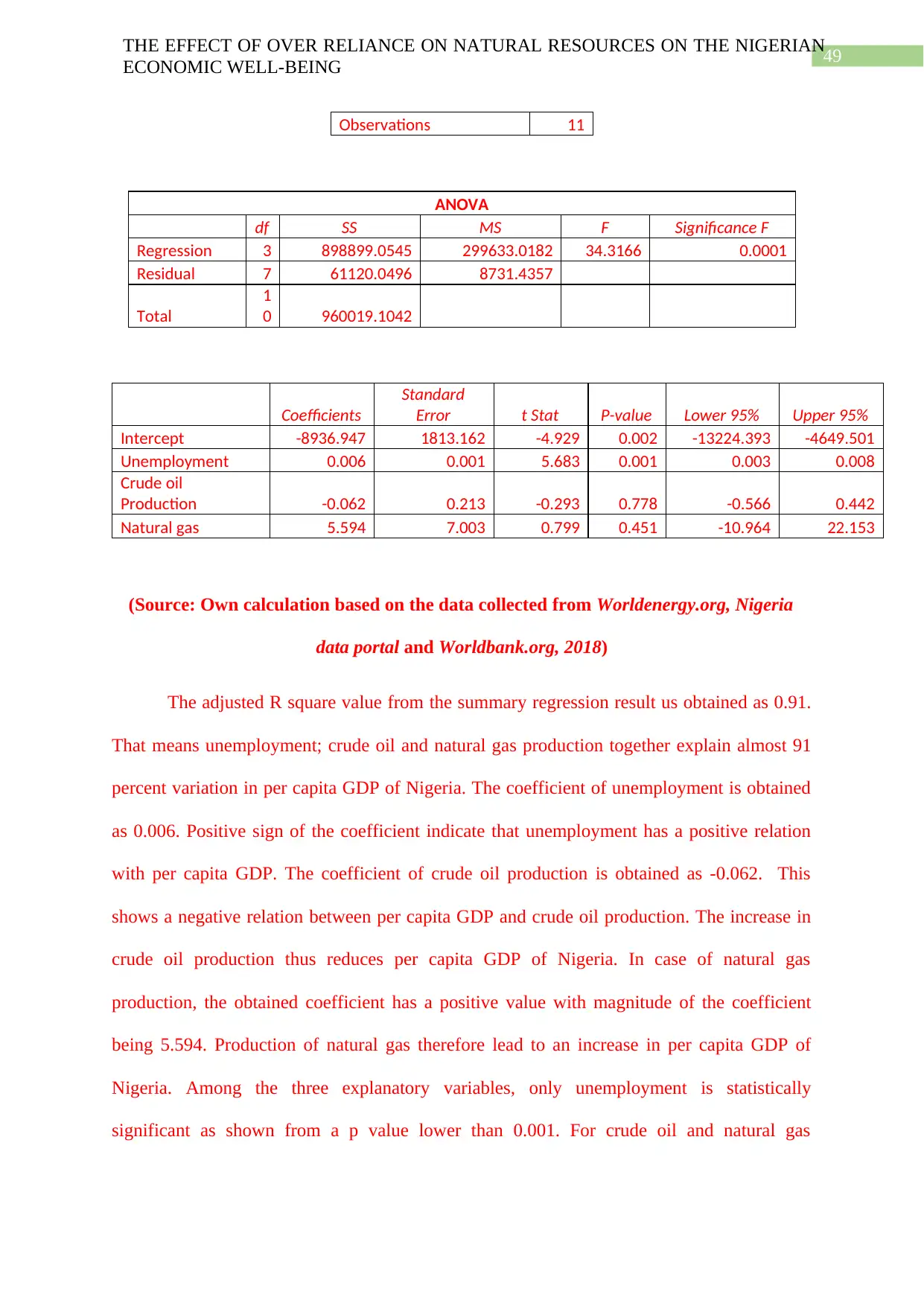
49
THE EFFECT OF OVER RELIANCE ON NATURAL RESOURCES ON THE NIGERIAN
ECONOMIC WELL-BEING
Observations 11
ANOVA
df SS MS F Significance F
Regression 3 898899.0545 299633.0182 34.3166 0.0001
Residual 7 61120.0496 8731.4357
Total
1
0 960019.1042
Coefficients
Standard
Error t Stat P-value Lower 95% Upper 95%
Intercept -8936.947 1813.162 -4.929 0.002 -13224.393 -4649.501
Unemployment 0.006 0.001 5.683 0.001 0.003 0.008
Crude oil
Production -0.062 0.213 -0.293 0.778 -0.566 0.442
Natural gas 5.594 7.003 0.799 0.451 -10.964 22.153
(Source: Own calculation based on the data collected from Worldenergy.org, Nigeria
data portal and Worldbank.org, 2018)
The adjusted R square value from the summary regression result us obtained as 0.91.
That means unemployment; crude oil and natural gas production together explain almost 91
percent variation in per capita GDP of Nigeria. The coefficient of unemployment is obtained
as 0.006. Positive sign of the coefficient indicate that unemployment has a positive relation
with per capita GDP. The coefficient of crude oil production is obtained as -0.062. This
shows a negative relation between per capita GDP and crude oil production. The increase in
crude oil production thus reduces per capita GDP of Nigeria. In case of natural gas
production, the obtained coefficient has a positive value with magnitude of the coefficient
being 5.594. Production of natural gas therefore lead to an increase in per capita GDP of
Nigeria. Among the three explanatory variables, only unemployment is statistically
significant as shown from a p value lower than 0.001. For crude oil and natural gas
THE EFFECT OF OVER RELIANCE ON NATURAL RESOURCES ON THE NIGERIAN
ECONOMIC WELL-BEING
Observations 11
ANOVA
df SS MS F Significance F
Regression 3 898899.0545 299633.0182 34.3166 0.0001
Residual 7 61120.0496 8731.4357
Total
1
0 960019.1042
Coefficients
Standard
Error t Stat P-value Lower 95% Upper 95%
Intercept -8936.947 1813.162 -4.929 0.002 -13224.393 -4649.501
Unemployment 0.006 0.001 5.683 0.001 0.003 0.008
Crude oil
Production -0.062 0.213 -0.293 0.778 -0.566 0.442
Natural gas 5.594 7.003 0.799 0.451 -10.964 22.153
(Source: Own calculation based on the data collected from Worldenergy.org, Nigeria
data portal and Worldbank.org, 2018)
The adjusted R square value from the summary regression result us obtained as 0.91.
That means unemployment; crude oil and natural gas production together explain almost 91
percent variation in per capita GDP of Nigeria. The coefficient of unemployment is obtained
as 0.006. Positive sign of the coefficient indicate that unemployment has a positive relation
with per capita GDP. The coefficient of crude oil production is obtained as -0.062. This
shows a negative relation between per capita GDP and crude oil production. The increase in
crude oil production thus reduces per capita GDP of Nigeria. In case of natural gas
production, the obtained coefficient has a positive value with magnitude of the coefficient
being 5.594. Production of natural gas therefore lead to an increase in per capita GDP of
Nigeria. Among the three explanatory variables, only unemployment is statistically
significant as shown from a p value lower than 0.001. For crude oil and natural gas
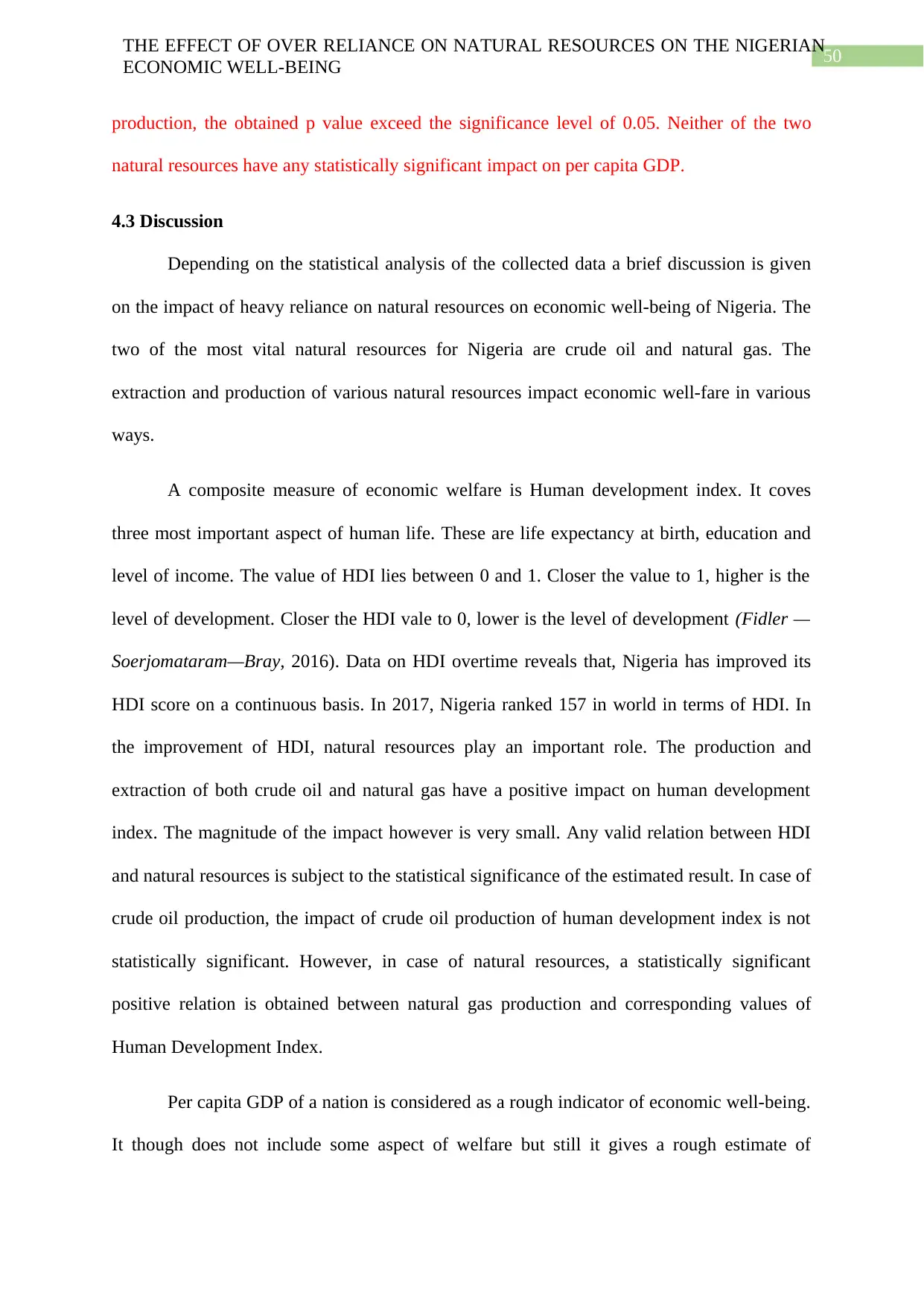
50
THE EFFECT OF OVER RELIANCE ON NATURAL RESOURCES ON THE NIGERIAN
ECONOMIC WELL-BEING
production, the obtained p value exceed the significance level of 0.05. Neither of the two
natural resources have any statistically significant impact on per capita GDP.
4.3 Discussion
Depending on the statistical analysis of the collected data a brief discussion is given
on the impact of heavy reliance on natural resources on economic well-being of Nigeria. The
two of the most vital natural resources for Nigeria are crude oil and natural gas. The
extraction and production of various natural resources impact economic well-fare in various
ways.
A composite measure of economic welfare is Human development index. It coves
three most important aspect of human life. These are life expectancy at birth, education and
level of income. The value of HDI lies between 0 and 1. Closer the value to 1, higher is the
level of development. Closer the HDI vale to 0, lower is the level of development (Fidler —
Soerjomataram—Bray, 2016). Data on HDI overtime reveals that, Nigeria has improved its
HDI score on a continuous basis. In 2017, Nigeria ranked 157 in world in terms of HDI. In
the improvement of HDI, natural resources play an important role. The production and
extraction of both crude oil and natural gas have a positive impact on human development
index. The magnitude of the impact however is very small. Any valid relation between HDI
and natural resources is subject to the statistical significance of the estimated result. In case of
crude oil production, the impact of crude oil production of human development index is not
statistically significant. However, in case of natural resources, a statistically significant
positive relation is obtained between natural gas production and corresponding values of
Human Development Index.
Per capita GDP of a nation is considered as a rough indicator of economic well-being.
It though does not include some aspect of welfare but still it gives a rough estimate of
THE EFFECT OF OVER RELIANCE ON NATURAL RESOURCES ON THE NIGERIAN
ECONOMIC WELL-BEING
production, the obtained p value exceed the significance level of 0.05. Neither of the two
natural resources have any statistically significant impact on per capita GDP.
4.3 Discussion
Depending on the statistical analysis of the collected data a brief discussion is given
on the impact of heavy reliance on natural resources on economic well-being of Nigeria. The
two of the most vital natural resources for Nigeria are crude oil and natural gas. The
extraction and production of various natural resources impact economic well-fare in various
ways.
A composite measure of economic welfare is Human development index. It coves
three most important aspect of human life. These are life expectancy at birth, education and
level of income. The value of HDI lies between 0 and 1. Closer the value to 1, higher is the
level of development. Closer the HDI vale to 0, lower is the level of development (Fidler —
Soerjomataram—Bray, 2016). Data on HDI overtime reveals that, Nigeria has improved its
HDI score on a continuous basis. In 2017, Nigeria ranked 157 in world in terms of HDI. In
the improvement of HDI, natural resources play an important role. The production and
extraction of both crude oil and natural gas have a positive impact on human development
index. The magnitude of the impact however is very small. Any valid relation between HDI
and natural resources is subject to the statistical significance of the estimated result. In case of
crude oil production, the impact of crude oil production of human development index is not
statistically significant. However, in case of natural resources, a statistically significant
positive relation is obtained between natural gas production and corresponding values of
Human Development Index.
Per capita GDP of a nation is considered as a rough indicator of economic well-being.
It though does not include some aspect of welfare but still it gives a rough estimate of
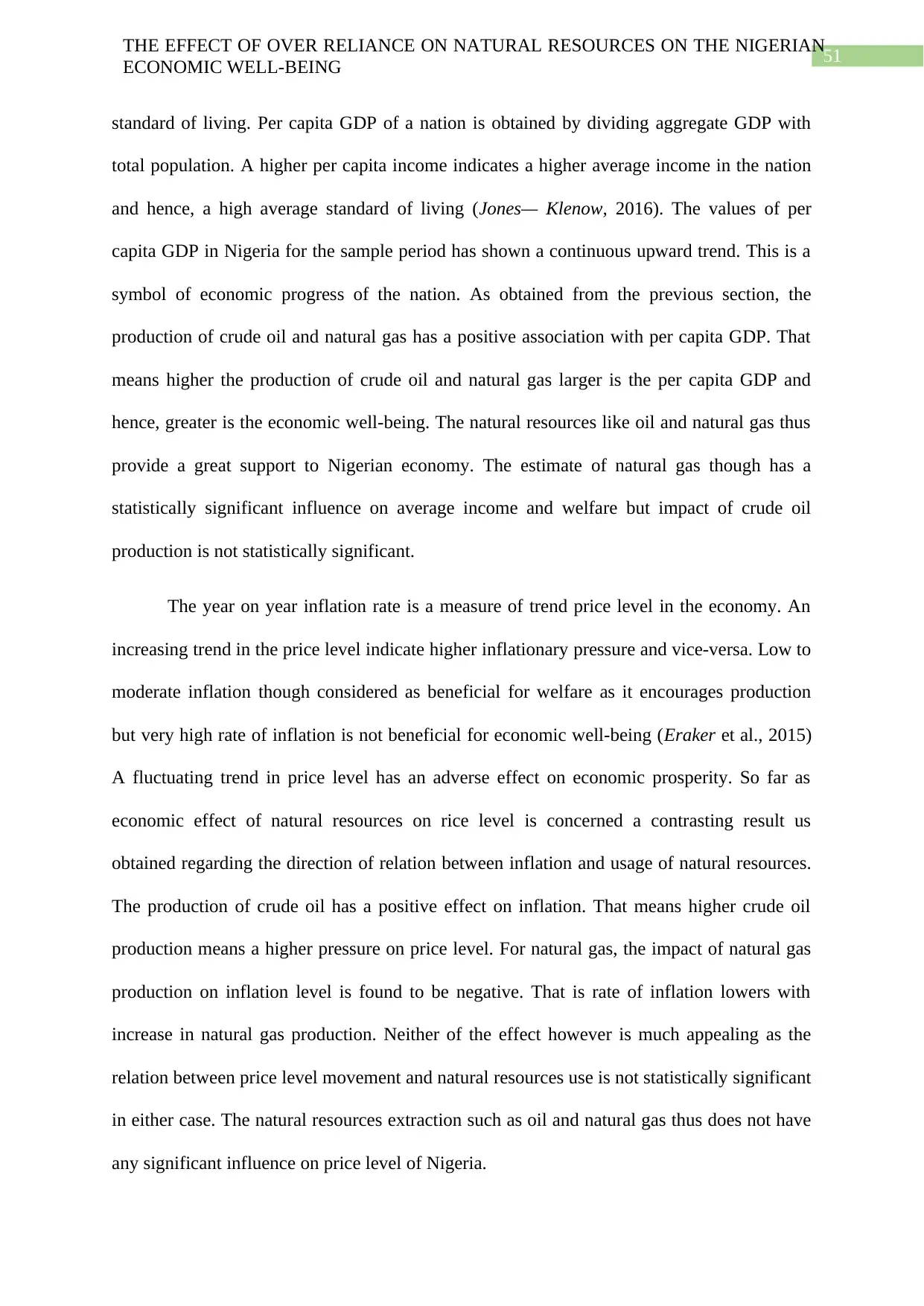
51
THE EFFECT OF OVER RELIANCE ON NATURAL RESOURCES ON THE NIGERIAN
ECONOMIC WELL-BEING
standard of living. Per capita GDP of a nation is obtained by dividing aggregate GDP with
total population. A higher per capita income indicates a higher average income in the nation
and hence, a high average standard of living (Jones— Klenow, 2016). The values of per
capita GDP in Nigeria for the sample period has shown a continuous upward trend. This is a
symbol of economic progress of the nation. As obtained from the previous section, the
production of crude oil and natural gas has a positive association with per capita GDP. That
means higher the production of crude oil and natural gas larger is the per capita GDP and
hence, greater is the economic well-being. The natural resources like oil and natural gas thus
provide a great support to Nigerian economy. The estimate of natural gas though has a
statistically significant influence on average income and welfare but impact of crude oil
production is not statistically significant.
The year on year inflation rate is a measure of trend price level in the economy. An
increasing trend in the price level indicate higher inflationary pressure and vice-versa. Low to
moderate inflation though considered as beneficial for welfare as it encourages production
but very high rate of inflation is not beneficial for economic well-being (Eraker et al., 2015)
A fluctuating trend in price level has an adverse effect on economic prosperity. So far as
economic effect of natural resources on rice level is concerned a contrasting result us
obtained regarding the direction of relation between inflation and usage of natural resources.
The production of crude oil has a positive effect on inflation. That means higher crude oil
production means a higher pressure on price level. For natural gas, the impact of natural gas
production on inflation level is found to be negative. That is rate of inflation lowers with
increase in natural gas production. Neither of the effect however is much appealing as the
relation between price level movement and natural resources use is not statistically significant
in either case. The natural resources extraction such as oil and natural gas thus does not have
any significant influence on price level of Nigeria.
THE EFFECT OF OVER RELIANCE ON NATURAL RESOURCES ON THE NIGERIAN
ECONOMIC WELL-BEING
standard of living. Per capita GDP of a nation is obtained by dividing aggregate GDP with
total population. A higher per capita income indicates a higher average income in the nation
and hence, a high average standard of living (Jones— Klenow, 2016). The values of per
capita GDP in Nigeria for the sample period has shown a continuous upward trend. This is a
symbol of economic progress of the nation. As obtained from the previous section, the
production of crude oil and natural gas has a positive association with per capita GDP. That
means higher the production of crude oil and natural gas larger is the per capita GDP and
hence, greater is the economic well-being. The natural resources like oil and natural gas thus
provide a great support to Nigerian economy. The estimate of natural gas though has a
statistically significant influence on average income and welfare but impact of crude oil
production is not statistically significant.
The year on year inflation rate is a measure of trend price level in the economy. An
increasing trend in the price level indicate higher inflationary pressure and vice-versa. Low to
moderate inflation though considered as beneficial for welfare as it encourages production
but very high rate of inflation is not beneficial for economic well-being (Eraker et al., 2015)
A fluctuating trend in price level has an adverse effect on economic prosperity. So far as
economic effect of natural resources on rice level is concerned a contrasting result us
obtained regarding the direction of relation between inflation and usage of natural resources.
The production of crude oil has a positive effect on inflation. That means higher crude oil
production means a higher pressure on price level. For natural gas, the impact of natural gas
production on inflation level is found to be negative. That is rate of inflation lowers with
increase in natural gas production. Neither of the effect however is much appealing as the
relation between price level movement and natural resources use is not statistically significant
in either case. The natural resources extraction such as oil and natural gas thus does not have
any significant influence on price level of Nigeria.
Secure Best Marks with AI Grader
Need help grading? Try our AI Grader for instant feedback on your assignments.
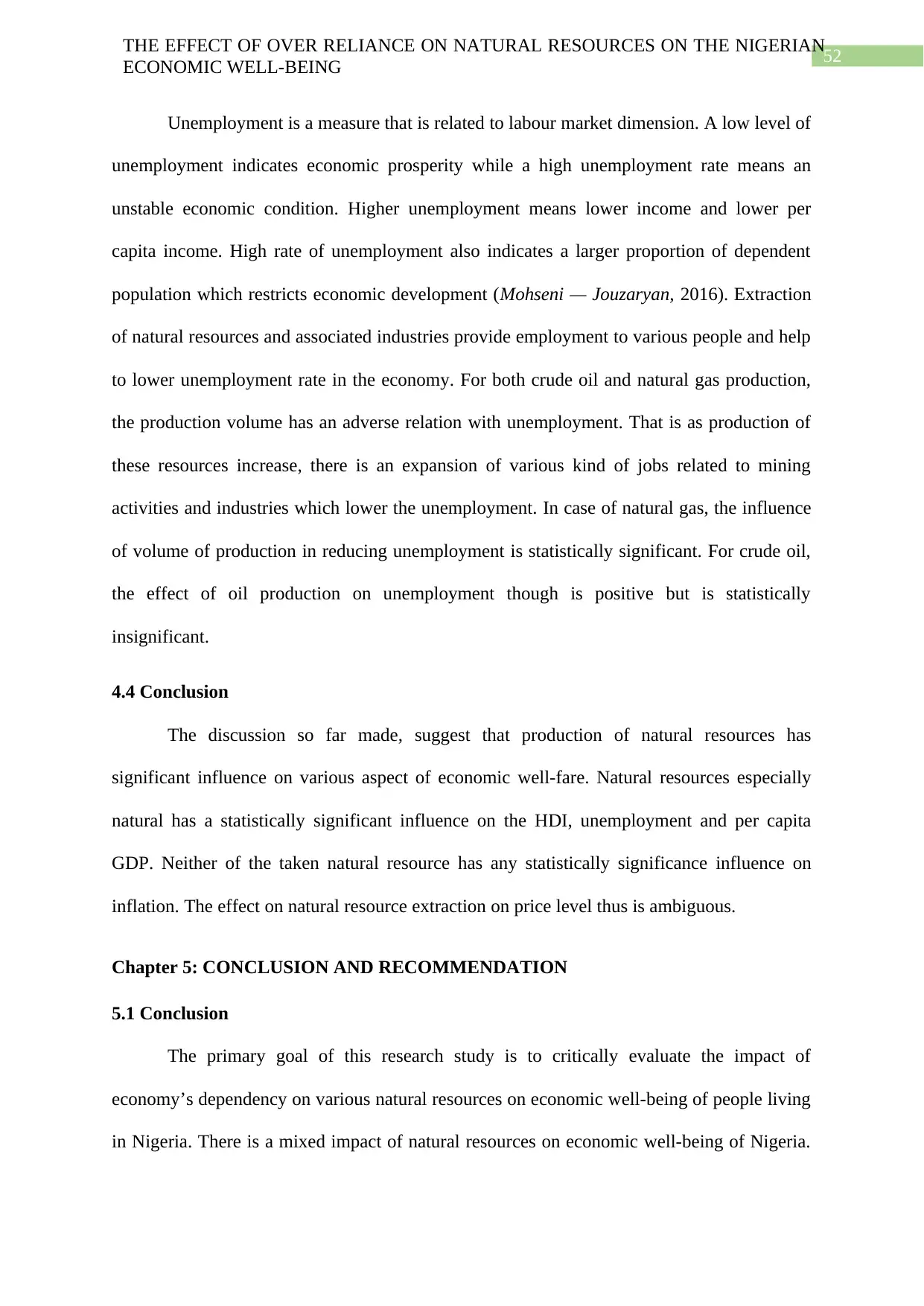
52
THE EFFECT OF OVER RELIANCE ON NATURAL RESOURCES ON THE NIGERIAN
ECONOMIC WELL-BEING
Unemployment is a measure that is related to labour market dimension. A low level of
unemployment indicates economic prosperity while a high unemployment rate means an
unstable economic condition. Higher unemployment means lower income and lower per
capita income. High rate of unemployment also indicates a larger proportion of dependent
population which restricts economic development (Mohseni — Jouzaryan, 2016). Extraction
of natural resources and associated industries provide employment to various people and help
to lower unemployment rate in the economy. For both crude oil and natural gas production,
the production volume has an adverse relation with unemployment. That is as production of
these resources increase, there is an expansion of various kind of jobs related to mining
activities and industries which lower the unemployment. In case of natural gas, the influence
of volume of production in reducing unemployment is statistically significant. For crude oil,
the effect of oil production on unemployment though is positive but is statistically
insignificant.
4.4 Conclusion
The discussion so far made, suggest that production of natural resources has
significant influence on various aspect of economic well-fare. Natural resources especially
natural has a statistically significant influence on the HDI, unemployment and per capita
GDP. Neither of the taken natural resource has any statistically significance influence on
inflation. The effect on natural resource extraction on price level thus is ambiguous.
Chapter 5: CONCLUSION AND RECOMMENDATION
5.1 Conclusion
The primary goal of this research study is to critically evaluate the impact of
economy’s dependency on various natural resources on economic well-being of people living
in Nigeria. There is a mixed impact of natural resources on economic well-being of Nigeria.
THE EFFECT OF OVER RELIANCE ON NATURAL RESOURCES ON THE NIGERIAN
ECONOMIC WELL-BEING
Unemployment is a measure that is related to labour market dimension. A low level of
unemployment indicates economic prosperity while a high unemployment rate means an
unstable economic condition. Higher unemployment means lower income and lower per
capita income. High rate of unemployment also indicates a larger proportion of dependent
population which restricts economic development (Mohseni — Jouzaryan, 2016). Extraction
of natural resources and associated industries provide employment to various people and help
to lower unemployment rate in the economy. For both crude oil and natural gas production,
the production volume has an adverse relation with unemployment. That is as production of
these resources increase, there is an expansion of various kind of jobs related to mining
activities and industries which lower the unemployment. In case of natural gas, the influence
of volume of production in reducing unemployment is statistically significant. For crude oil,
the effect of oil production on unemployment though is positive but is statistically
insignificant.
4.4 Conclusion
The discussion so far made, suggest that production of natural resources has
significant influence on various aspect of economic well-fare. Natural resources especially
natural has a statistically significant influence on the HDI, unemployment and per capita
GDP. Neither of the taken natural resource has any statistically significance influence on
inflation. The effect on natural resource extraction on price level thus is ambiguous.
Chapter 5: CONCLUSION AND RECOMMENDATION
5.1 Conclusion
The primary goal of this research study is to critically evaluate the impact of
economy’s dependency on various natural resources on economic well-being of people living
in Nigeria. There is a mixed impact of natural resources on economic well-being of Nigeria.
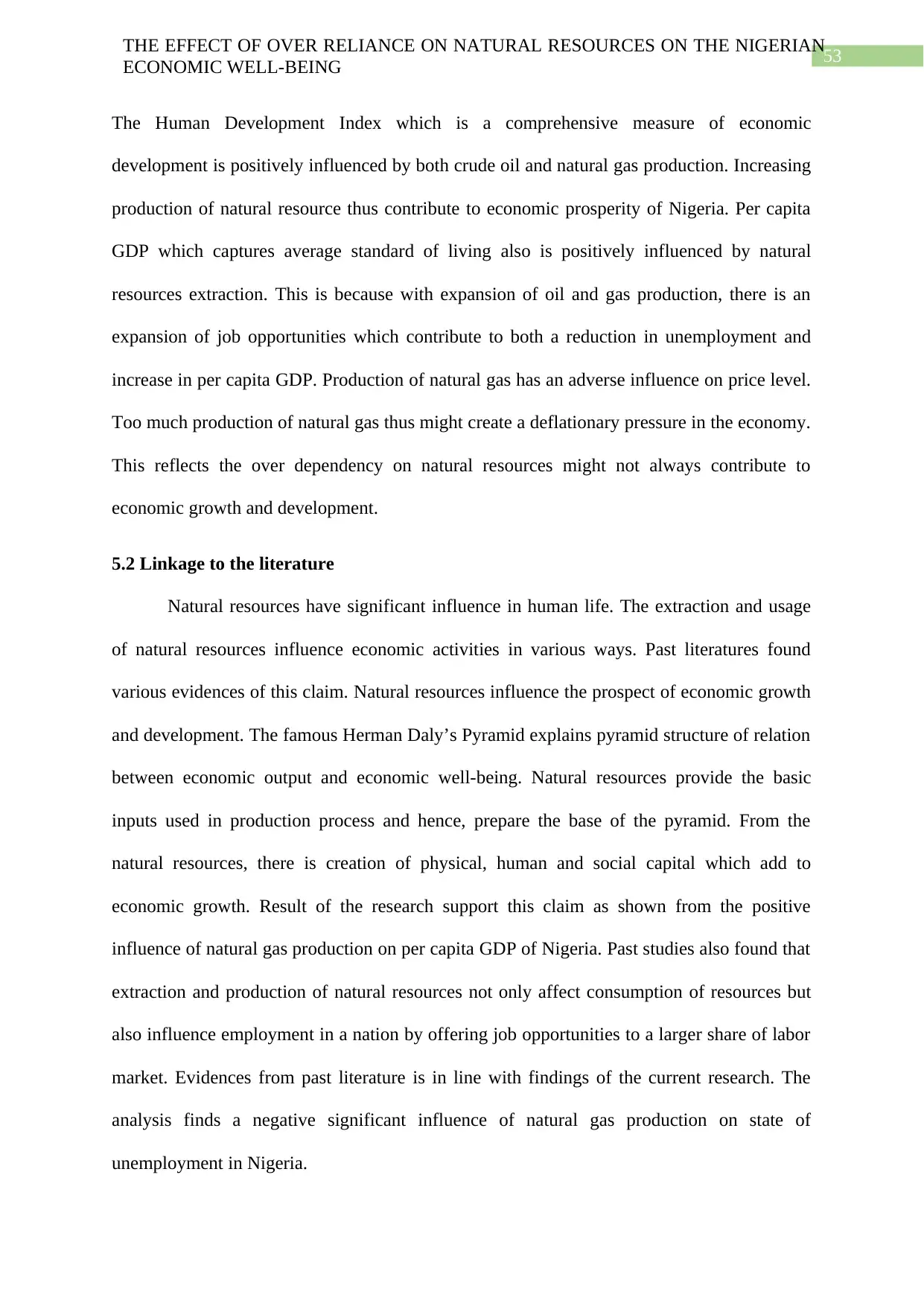
53
THE EFFECT OF OVER RELIANCE ON NATURAL RESOURCES ON THE NIGERIAN
ECONOMIC WELL-BEING
The Human Development Index which is a comprehensive measure of economic
development is positively influenced by both crude oil and natural gas production. Increasing
production of natural resource thus contribute to economic prosperity of Nigeria. Per capita
GDP which captures average standard of living also is positively influenced by natural
resources extraction. This is because with expansion of oil and gas production, there is an
expansion of job opportunities which contribute to both a reduction in unemployment and
increase in per capita GDP. Production of natural gas has an adverse influence on price level.
Too much production of natural gas thus might create a deflationary pressure in the economy.
This reflects the over dependency on natural resources might not always contribute to
economic growth and development.
5.2 Linkage to the literature
Natural resources have significant influence in human life. The extraction and usage
of natural resources influence economic activities in various ways. Past literatures found
various evidences of this claim. Natural resources influence the prospect of economic growth
and development. The famous Herman Daly’s Pyramid explains pyramid structure of relation
between economic output and economic well-being. Natural resources provide the basic
inputs used in production process and hence, prepare the base of the pyramid. From the
natural resources, there is creation of physical, human and social capital which add to
economic growth. Result of the research support this claim as shown from the positive
influence of natural gas production on per capita GDP of Nigeria. Past studies also found that
extraction and production of natural resources not only affect consumption of resources but
also influence employment in a nation by offering job opportunities to a larger share of labor
market. Evidences from past literature is in line with findings of the current research. The
analysis finds a negative significant influence of natural gas production on state of
unemployment in Nigeria.
THE EFFECT OF OVER RELIANCE ON NATURAL RESOURCES ON THE NIGERIAN
ECONOMIC WELL-BEING
The Human Development Index which is a comprehensive measure of economic
development is positively influenced by both crude oil and natural gas production. Increasing
production of natural resource thus contribute to economic prosperity of Nigeria. Per capita
GDP which captures average standard of living also is positively influenced by natural
resources extraction. This is because with expansion of oil and gas production, there is an
expansion of job opportunities which contribute to both a reduction in unemployment and
increase in per capita GDP. Production of natural gas has an adverse influence on price level.
Too much production of natural gas thus might create a deflationary pressure in the economy.
This reflects the over dependency on natural resources might not always contribute to
economic growth and development.
5.2 Linkage to the literature
Natural resources have significant influence in human life. The extraction and usage
of natural resources influence economic activities in various ways. Past literatures found
various evidences of this claim. Natural resources influence the prospect of economic growth
and development. The famous Herman Daly’s Pyramid explains pyramid structure of relation
between economic output and economic well-being. Natural resources provide the basic
inputs used in production process and hence, prepare the base of the pyramid. From the
natural resources, there is creation of physical, human and social capital which add to
economic growth. Result of the research support this claim as shown from the positive
influence of natural gas production on per capita GDP of Nigeria. Past studies also found that
extraction and production of natural resources not only affect consumption of resources but
also influence employment in a nation by offering job opportunities to a larger share of labor
market. Evidences from past literature is in line with findings of the current research. The
analysis finds a negative significant influence of natural gas production on state of
unemployment in Nigeria.
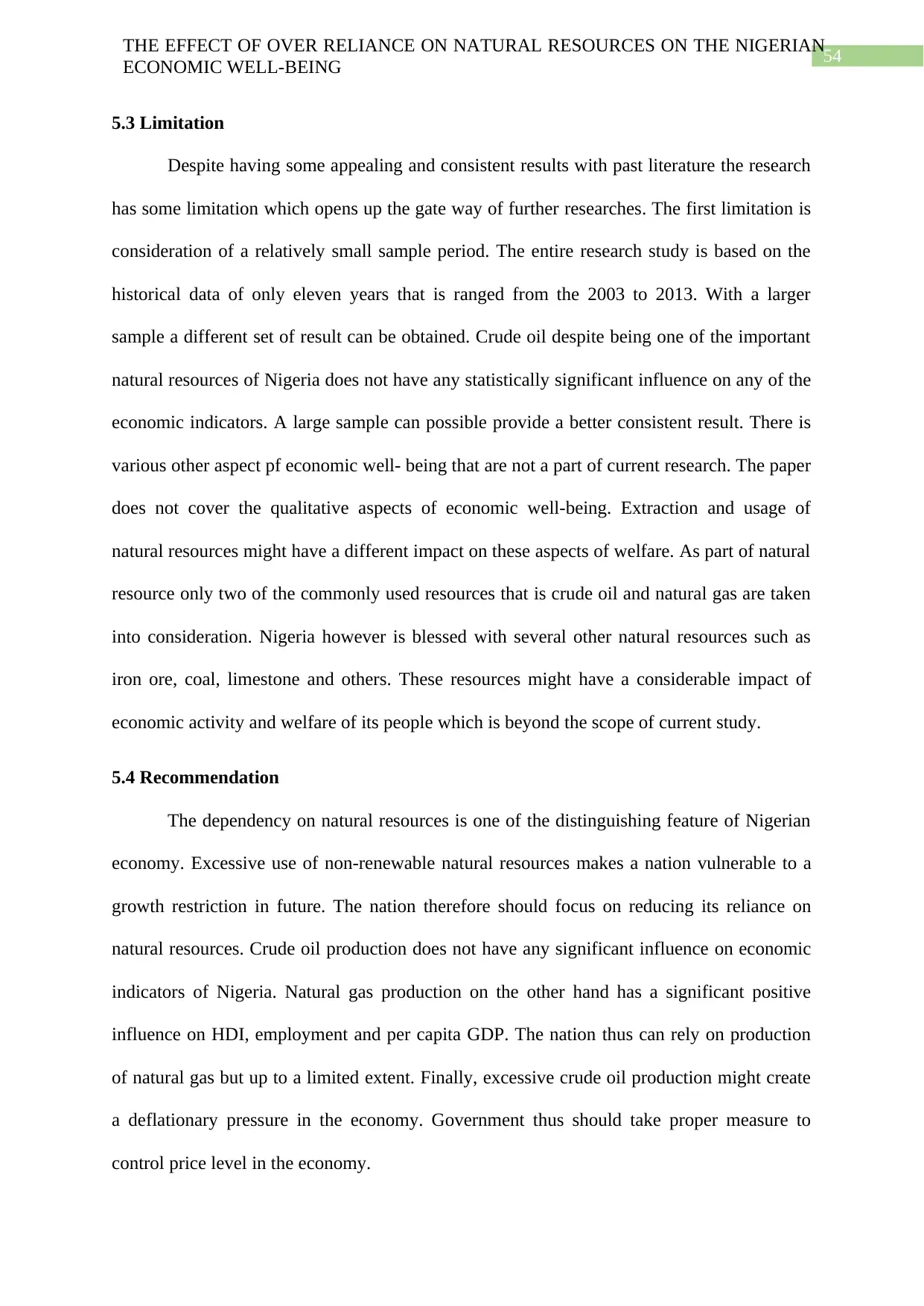
54
THE EFFECT OF OVER RELIANCE ON NATURAL RESOURCES ON THE NIGERIAN
ECONOMIC WELL-BEING
5.3 Limitation
Despite having some appealing and consistent results with past literature the research
has some limitation which opens up the gate way of further researches. The first limitation is
consideration of a relatively small sample period. The entire research study is based on the
historical data of only eleven years that is ranged from the 2003 to 2013. With a larger
sample a different set of result can be obtained. Crude oil despite being one of the important
natural resources of Nigeria does not have any statistically significant influence on any of the
economic indicators. A large sample can possible provide a better consistent result. There is
various other aspect pf economic well- being that are not a part of current research. The paper
does not cover the qualitative aspects of economic well-being. Extraction and usage of
natural resources might have a different impact on these aspects of welfare. As part of natural
resource only two of the commonly used resources that is crude oil and natural gas are taken
into consideration. Nigeria however is blessed with several other natural resources such as
iron ore, coal, limestone and others. These resources might have a considerable impact of
economic activity and welfare of its people which is beyond the scope of current study.
5.4 Recommendation
The dependency on natural resources is one of the distinguishing feature of Nigerian
economy. Excessive use of non-renewable natural resources makes a nation vulnerable to a
growth restriction in future. The nation therefore should focus on reducing its reliance on
natural resources. Crude oil production does not have any significant influence on economic
indicators of Nigeria. Natural gas production on the other hand has a significant positive
influence on HDI, employment and per capita GDP. The nation thus can rely on production
of natural gas but up to a limited extent. Finally, excessive crude oil production might create
a deflationary pressure in the economy. Government thus should take proper measure to
control price level in the economy.
THE EFFECT OF OVER RELIANCE ON NATURAL RESOURCES ON THE NIGERIAN
ECONOMIC WELL-BEING
5.3 Limitation
Despite having some appealing and consistent results with past literature the research
has some limitation which opens up the gate way of further researches. The first limitation is
consideration of a relatively small sample period. The entire research study is based on the
historical data of only eleven years that is ranged from the 2003 to 2013. With a larger
sample a different set of result can be obtained. Crude oil despite being one of the important
natural resources of Nigeria does not have any statistically significant influence on any of the
economic indicators. A large sample can possible provide a better consistent result. There is
various other aspect pf economic well- being that are not a part of current research. The paper
does not cover the qualitative aspects of economic well-being. Extraction and usage of
natural resources might have a different impact on these aspects of welfare. As part of natural
resource only two of the commonly used resources that is crude oil and natural gas are taken
into consideration. Nigeria however is blessed with several other natural resources such as
iron ore, coal, limestone and others. These resources might have a considerable impact of
economic activity and welfare of its people which is beyond the scope of current study.
5.4 Recommendation
The dependency on natural resources is one of the distinguishing feature of Nigerian
economy. Excessive use of non-renewable natural resources makes a nation vulnerable to a
growth restriction in future. The nation therefore should focus on reducing its reliance on
natural resources. Crude oil production does not have any significant influence on economic
indicators of Nigeria. Natural gas production on the other hand has a significant positive
influence on HDI, employment and per capita GDP. The nation thus can rely on production
of natural gas but up to a limited extent. Finally, excessive crude oil production might create
a deflationary pressure in the economy. Government thus should take proper measure to
control price level in the economy.
Paraphrase This Document
Need a fresh take? Get an instant paraphrase of this document with our AI Paraphraser
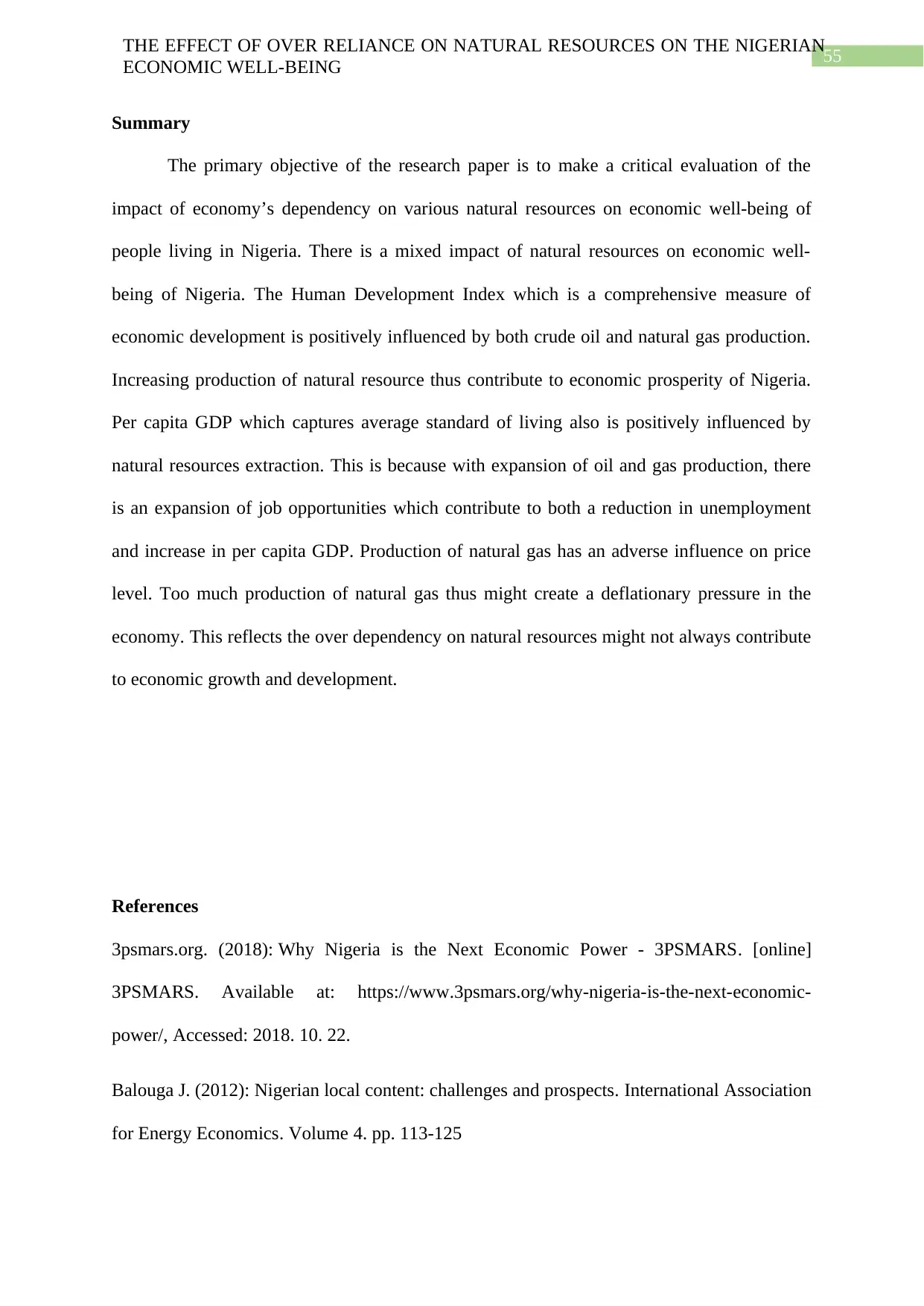
55
THE EFFECT OF OVER RELIANCE ON NATURAL RESOURCES ON THE NIGERIAN
ECONOMIC WELL-BEING
Summary
The primary objective of the research paper is to make a critical evaluation of the
impact of economy’s dependency on various natural resources on economic well-being of
people living in Nigeria. There is a mixed impact of natural resources on economic well-
being of Nigeria. The Human Development Index which is a comprehensive measure of
economic development is positively influenced by both crude oil and natural gas production.
Increasing production of natural resource thus contribute to economic prosperity of Nigeria.
Per capita GDP which captures average standard of living also is positively influenced by
natural resources extraction. This is because with expansion of oil and gas production, there
is an expansion of job opportunities which contribute to both a reduction in unemployment
and increase in per capita GDP. Production of natural gas has an adverse influence on price
level. Too much production of natural gas thus might create a deflationary pressure in the
economy. This reflects the over dependency on natural resources might not always contribute
to economic growth and development.
References
3psmars.org. (2018): Why Nigeria is the Next Economic Power - 3PSMARS. [online]
3PSMARS. Available at: https://www.3psmars.org/why-nigeria-is-the-next-economic-
power/, Accessed: 2018. 10. 22.
Balouga J. (2012): Nigerian local content: challenges and prospects. International Association
for Energy Economics. Volume 4. pp. 113-125
THE EFFECT OF OVER RELIANCE ON NATURAL RESOURCES ON THE NIGERIAN
ECONOMIC WELL-BEING
Summary
The primary objective of the research paper is to make a critical evaluation of the
impact of economy’s dependency on various natural resources on economic well-being of
people living in Nigeria. There is a mixed impact of natural resources on economic well-
being of Nigeria. The Human Development Index which is a comprehensive measure of
economic development is positively influenced by both crude oil and natural gas production.
Increasing production of natural resource thus contribute to economic prosperity of Nigeria.
Per capita GDP which captures average standard of living also is positively influenced by
natural resources extraction. This is because with expansion of oil and gas production, there
is an expansion of job opportunities which contribute to both a reduction in unemployment
and increase in per capita GDP. Production of natural gas has an adverse influence on price
level. Too much production of natural gas thus might create a deflationary pressure in the
economy. This reflects the over dependency on natural resources might not always contribute
to economic growth and development.
References
3psmars.org. (2018): Why Nigeria is the Next Economic Power - 3PSMARS. [online]
3PSMARS. Available at: https://www.3psmars.org/why-nigeria-is-the-next-economic-
power/, Accessed: 2018. 10. 22.
Balouga J. (2012): Nigerian local content: challenges and prospects. International Association
for Energy Economics. Volume 4. pp. 113-125
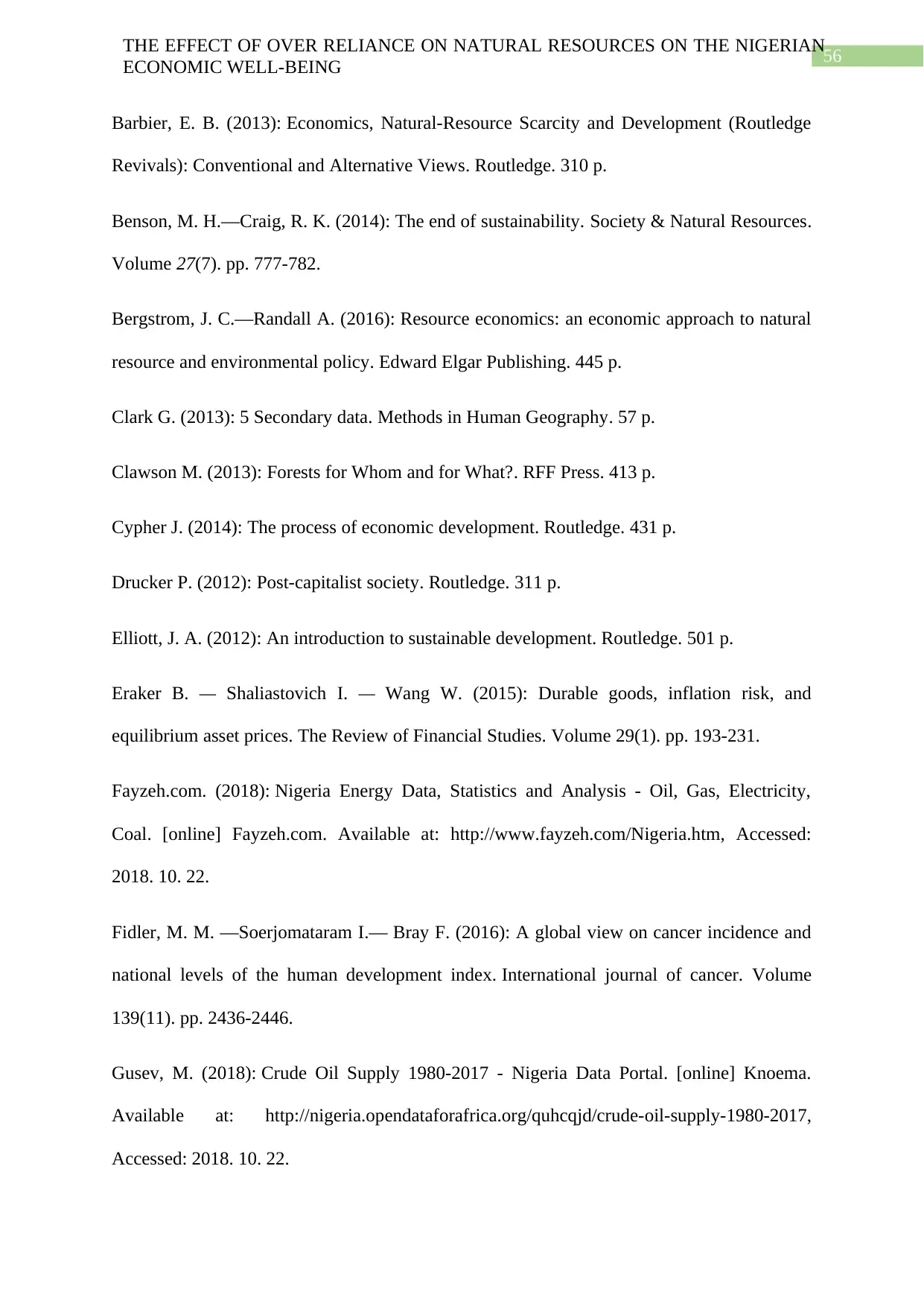
56
THE EFFECT OF OVER RELIANCE ON NATURAL RESOURCES ON THE NIGERIAN
ECONOMIC WELL-BEING
Barbier, E. B. (2013): Economics, Natural-Resource Scarcity and Development (Routledge
Revivals): Conventional and Alternative Views. Routledge. 310 p.
Benson, M. H.—Craig, R. K. (2014): The end of sustainability. Society & Natural Resources.
Volume 27(7). pp. 777-782.
Bergstrom, J. C.—Randall A. (2016): Resource economics: an economic approach to natural
resource and environmental policy. Edward Elgar Publishing. 445 p.
Clark G. (2013): 5 Secondary data. Methods in Human Geography. 57 p.
Clawson M. (2013): Forests for Whom and for What?. RFF Press. 413 p.
Cypher J. (2014): The process of economic development. Routledge. 431 p.
Drucker P. (2012): Post-capitalist society. Routledge. 311 p.
Elliott, J. A. (2012): An introduction to sustainable development. Routledge. 501 p.
Eraker B. — Shaliastovich I. — Wang W. (2015): Durable goods, inflation risk, and
equilibrium asset prices. The Review of Financial Studies. Volume 29(1). pp. 193-231.
Fayzeh.com. (2018): Nigeria Energy Data, Statistics and Analysis - Oil, Gas, Electricity,
Coal. [online] Fayzeh.com. Available at: http://www.fayzeh.com/Nigeria.htm, Accessed:
2018. 10. 22.
Fidler, M. M. —Soerjomataram I.— Bray F. (2016): A global view on cancer incidence and
national levels of the human development index. International journal of cancer. Volume
139(11). pp. 2436-2446.
Gusev, M. (2018): Crude Oil Supply 1980-2017 - Nigeria Data Portal. [online] Knoema.
Available at: http://nigeria.opendataforafrica.org/quhcqjd/crude-oil-supply-1980-2017,
Accessed: 2018. 10. 22.
THE EFFECT OF OVER RELIANCE ON NATURAL RESOURCES ON THE NIGERIAN
ECONOMIC WELL-BEING
Barbier, E. B. (2013): Economics, Natural-Resource Scarcity and Development (Routledge
Revivals): Conventional and Alternative Views. Routledge. 310 p.
Benson, M. H.—Craig, R. K. (2014): The end of sustainability. Society & Natural Resources.
Volume 27(7). pp. 777-782.
Bergstrom, J. C.—Randall A. (2016): Resource economics: an economic approach to natural
resource and environmental policy. Edward Elgar Publishing. 445 p.
Clark G. (2013): 5 Secondary data. Methods in Human Geography. 57 p.
Clawson M. (2013): Forests for Whom and for What?. RFF Press. 413 p.
Cypher J. (2014): The process of economic development. Routledge. 431 p.
Drucker P. (2012): Post-capitalist society. Routledge. 311 p.
Elliott, J. A. (2012): An introduction to sustainable development. Routledge. 501 p.
Eraker B. — Shaliastovich I. — Wang W. (2015): Durable goods, inflation risk, and
equilibrium asset prices. The Review of Financial Studies. Volume 29(1). pp. 193-231.
Fayzeh.com. (2018): Nigeria Energy Data, Statistics and Analysis - Oil, Gas, Electricity,
Coal. [online] Fayzeh.com. Available at: http://www.fayzeh.com/Nigeria.htm, Accessed:
2018. 10. 22.
Fidler, M. M. —Soerjomataram I.— Bray F. (2016): A global view on cancer incidence and
national levels of the human development index. International journal of cancer. Volume
139(11). pp. 2436-2446.
Gusev, M. (2018): Crude Oil Supply 1980-2017 - Nigeria Data Portal. [online] Knoema.
Available at: http://nigeria.opendataforafrica.org/quhcqjd/crude-oil-supply-1980-2017,
Accessed: 2018. 10. 22.
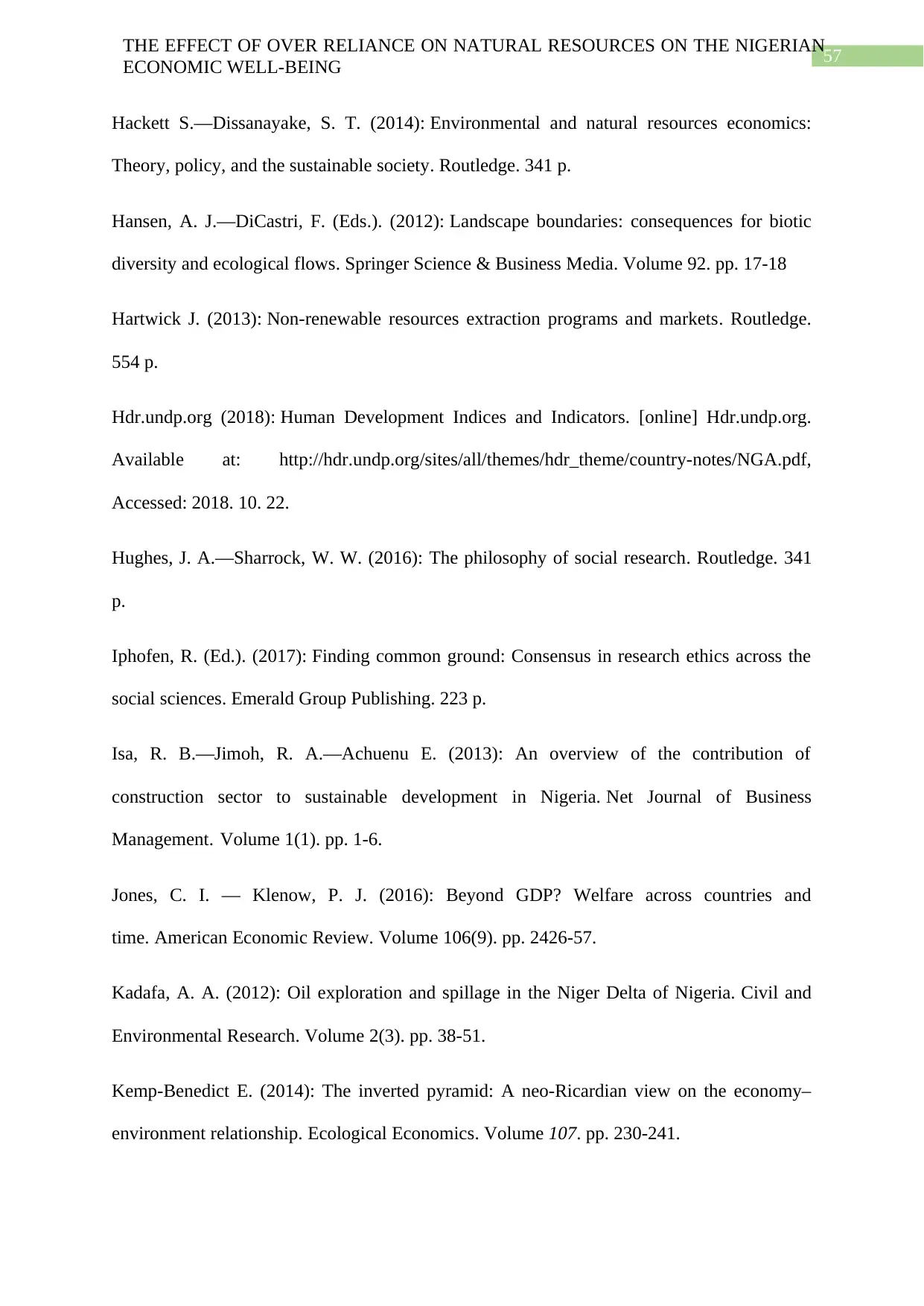
57
THE EFFECT OF OVER RELIANCE ON NATURAL RESOURCES ON THE NIGERIAN
ECONOMIC WELL-BEING
Hackett S.—Dissanayake, S. T. (2014): Environmental and natural resources economics:
Theory, policy, and the sustainable society. Routledge. 341 p.
Hansen, A. J.—DiCastri, F. (Eds.). (2012): Landscape boundaries: consequences for biotic
diversity and ecological flows. Springer Science & Business Media. Volume 92. pp. 17-18
Hartwick J. (2013): Non-renewable resources extraction programs and markets. Routledge.
554 p.
Hdr.undp.org (2018): Human Development Indices and Indicators. [online] Hdr.undp.org.
Available at: http://hdr.undp.org/sites/all/themes/hdr_theme/country-notes/NGA.pdf,
Accessed: 2018. 10. 22.
Hughes, J. A.—Sharrock, W. W. (2016): The philosophy of social research. Routledge. 341
p.
Iphofen, R. (Ed.). (2017): Finding common ground: Consensus in research ethics across the
social sciences. Emerald Group Publishing. 223 p.
Isa, R. B.—Jimoh, R. A.—Achuenu E. (2013): An overview of the contribution of
construction sector to sustainable development in Nigeria. Net Journal of Business
Management. Volume 1(1). pp. 1-6.
Jones, C. I. — Klenow, P. J. (2016): Beyond GDP? Welfare across countries and
time. American Economic Review. Volume 106(9). pp. 2426-57.
Kadafa, A. A. (2012): Oil exploration and spillage in the Niger Delta of Nigeria. Civil and
Environmental Research. Volume 2(3). pp. 38-51.
Kemp-Benedict E. (2014): The inverted pyramid: A neo-Ricardian view on the economy–
environment relationship. Ecological Economics. Volume 107. pp. 230-241.
THE EFFECT OF OVER RELIANCE ON NATURAL RESOURCES ON THE NIGERIAN
ECONOMIC WELL-BEING
Hackett S.—Dissanayake, S. T. (2014): Environmental and natural resources economics:
Theory, policy, and the sustainable society. Routledge. 341 p.
Hansen, A. J.—DiCastri, F. (Eds.). (2012): Landscape boundaries: consequences for biotic
diversity and ecological flows. Springer Science & Business Media. Volume 92. pp. 17-18
Hartwick J. (2013): Non-renewable resources extraction programs and markets. Routledge.
554 p.
Hdr.undp.org (2018): Human Development Indices and Indicators. [online] Hdr.undp.org.
Available at: http://hdr.undp.org/sites/all/themes/hdr_theme/country-notes/NGA.pdf,
Accessed: 2018. 10. 22.
Hughes, J. A.—Sharrock, W. W. (2016): The philosophy of social research. Routledge. 341
p.
Iphofen, R. (Ed.). (2017): Finding common ground: Consensus in research ethics across the
social sciences. Emerald Group Publishing. 223 p.
Isa, R. B.—Jimoh, R. A.—Achuenu E. (2013): An overview of the contribution of
construction sector to sustainable development in Nigeria. Net Journal of Business
Management. Volume 1(1). pp. 1-6.
Jones, C. I. — Klenow, P. J. (2016): Beyond GDP? Welfare across countries and
time. American Economic Review. Volume 106(9). pp. 2426-57.
Kadafa, A. A. (2012): Oil exploration and spillage in the Niger Delta of Nigeria. Civil and
Environmental Research. Volume 2(3). pp. 38-51.
Kemp-Benedict E. (2014): The inverted pyramid: A neo-Ricardian view on the economy–
environment relationship. Ecological Economics. Volume 107. pp. 230-241.
Secure Best Marks with AI Grader
Need help grading? Try our AI Grader for instant feedback on your assignments.
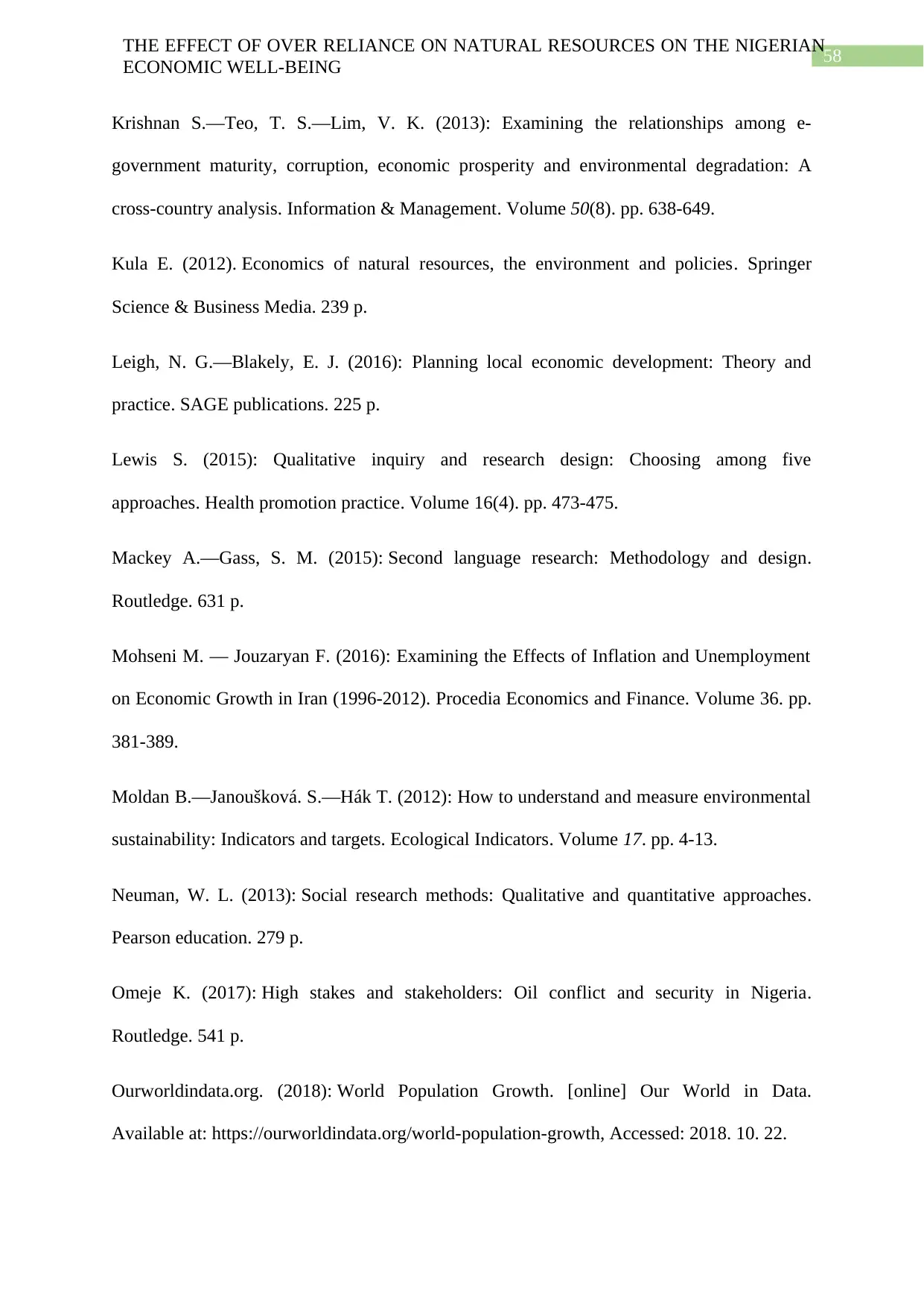
58
THE EFFECT OF OVER RELIANCE ON NATURAL RESOURCES ON THE NIGERIAN
ECONOMIC WELL-BEING
Krishnan S.—Teo, T. S.—Lim, V. K. (2013): Examining the relationships among e-
government maturity, corruption, economic prosperity and environmental degradation: A
cross-country analysis. Information & Management. Volume 50(8). pp. 638-649.
Kula E. (2012). Economics of natural resources, the environment and policies. Springer
Science & Business Media. 239 p.
Leigh, N. G.—Blakely, E. J. (2016): Planning local economic development: Theory and
practice. SAGE publications. 225 p.
Lewis S. (2015): Qualitative inquiry and research design: Choosing among five
approaches. Health promotion practice. Volume 16(4). pp. 473-475.
Mackey A.—Gass, S. M. (2015): Second language research: Methodology and design.
Routledge. 631 p.
Mohseni M. — Jouzaryan F. (2016): Examining the Effects of Inflation and Unemployment
on Economic Growth in Iran (1996-2012). Procedia Economics and Finance. Volume 36. pp.
381-389.
Moldan B.—Janoušková. S.—Hák T. (2012): How to understand and measure environmental
sustainability: Indicators and targets. Ecological Indicators. Volume 17. pp. 4-13.
Neuman, W. L. (2013): Social research methods: Qualitative and quantitative approaches.
Pearson education. 279 p.
Omeje K. (2017): High stakes and stakeholders: Oil conflict and security in Nigeria.
Routledge. 541 p.
Ourworldindata.org. (2018): World Population Growth. [online] Our World in Data.
Available at: https://ourworldindata.org/world-population-growth, Accessed: 2018. 10. 22.
THE EFFECT OF OVER RELIANCE ON NATURAL RESOURCES ON THE NIGERIAN
ECONOMIC WELL-BEING
Krishnan S.—Teo, T. S.—Lim, V. K. (2013): Examining the relationships among e-
government maturity, corruption, economic prosperity and environmental degradation: A
cross-country analysis. Information & Management. Volume 50(8). pp. 638-649.
Kula E. (2012). Economics of natural resources, the environment and policies. Springer
Science & Business Media. 239 p.
Leigh, N. G.—Blakely, E. J. (2016): Planning local economic development: Theory and
practice. SAGE publications. 225 p.
Lewis S. (2015): Qualitative inquiry and research design: Choosing among five
approaches. Health promotion practice. Volume 16(4). pp. 473-475.
Mackey A.—Gass, S. M. (2015): Second language research: Methodology and design.
Routledge. 631 p.
Mohseni M. — Jouzaryan F. (2016): Examining the Effects of Inflation and Unemployment
on Economic Growth in Iran (1996-2012). Procedia Economics and Finance. Volume 36. pp.
381-389.
Moldan B.—Janoušková. S.—Hák T. (2012): How to understand and measure environmental
sustainability: Indicators and targets. Ecological Indicators. Volume 17. pp. 4-13.
Neuman, W. L. (2013): Social research methods: Qualitative and quantitative approaches.
Pearson education. 279 p.
Omeje K. (2017): High stakes and stakeholders: Oil conflict and security in Nigeria.
Routledge. 541 p.
Ourworldindata.org. (2018): World Population Growth. [online] Our World in Data.
Available at: https://ourworldindata.org/world-population-growth, Accessed: 2018. 10. 22.
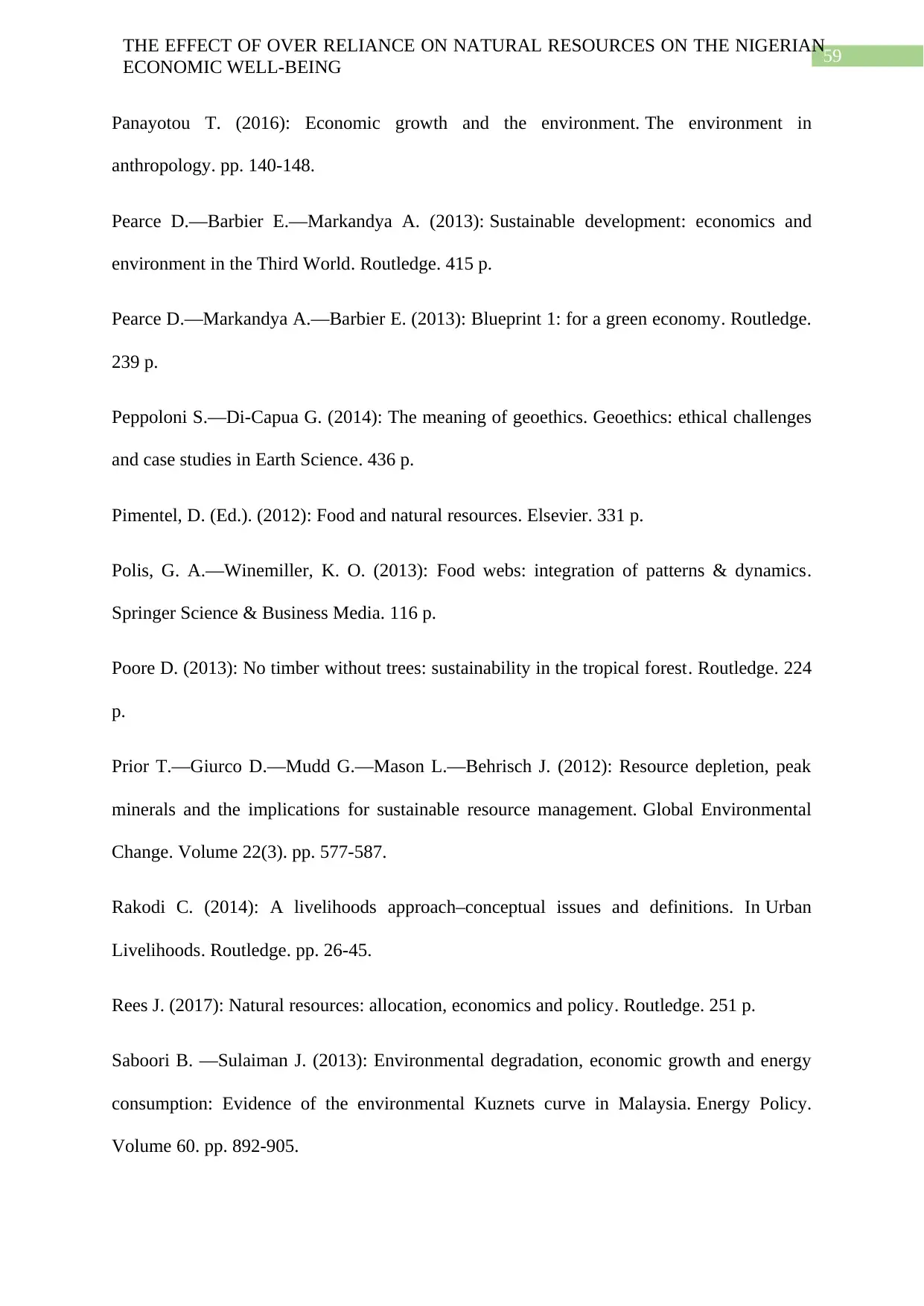
59
THE EFFECT OF OVER RELIANCE ON NATURAL RESOURCES ON THE NIGERIAN
ECONOMIC WELL-BEING
Panayotou T. (2016): Economic growth and the environment. The environment in
anthropology. pp. 140-148.
Pearce D.—Barbier E.—Markandya A. (2013): Sustainable development: economics and
environment in the Third World. Routledge. 415 p.
Pearce D.—Markandya A.—Barbier E. (2013): Blueprint 1: for a green economy. Routledge.
239 p.
Peppoloni S.—Di-Capua G. (2014): The meaning of geoethics. Geoethics: ethical challenges
and case studies in Earth Science. 436 p.
Pimentel, D. (Ed.). (2012): Food and natural resources. Elsevier. 331 p.
Polis, G. A.—Winemiller, K. O. (2013): Food webs: integration of patterns & dynamics.
Springer Science & Business Media. 116 p.
Poore D. (2013): No timber without trees: sustainability in the tropical forest. Routledge. 224
p.
Prior T.—Giurco D.—Mudd G.—Mason L.—Behrisch J. (2012): Resource depletion, peak
minerals and the implications for sustainable resource management. Global Environmental
Change. Volume 22(3). pp. 577-587.
Rakodi C. (2014): A livelihoods approach–conceptual issues and definitions. In Urban
Livelihoods. Routledge. pp. 26-45.
Rees J. (2017): Natural resources: allocation, economics and policy. Routledge. 251 p.
Saboori B. —Sulaiman J. (2013): Environmental degradation, economic growth and energy
consumption: Evidence of the environmental Kuznets curve in Malaysia. Energy Policy.
Volume 60. pp. 892-905.
THE EFFECT OF OVER RELIANCE ON NATURAL RESOURCES ON THE NIGERIAN
ECONOMIC WELL-BEING
Panayotou T. (2016): Economic growth and the environment. The environment in
anthropology. pp. 140-148.
Pearce D.—Barbier E.—Markandya A. (2013): Sustainable development: economics and
environment in the Third World. Routledge. 415 p.
Pearce D.—Markandya A.—Barbier E. (2013): Blueprint 1: for a green economy. Routledge.
239 p.
Peppoloni S.—Di-Capua G. (2014): The meaning of geoethics. Geoethics: ethical challenges
and case studies in Earth Science. 436 p.
Pimentel, D. (Ed.). (2012): Food and natural resources. Elsevier. 331 p.
Polis, G. A.—Winemiller, K. O. (2013): Food webs: integration of patterns & dynamics.
Springer Science & Business Media. 116 p.
Poore D. (2013): No timber without trees: sustainability in the tropical forest. Routledge. 224
p.
Prior T.—Giurco D.—Mudd G.—Mason L.—Behrisch J. (2012): Resource depletion, peak
minerals and the implications for sustainable resource management. Global Environmental
Change. Volume 22(3). pp. 577-587.
Rakodi C. (2014): A livelihoods approach–conceptual issues and definitions. In Urban
Livelihoods. Routledge. pp. 26-45.
Rees J. (2017): Natural resources: allocation, economics and policy. Routledge. 251 p.
Saboori B. —Sulaiman J. (2013): Environmental degradation, economic growth and energy
consumption: Evidence of the environmental Kuznets curve in Malaysia. Energy Policy.
Volume 60. pp. 892-905.
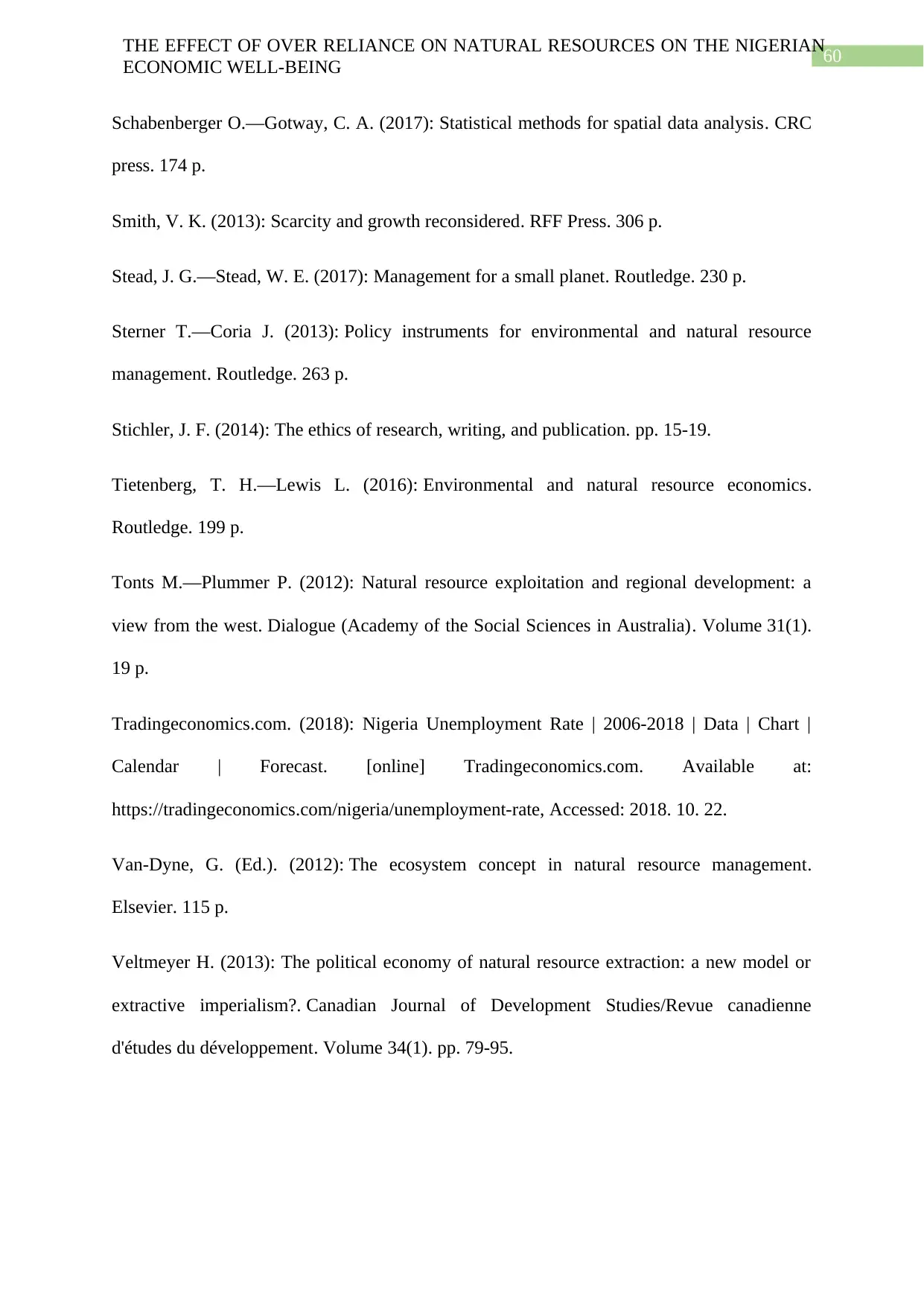
60
THE EFFECT OF OVER RELIANCE ON NATURAL RESOURCES ON THE NIGERIAN
ECONOMIC WELL-BEING
Schabenberger O.—Gotway, C. A. (2017): Statistical methods for spatial data analysis. CRC
press. 174 p.
Smith, V. K. (2013): Scarcity and growth reconsidered. RFF Press. 306 p.
Stead, J. G.—Stead, W. E. (2017): Management for a small planet. Routledge. 230 p.
Sterner T.—Coria J. (2013): Policy instruments for environmental and natural resource
management. Routledge. 263 p.
Stichler, J. F. (2014): The ethics of research, writing, and publication. pp. 15-19.
Tietenberg, T. H.—Lewis L. (2016): Environmental and natural resource economics.
Routledge. 199 p.
Tonts M.—Plummer P. (2012): Natural resource exploitation and regional development: a
view from the west. Dialogue (Academy of the Social Sciences in Australia). Volume 31(1).
19 p.
Tradingeconomics.com. (2018): Nigeria Unemployment Rate | 2006-2018 | Data | Chart |
Calendar | Forecast. [online] Tradingeconomics.com. Available at:
https://tradingeconomics.com/nigeria/unemployment-rate, Accessed: 2018. 10. 22.
Van-Dyne, G. (Ed.). (2012): The ecosystem concept in natural resource management.
Elsevier. 115 p.
Veltmeyer H. (2013): The political economy of natural resource extraction: a new model or
extractive imperialism?. Canadian Journal of Development Studies/Revue canadienne
d'études du développement. Volume 34(1). pp. 79-95.
THE EFFECT OF OVER RELIANCE ON NATURAL RESOURCES ON THE NIGERIAN
ECONOMIC WELL-BEING
Schabenberger O.—Gotway, C. A. (2017): Statistical methods for spatial data analysis. CRC
press. 174 p.
Smith, V. K. (2013): Scarcity and growth reconsidered. RFF Press. 306 p.
Stead, J. G.—Stead, W. E. (2017): Management for a small planet. Routledge. 230 p.
Sterner T.—Coria J. (2013): Policy instruments for environmental and natural resource
management. Routledge. 263 p.
Stichler, J. F. (2014): The ethics of research, writing, and publication. pp. 15-19.
Tietenberg, T. H.—Lewis L. (2016): Environmental and natural resource economics.
Routledge. 199 p.
Tonts M.—Plummer P. (2012): Natural resource exploitation and regional development: a
view from the west. Dialogue (Academy of the Social Sciences in Australia). Volume 31(1).
19 p.
Tradingeconomics.com. (2018): Nigeria Unemployment Rate | 2006-2018 | Data | Chart |
Calendar | Forecast. [online] Tradingeconomics.com. Available at:
https://tradingeconomics.com/nigeria/unemployment-rate, Accessed: 2018. 10. 22.
Van-Dyne, G. (Ed.). (2012): The ecosystem concept in natural resource management.
Elsevier. 115 p.
Veltmeyer H. (2013): The political economy of natural resource extraction: a new model or
extractive imperialism?. Canadian Journal of Development Studies/Revue canadienne
d'études du développement. Volume 34(1). pp. 79-95.
Paraphrase This Document
Need a fresh take? Get an instant paraphrase of this document with our AI Paraphraser
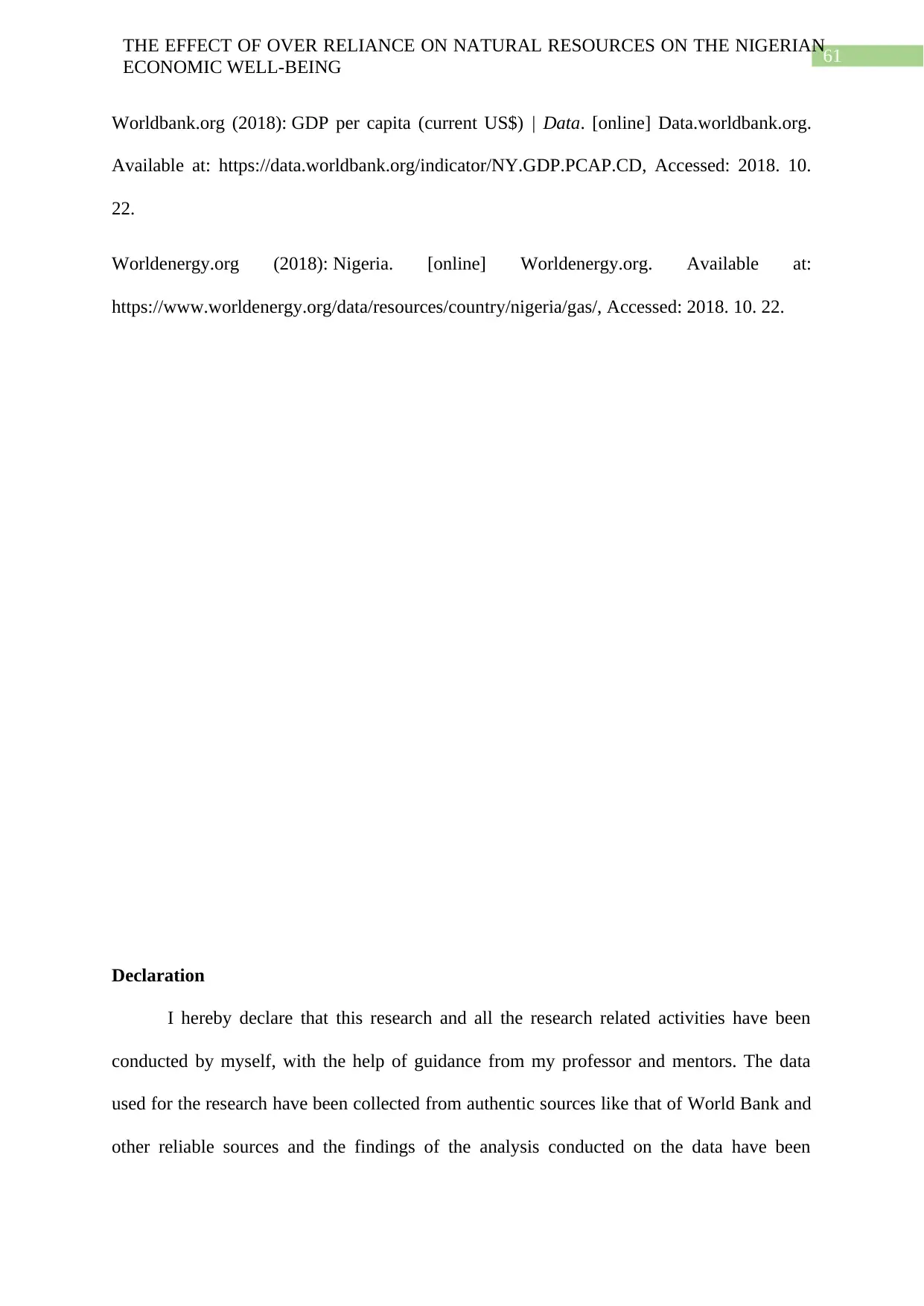
61
THE EFFECT OF OVER RELIANCE ON NATURAL RESOURCES ON THE NIGERIAN
ECONOMIC WELL-BEING
Worldbank.org (2018): GDP per capita (current US$) | Data. [online] Data.worldbank.org.
Available at: https://data.worldbank.org/indicator/NY.GDP.PCAP.CD, Accessed: 2018. 10.
22.
Worldenergy.org (2018): Nigeria. [online] Worldenergy.org. Available at:
https://www.worldenergy.org/data/resources/country/nigeria/gas/, Accessed: 2018. 10. 22.
Declaration
I hereby declare that this research and all the research related activities have been
conducted by myself, with the help of guidance from my professor and mentors. The data
used for the research have been collected from authentic sources like that of World Bank and
other reliable sources and the findings of the analysis conducted on the data have been
THE EFFECT OF OVER RELIANCE ON NATURAL RESOURCES ON THE NIGERIAN
ECONOMIC WELL-BEING
Worldbank.org (2018): GDP per capita (current US$) | Data. [online] Data.worldbank.org.
Available at: https://data.worldbank.org/indicator/NY.GDP.PCAP.CD, Accessed: 2018. 10.
22.
Worldenergy.org (2018): Nigeria. [online] Worldenergy.org. Available at:
https://www.worldenergy.org/data/resources/country/nigeria/gas/, Accessed: 2018. 10. 22.
Declaration
I hereby declare that this research and all the research related activities have been
conducted by myself, with the help of guidance from my professor and mentors. The data
used for the research have been collected from authentic sources like that of World Bank and
other reliable sources and the findings of the analysis conducted on the data have been

62
THE EFFECT OF OVER RELIANCE ON NATURAL RESOURCES ON THE NIGERIAN
ECONOMIC WELL-BEING
unbiasedly interpreted and discussed about without any kind of intentional or unintentional
manipulation of the data or bias on my part.
THE EFFECT OF OVER RELIANCE ON NATURAL RESOURCES ON THE NIGERIAN
ECONOMIC WELL-BEING
unbiasedly interpreted and discussed about without any kind of intentional or unintentional
manipulation of the data or bias on my part.
1 out of 63
Related Documents
Your All-in-One AI-Powered Toolkit for Academic Success.
+13062052269
info@desklib.com
Available 24*7 on WhatsApp / Email
![[object Object]](/_next/static/media/star-bottom.7253800d.svg)
Unlock your academic potential
© 2024 | Zucol Services PVT LTD | All rights reserved.





